Last updated on April 26, 2024
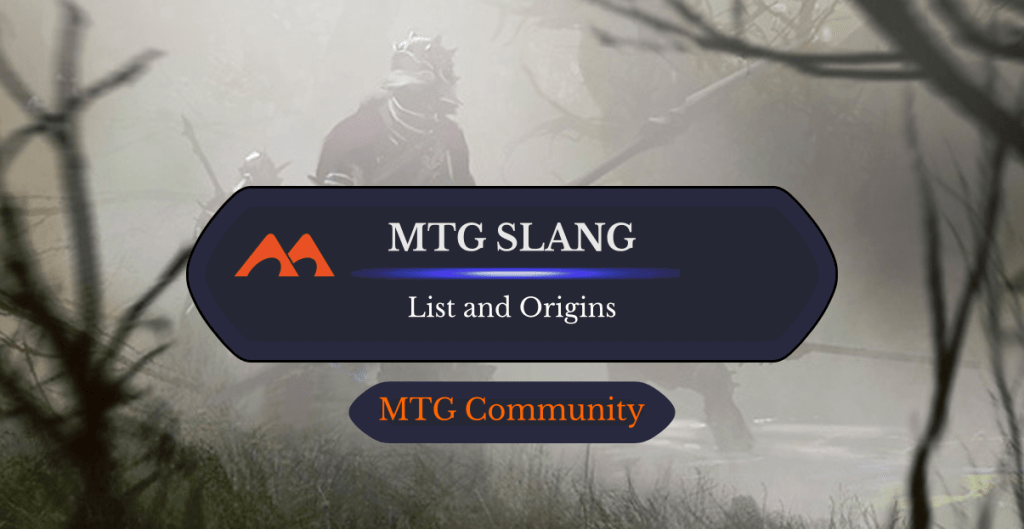
Fog | Illustration by Jaime Jones
You ever crack a fetch at EOT to tutor up some fixing? Maybe you’ve tried to Bolt the Bird but your opponent had Mom to fizzle it? Or maybe you lost to a Vorthos player at your most recent FNM. Any of that click at all?
Magic has 30 years of slang to pull from, and judging by my girlfriend’s listless gaze as I speak to her in familiar Magic jargon and euphemisms, it’s not all immediately intelligible to the average person. Let’s clear that up, with the most comprehensive list of Magic slang we could come up with.
We’re going to miss some for sure, but it’d be Magical Christmas Land to think we’d get everything.
Slang Based on Card Names
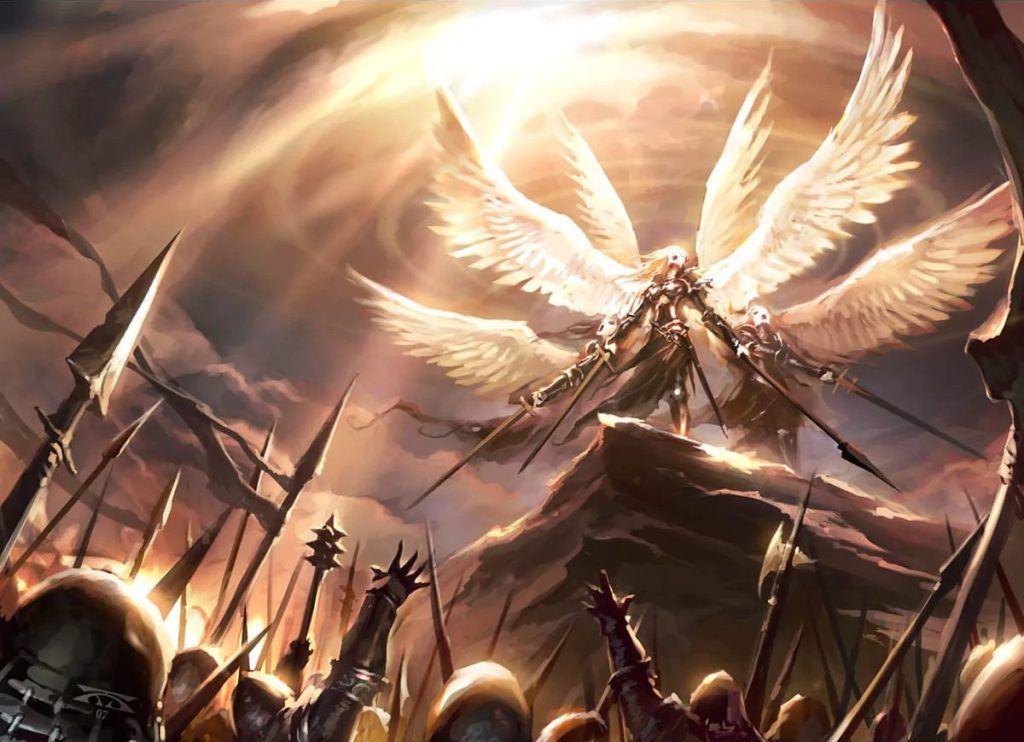
Glorious Anthem | Illustration by Raymond Swanland
Animate
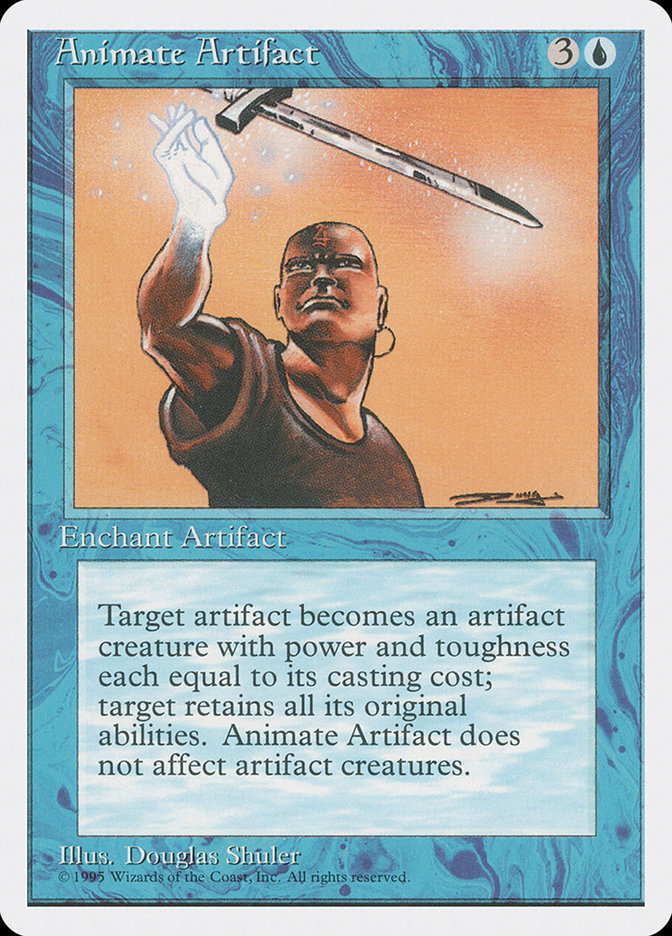
Turn a non-creature into a creature.
Origin: Animate Artifact.
Anthem
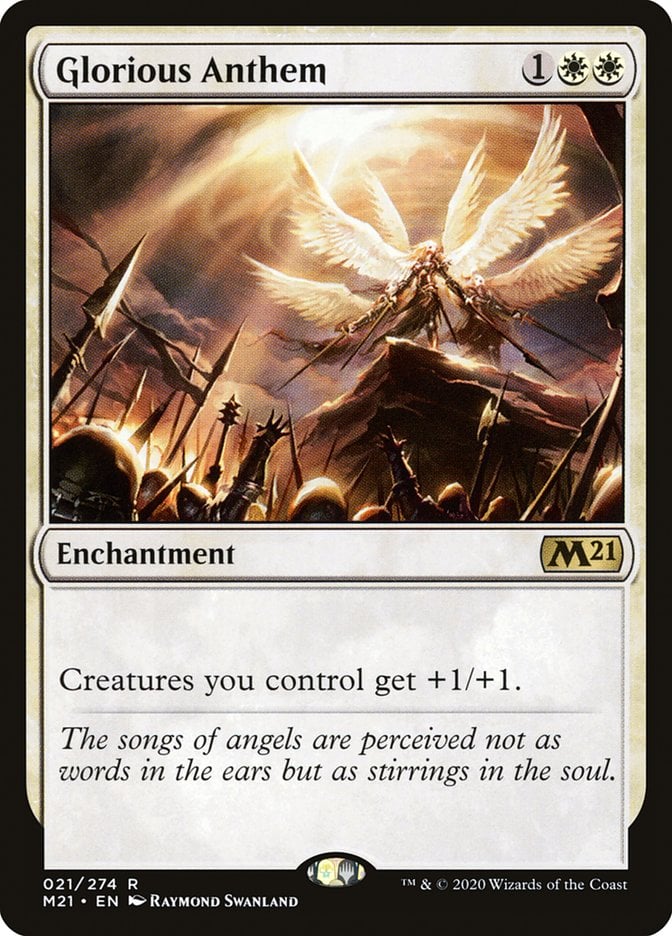
A permanent that increases your creatures’ power and/or toughness.
Origin: Glorious Anthem.
Baneslayer
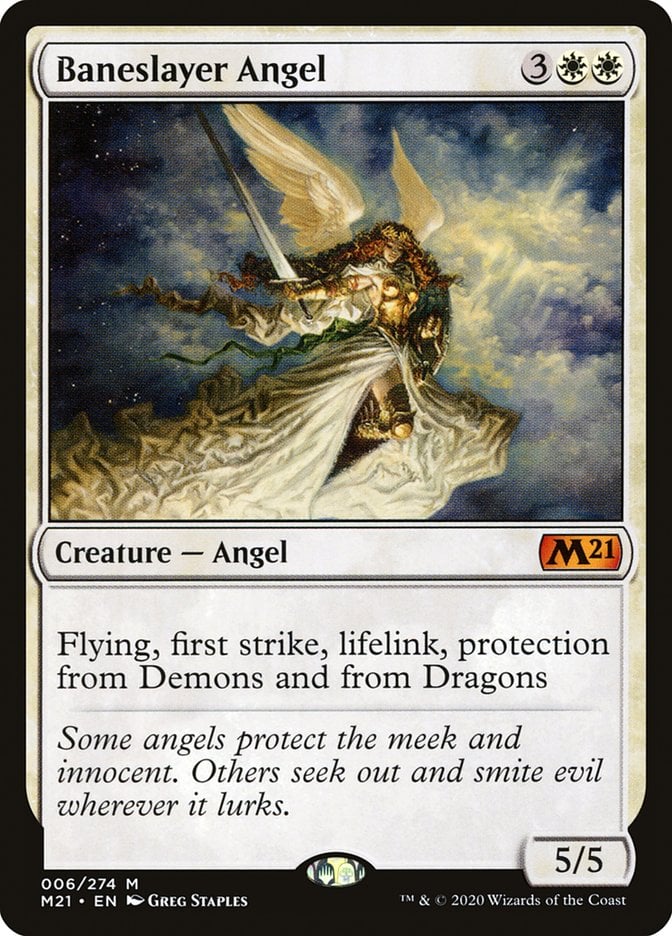
A creature with above-rate stats and good combat abilities, but little else. Also known as “battlecruisers.”
Origin: Baneslayer Angel.
Bite Spell
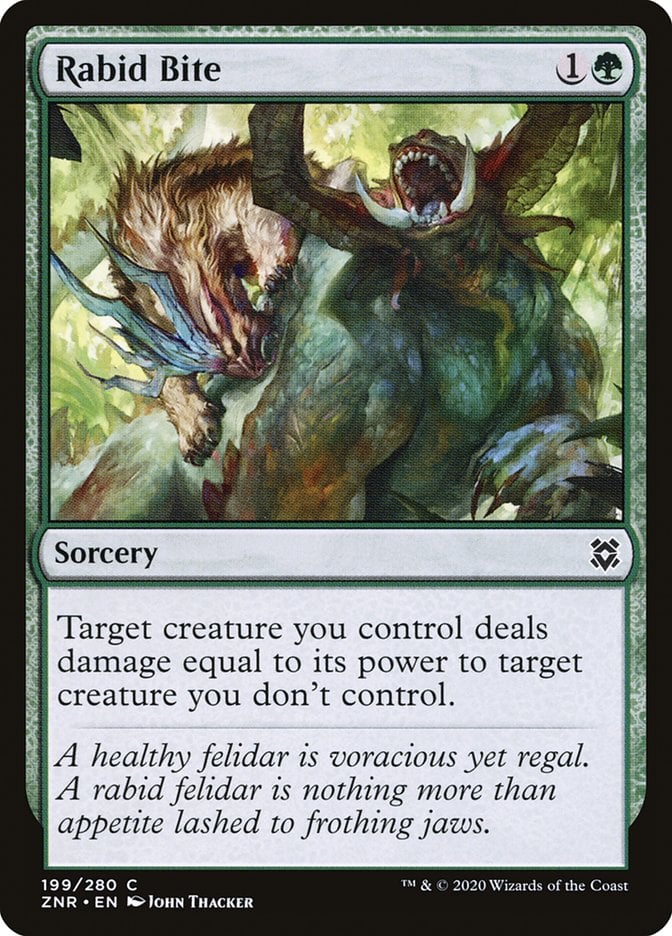
A variation of a fight spell where only one creature deals damage to the other.
Origin: Rabid Bite.
Blink
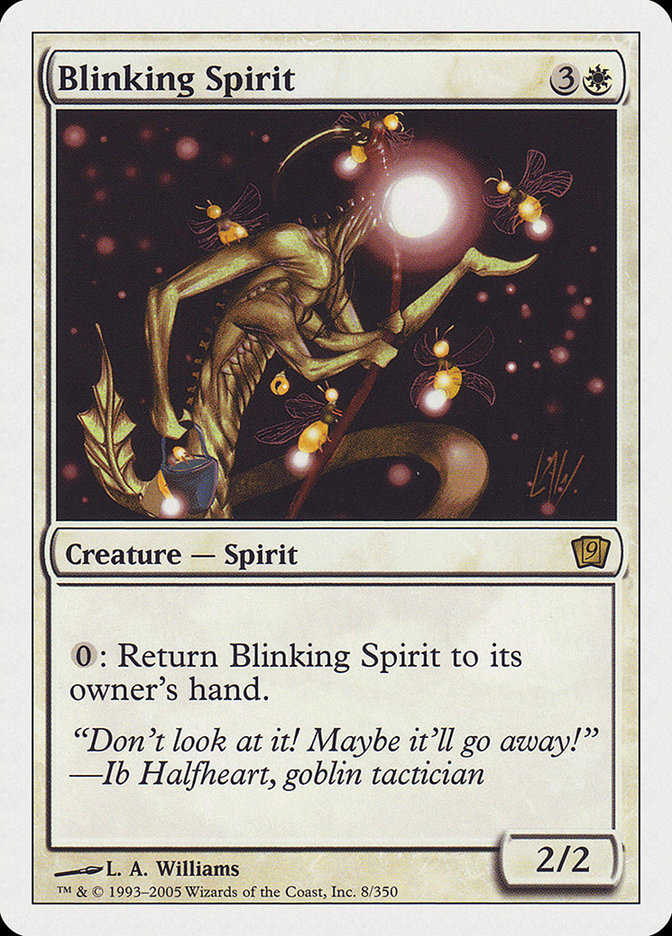
Exile a permanent and return it to the battlefield.
Origin: Blinking Spirit, and used interchangeably with “flicker.”
Blood Artist
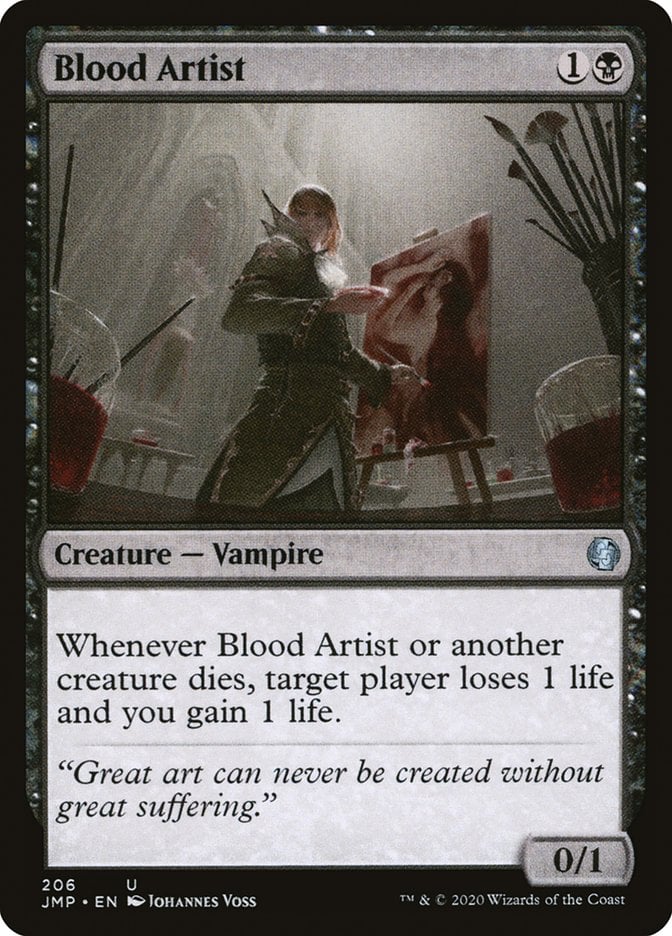
An effect that causes opponents to lose life when a creature dies.
Origin: Blood Artist.
Bogle
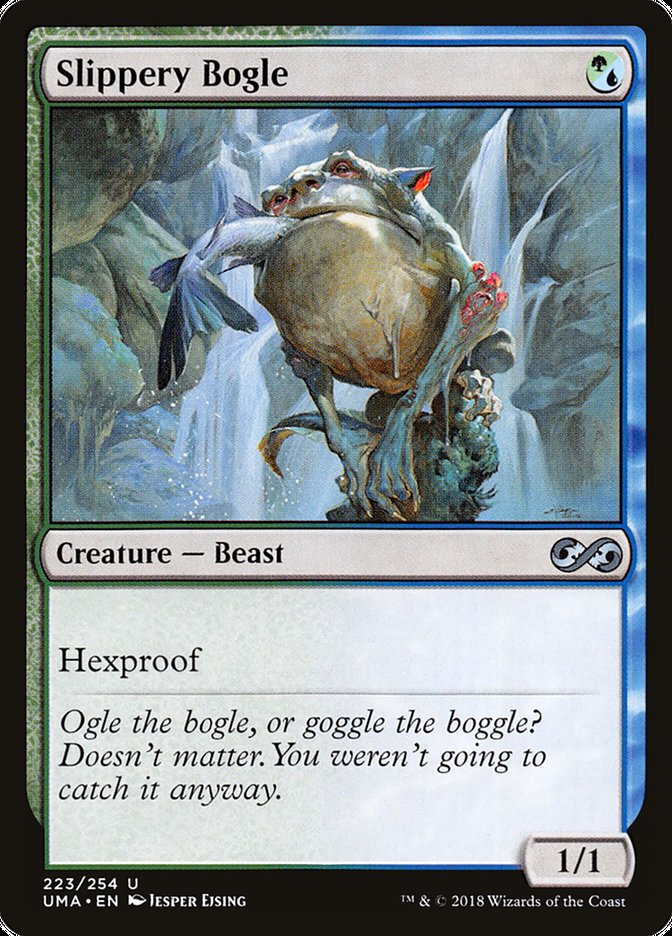
A 1-drop or 2-drop creature with hexproof.
Origin: Slippery Bogle.
Bounce
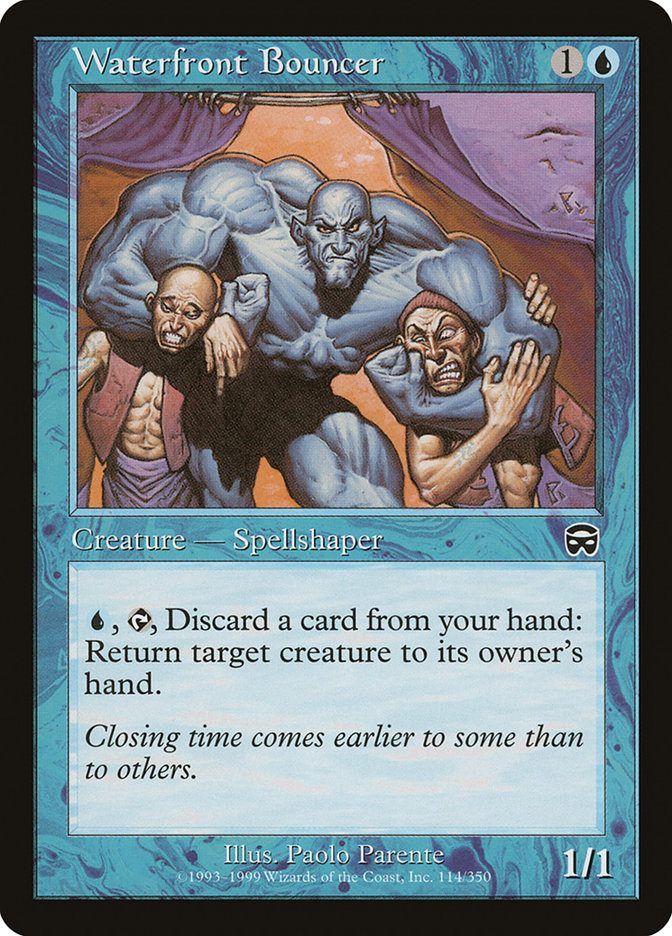
Return a permanent to its owner’s hand from the battlefield.
Origin: maybe Waterfront Bouncer.
Clone
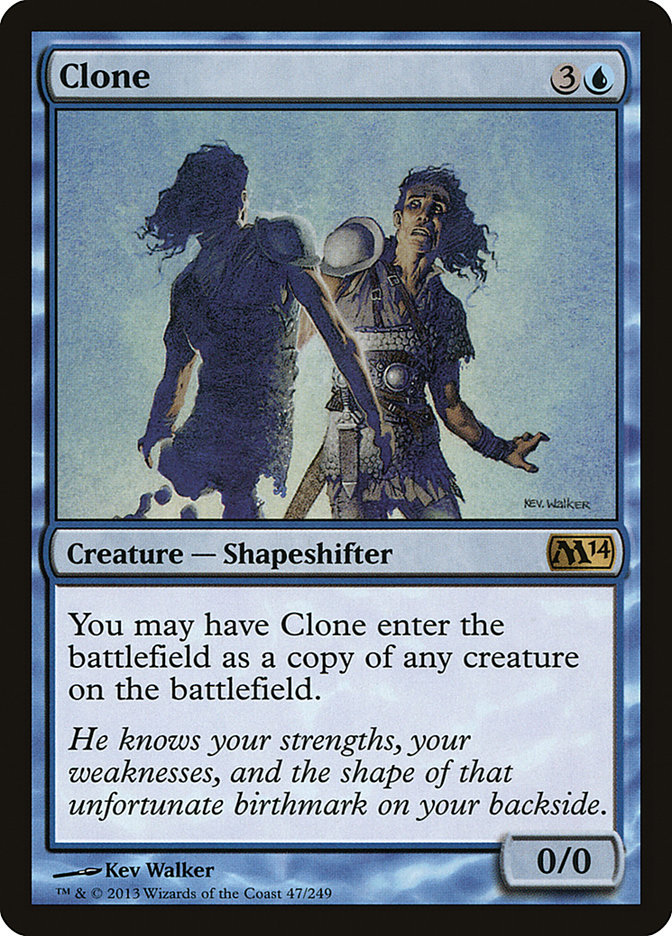
A creature that copies another creature or a token that enters as a copy.
Origin: Clone.
Disenchant
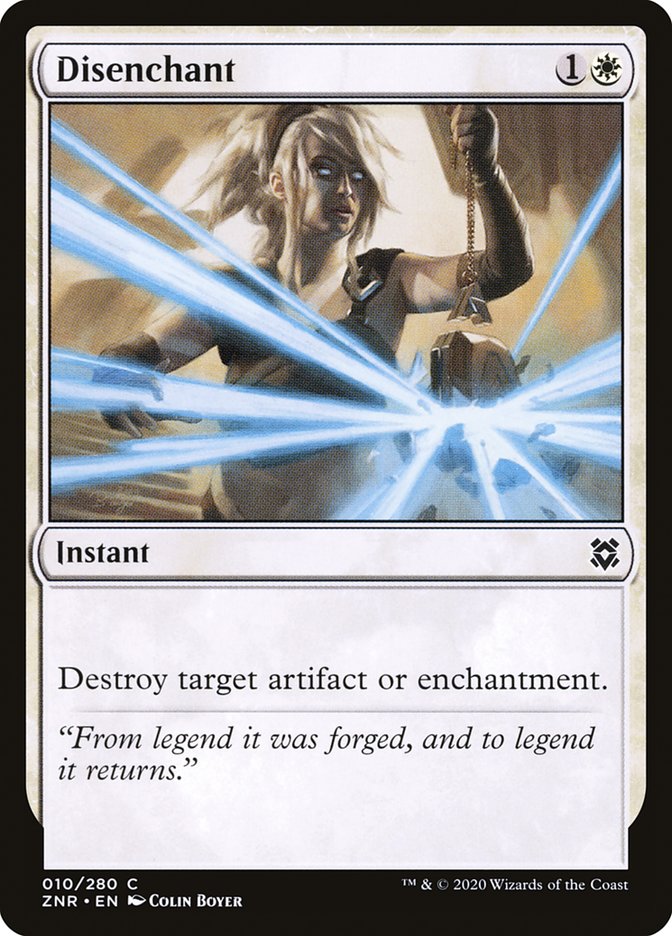
An effect that destroys an artifact or enchantment.
Origin: Disenchant.
Divination
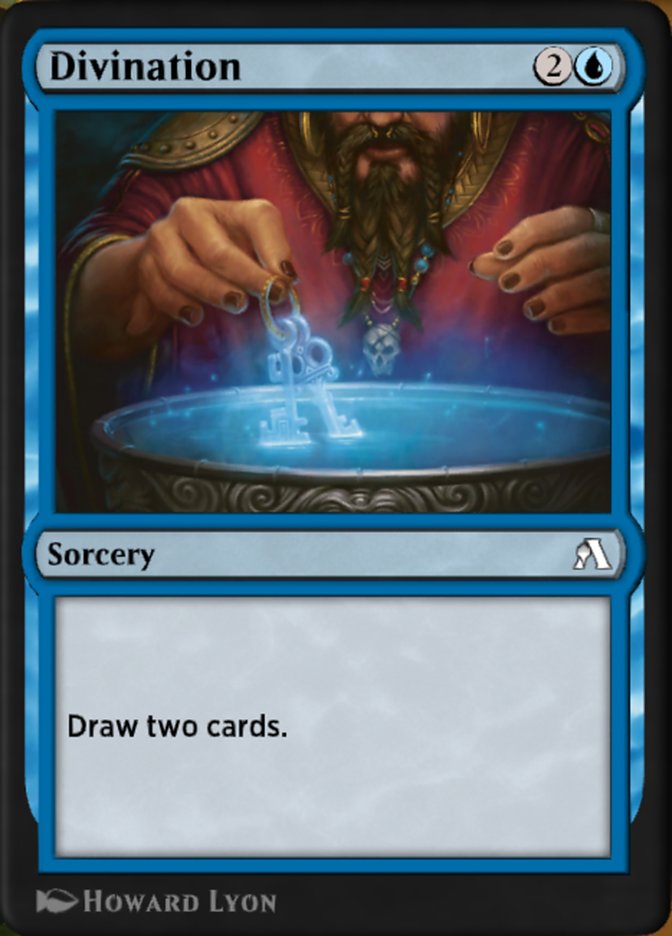
An effect that draws two cards.
Origin: Divination.
Doom Blade
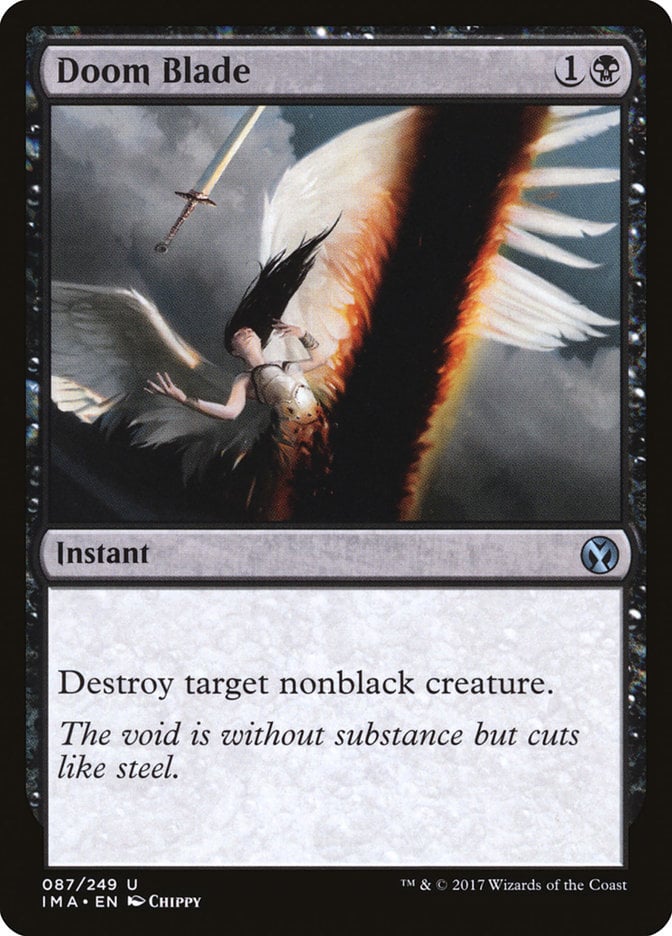
A cheap, single-target removal spell, usually with little to no restrictions.
Origin: Doom Blade.
Edict
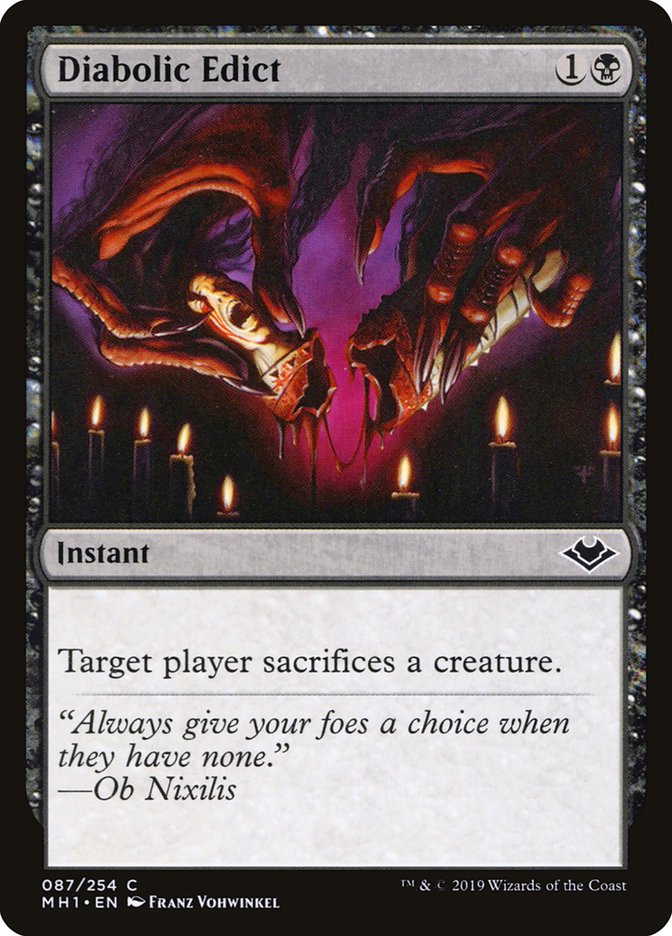
An effect that forces an opponent to sacrifice a creature.
Origin: Diabolic Edict.
Enchantress
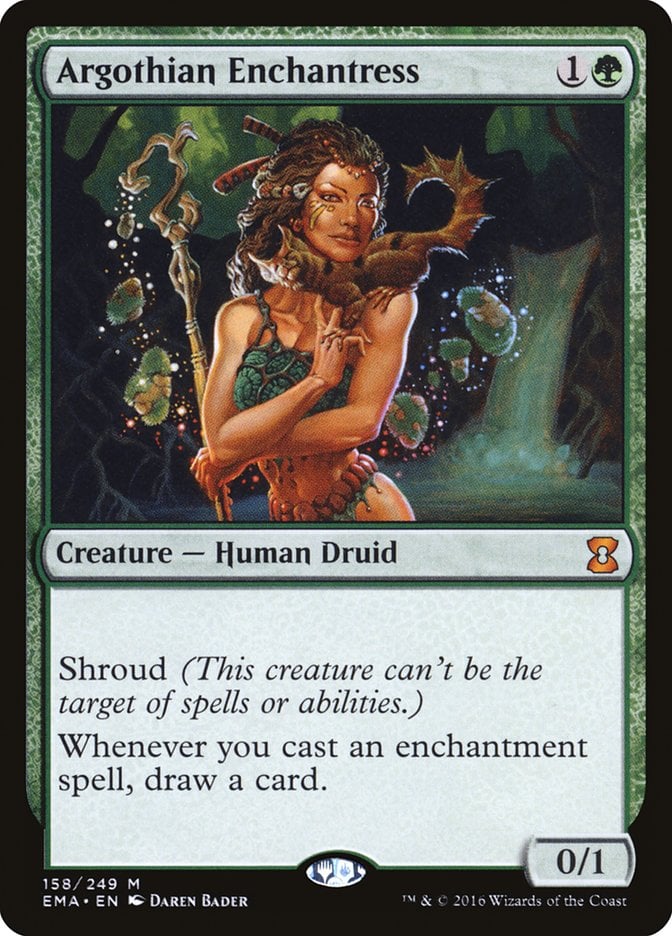
A creature that draws cards as you play enchantments.
Origin: Argothian Enchantress.
Fireball
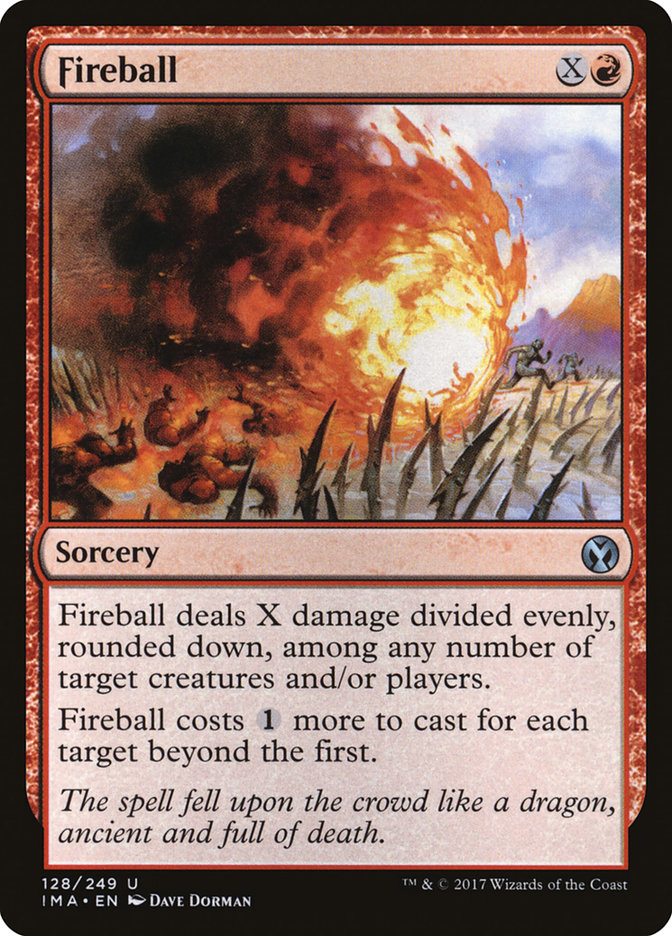
An X-spell that deals more damage the more mana spent on it.
Origin: Fireball.
Firebreathing
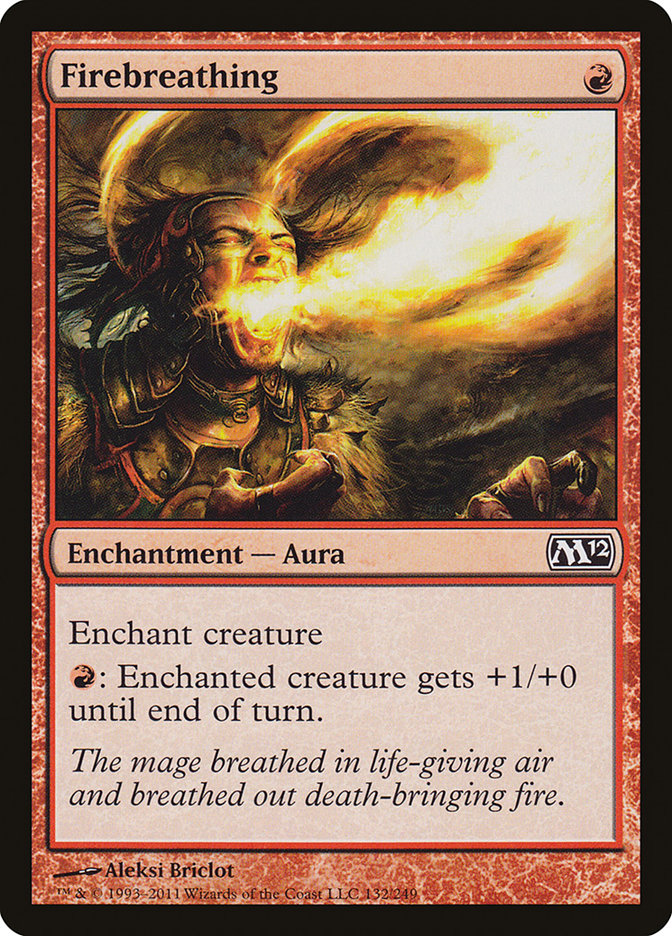
An activated ability that lets you pay red mana to pump a creature’s power. Distinct from the black pump ability on black creatures like Dread Shade.
Origin: Firebreathing.
Flametongue Kavu
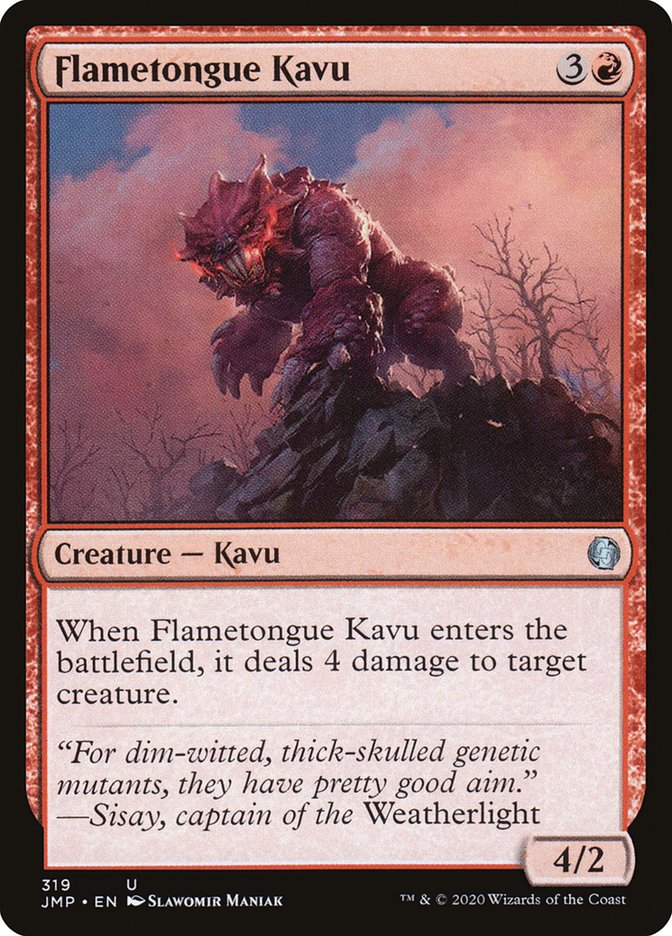
A creature with an ETB that deals damage to another creature, usually killing it.
Origin: Flametongue Kavu.
Falter
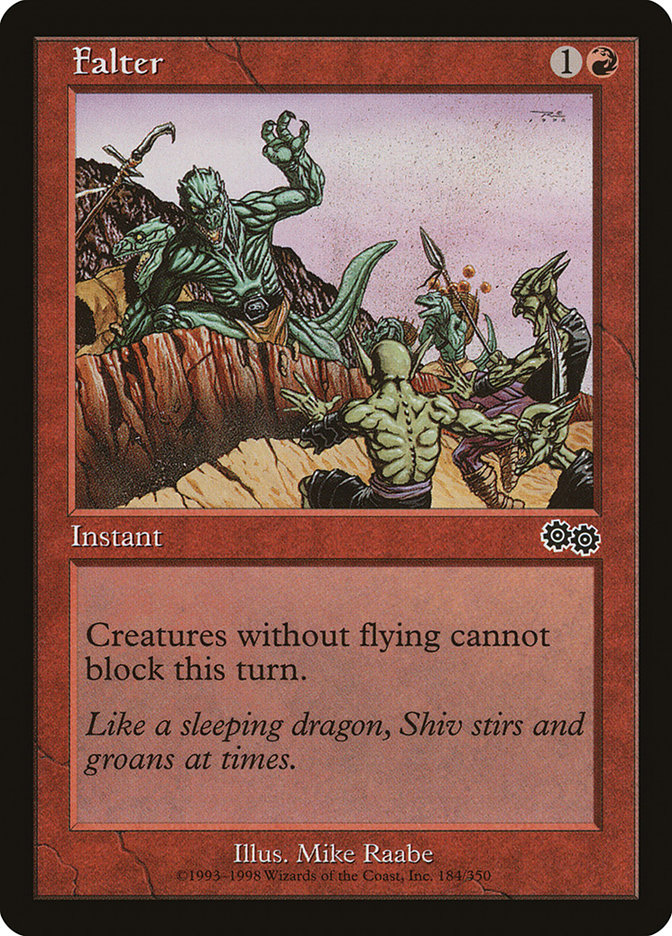
An effect that prevents creatures from blocking.
Origin: Falter.
Flicker
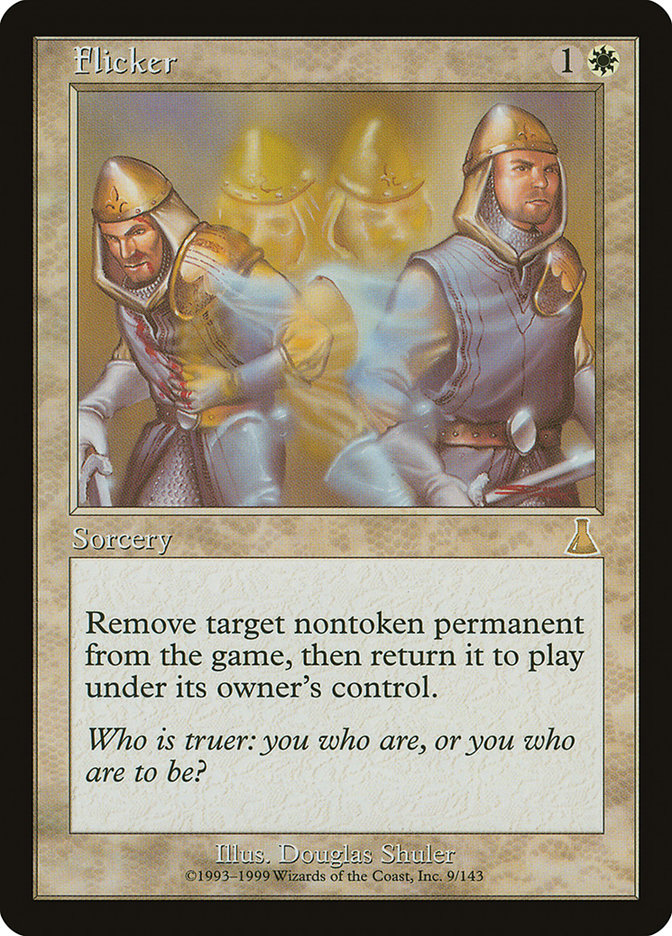
Exile a permanent then return it to the battlefield. Used interchangeably with “blink.”
Origin: Flicker.
Fog
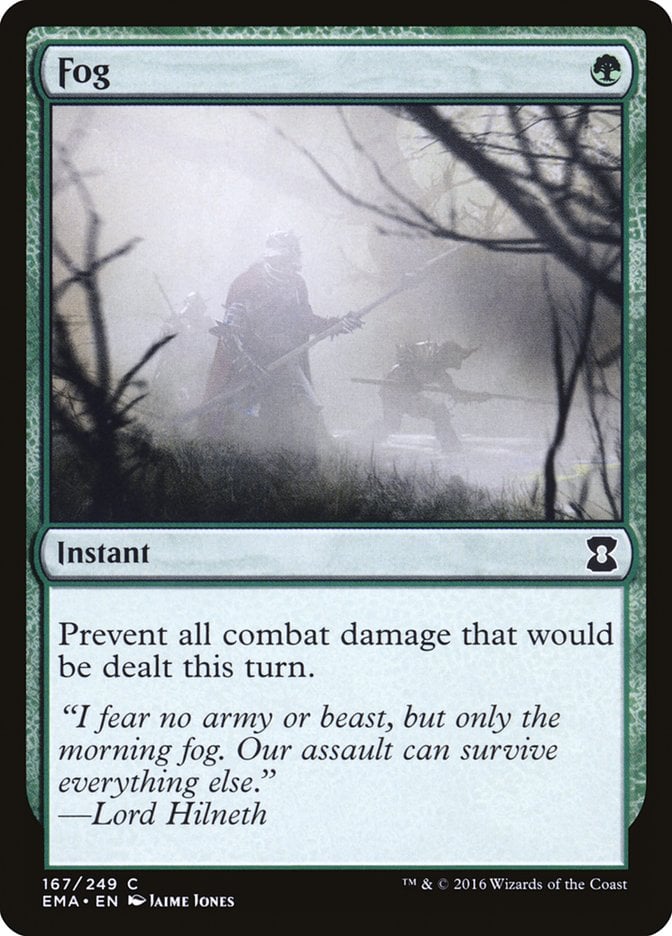
An effect that prevents combat damage.
Origin: Fog.
Force Spike
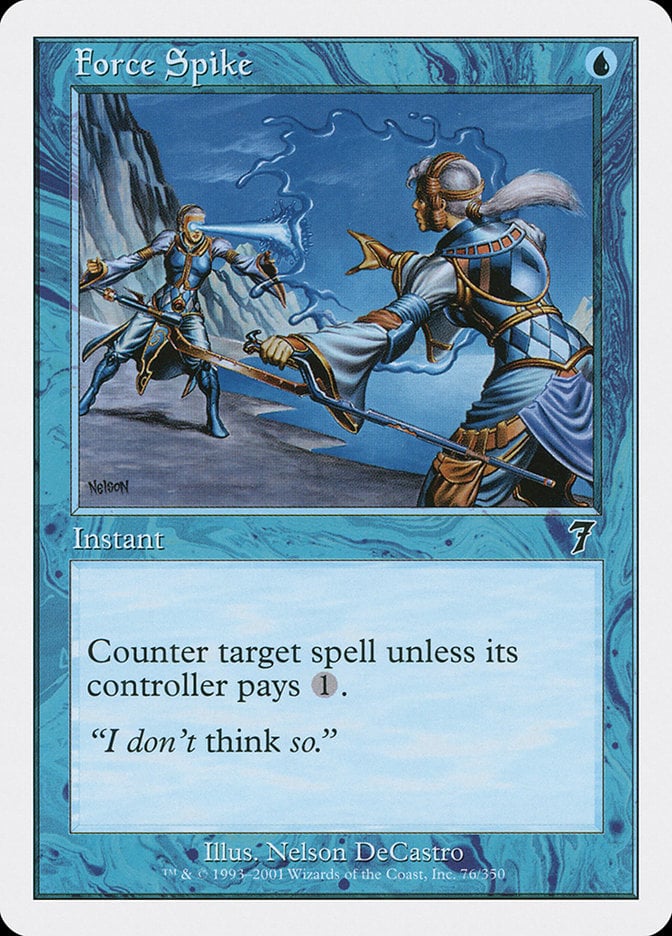
An effect that counters a spell unless its controller pays .
Origin: Force Spike.
Gravedigger
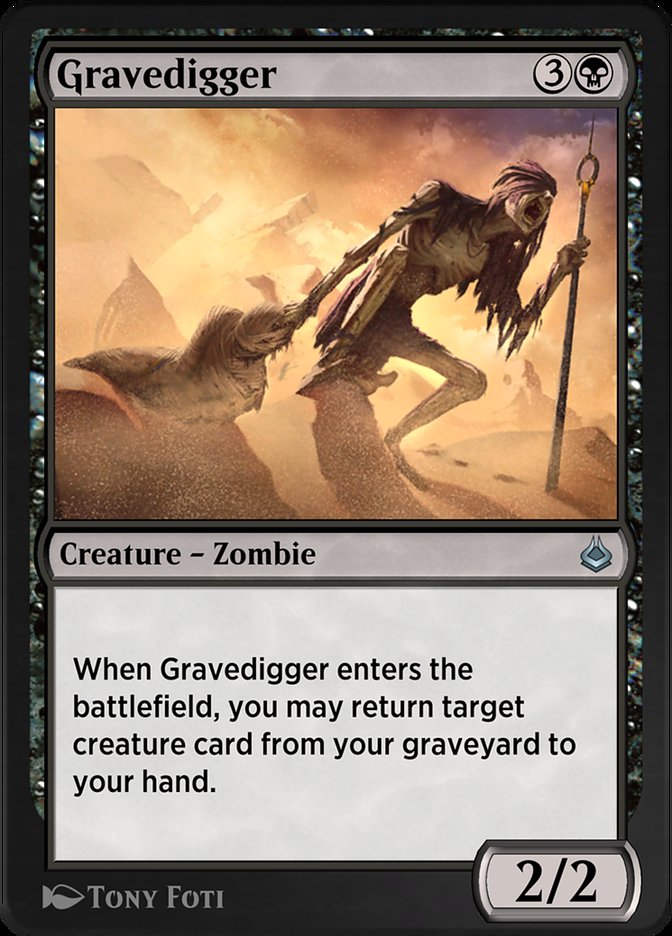
A creature with an ETB ability that returns a creature from your graveyard to your hand is a gravedigger.
Origin: Gravedigger.
Howling Mine
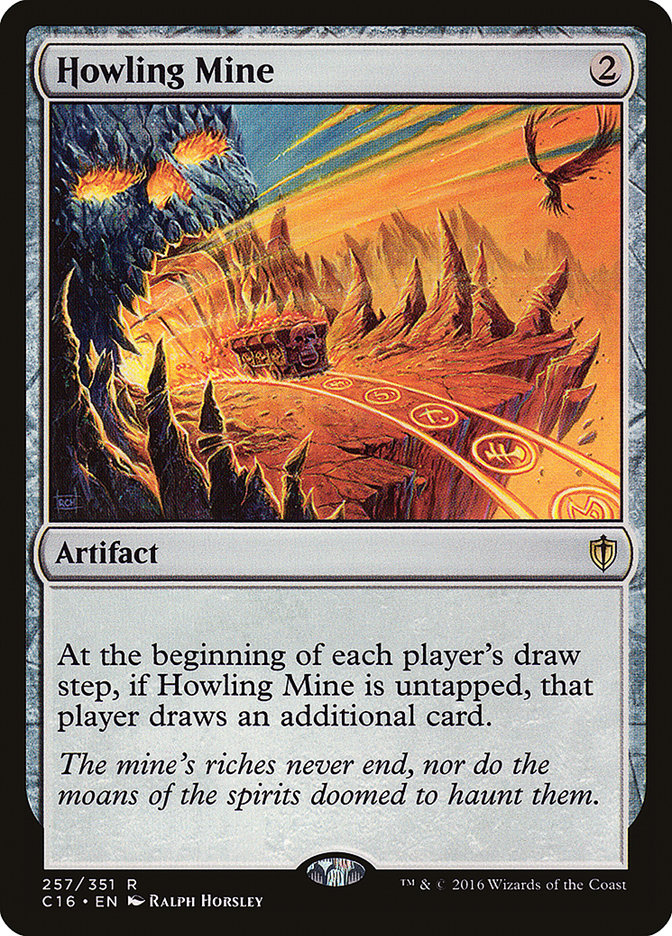
An effect that draws every player an extra card each turn. If it only affects you it’s “your own personal Howling Mine.”
Origin: Howling Mine.
Impulse Draw
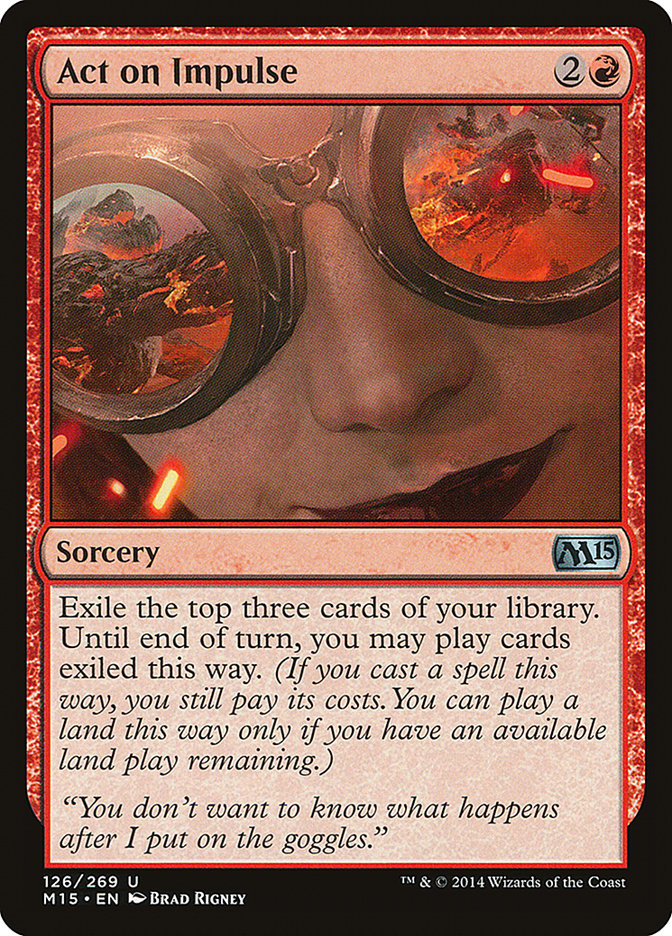
Exile a card from the top of your library, with a limited timeframe to play it. Red’s primary form of card advantage.
Origin: Act on Impulse.
Infest
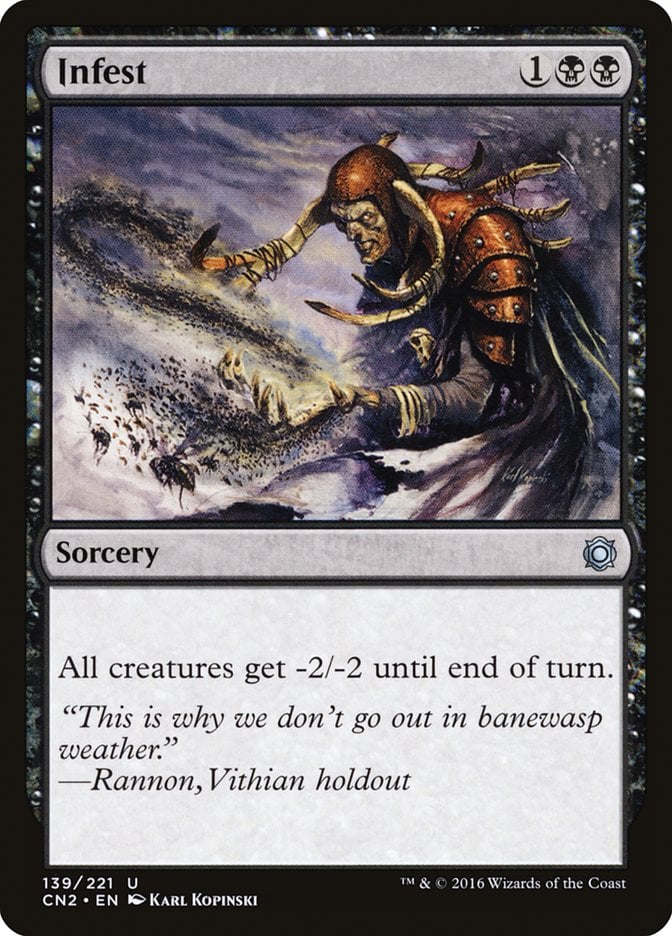
A black spell that gives creatures -2/-2.
Origin Infest.
Lava Axe
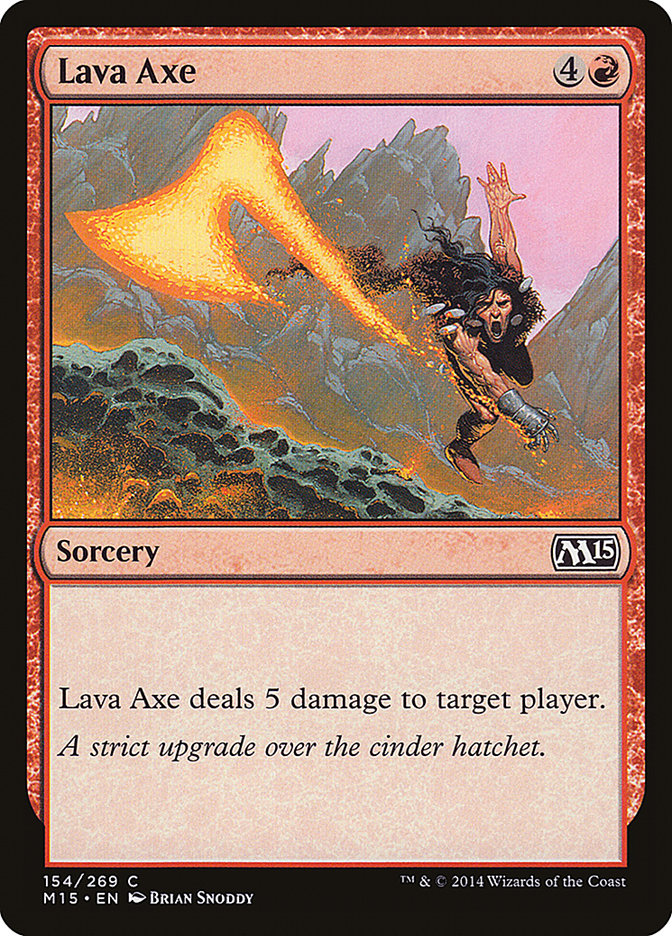
A burn spell that deals a large amount of damage to a player.
Origin: Lava Axe.
Loot
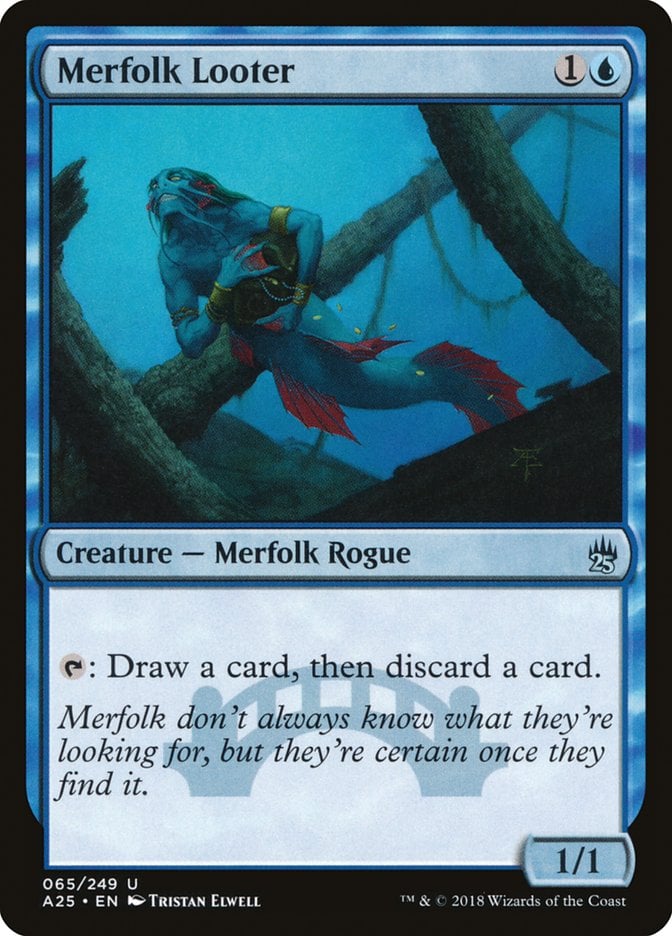
Draw a card, then discard a card.
Origin: Merfolk Looter.
Lord
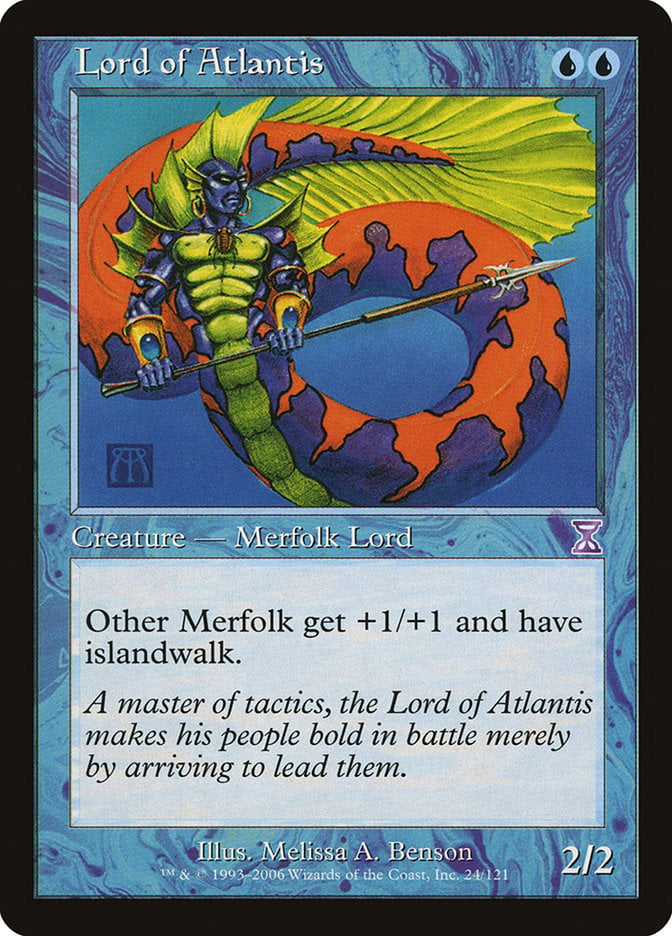
A creature that buffs a specific creature type.
Origin: The obsolete “lord” creature type and original lords like Lord of Atlantis.
Lure
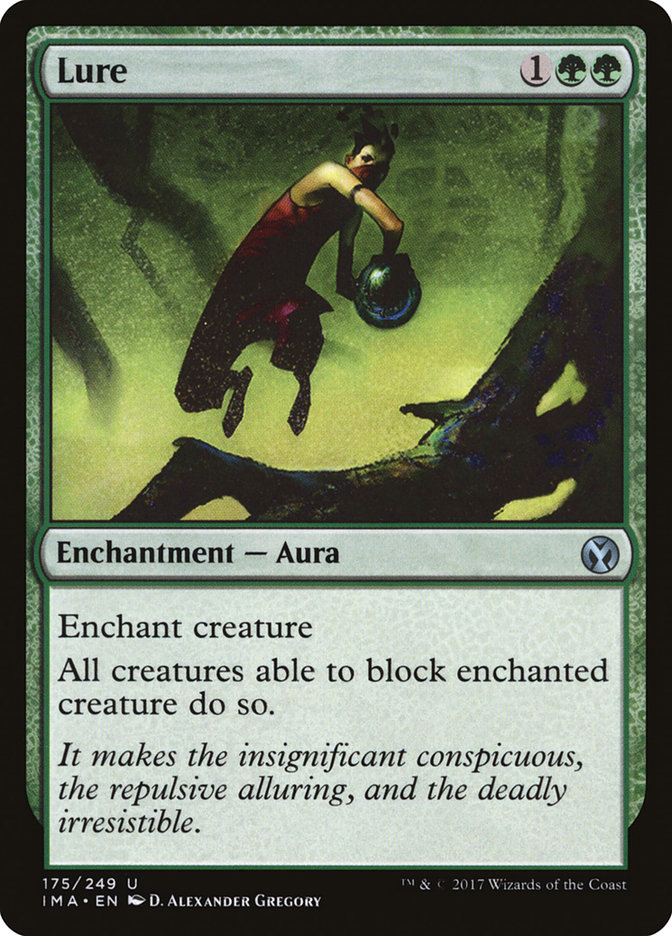
An effect that forces a creature to block.
Origin: Lure.
Mill
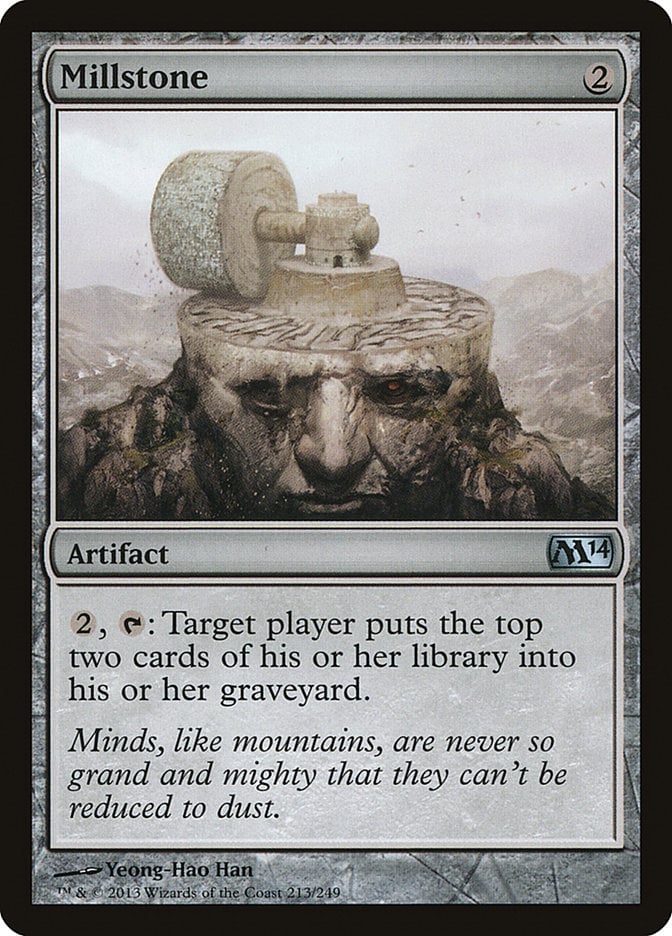
Put cards from the top of a player’s library into their graveyard. Adopted as an official Magic term in Core Set 2021.
Origin: Millstone.
Mind Control
An effect that takes permanent control of an opponent’s permanent. Also called a Control Magic.
Origin: Mind Control.
Mind Rot
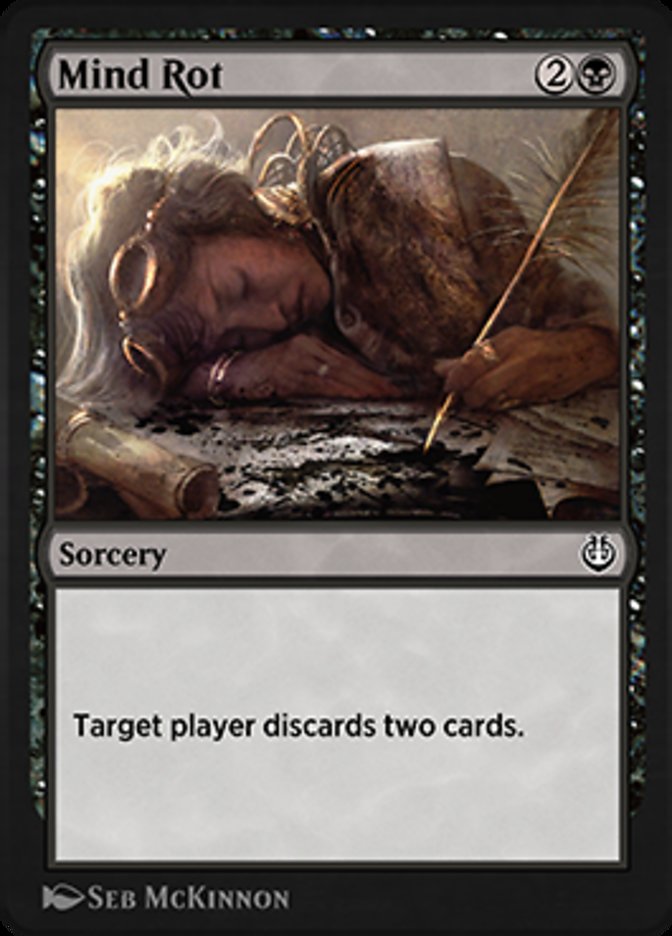
An effect that makes a player discard two cards.
Origin: Mind Rot.
Mindslaver
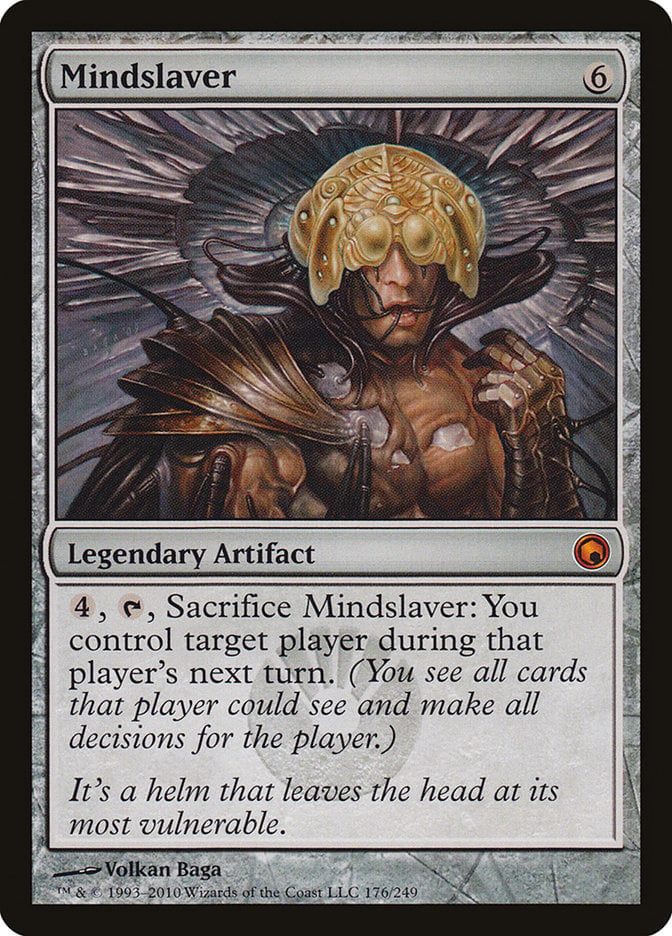
An effect that allows you to control another player during their turn.
Origin: Mindslaver.
Mulldrifter
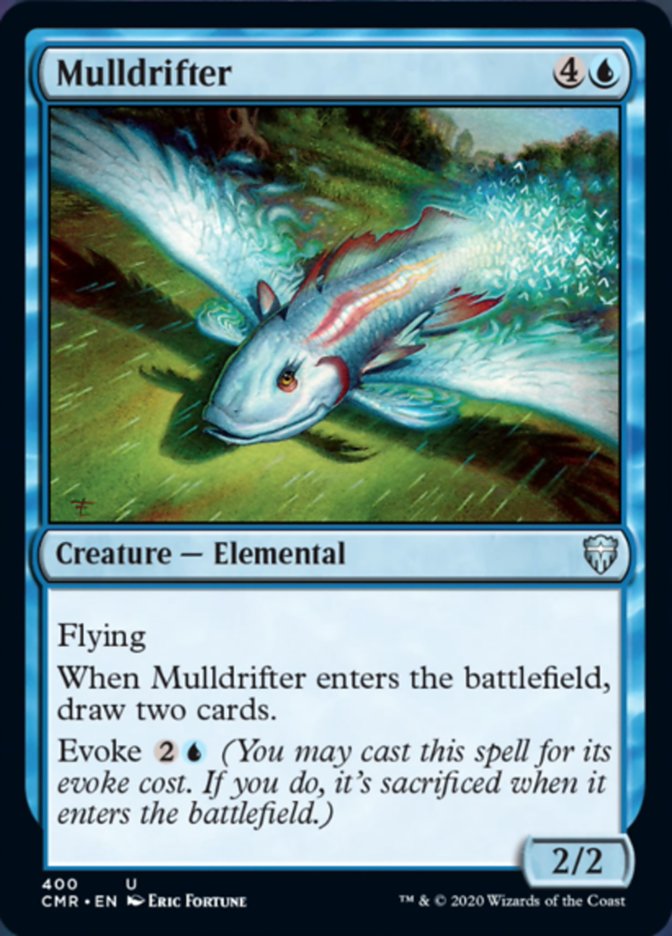
A creature whose value comes from its ETB ability, not its usefulness in combat. The opposite of a “baneslayer.”
Origin: Mulldrifter.
Naturalize
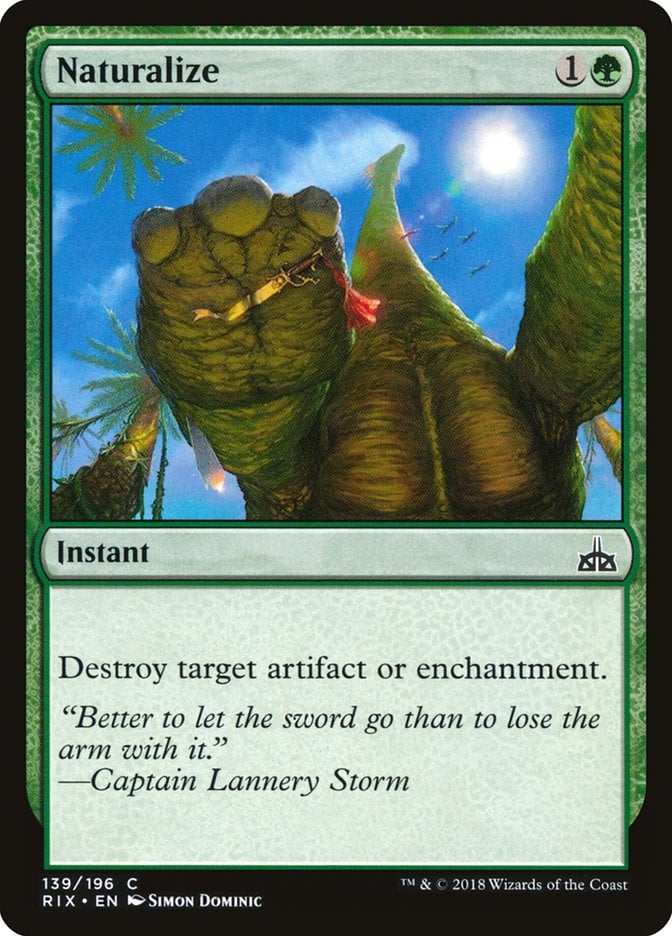
Destroy an artifact or enchantment.
Origin: Naturalize.
O-Ring
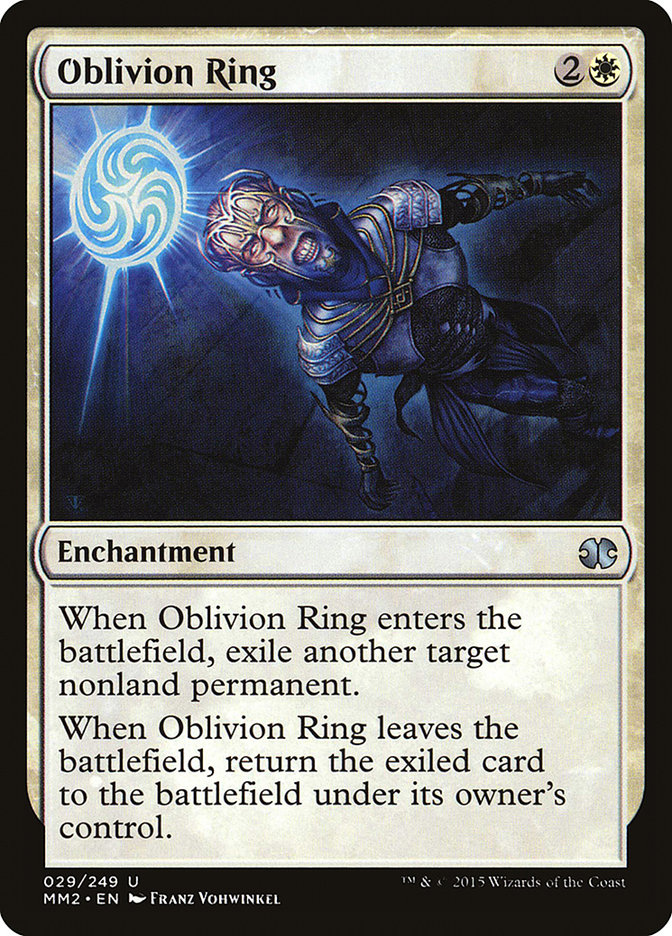
A permanent that exiles another permanent until it leaves the battlefield.
Origin: Oblivion Ring.
Overrun
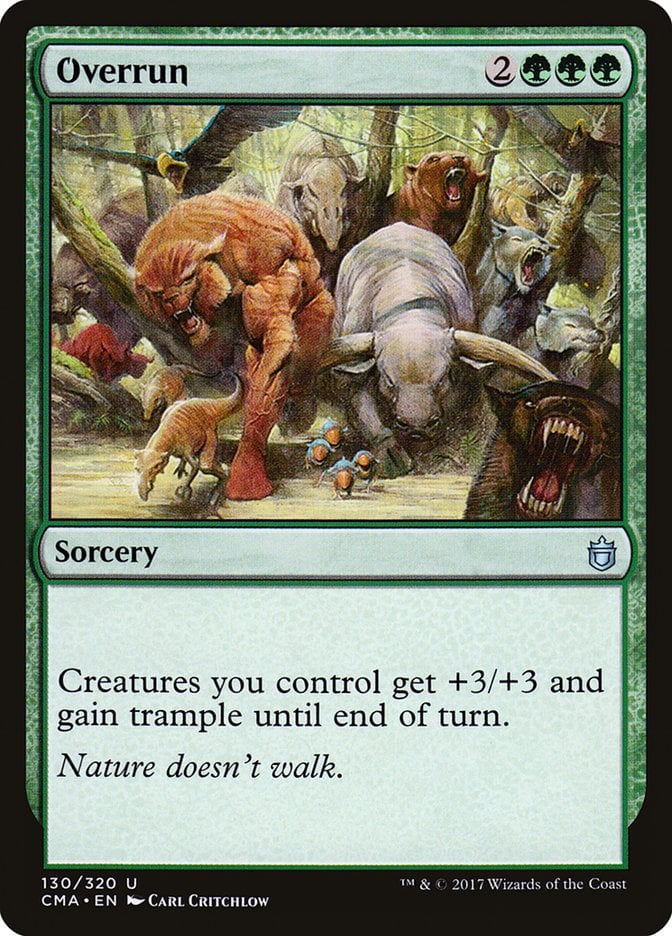
An effect that temporarily grants your creatures a large power/toughness boost.
Origin: Overrun.
Plague Wind
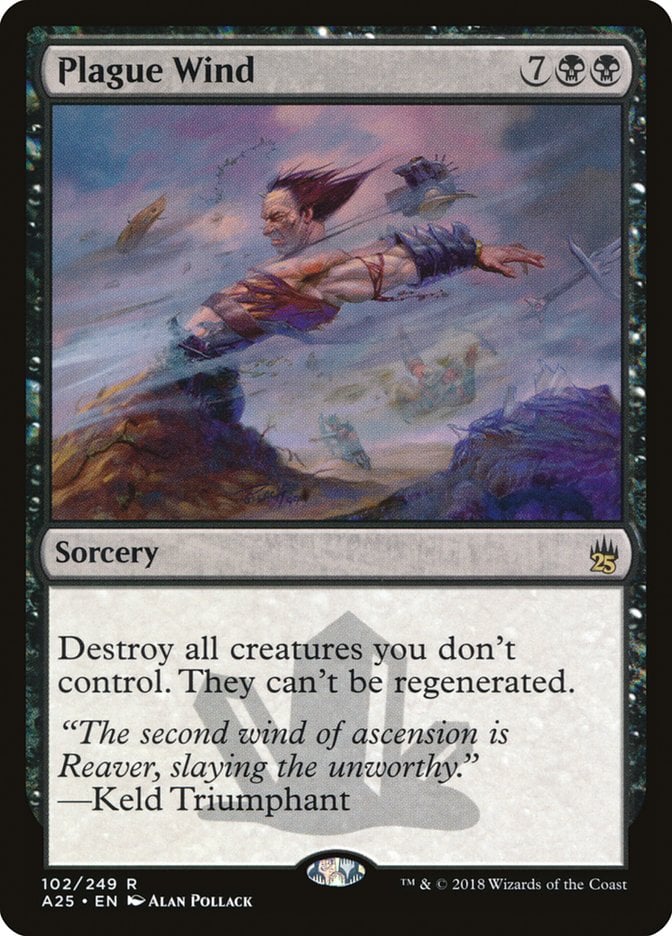
A one-sided board wipe.
Origin: Plague Wind.
Ragavan
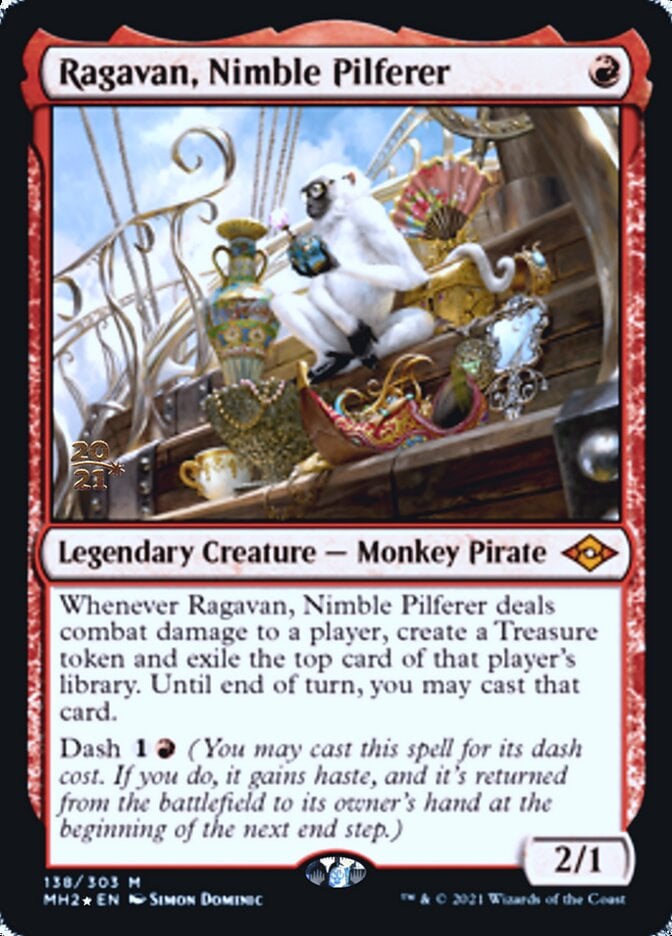
A 1-mana creature capable of winning the game on its own if left unchecked.
Origin: Ragavan, Nimble Pilferer.
Raise Dead
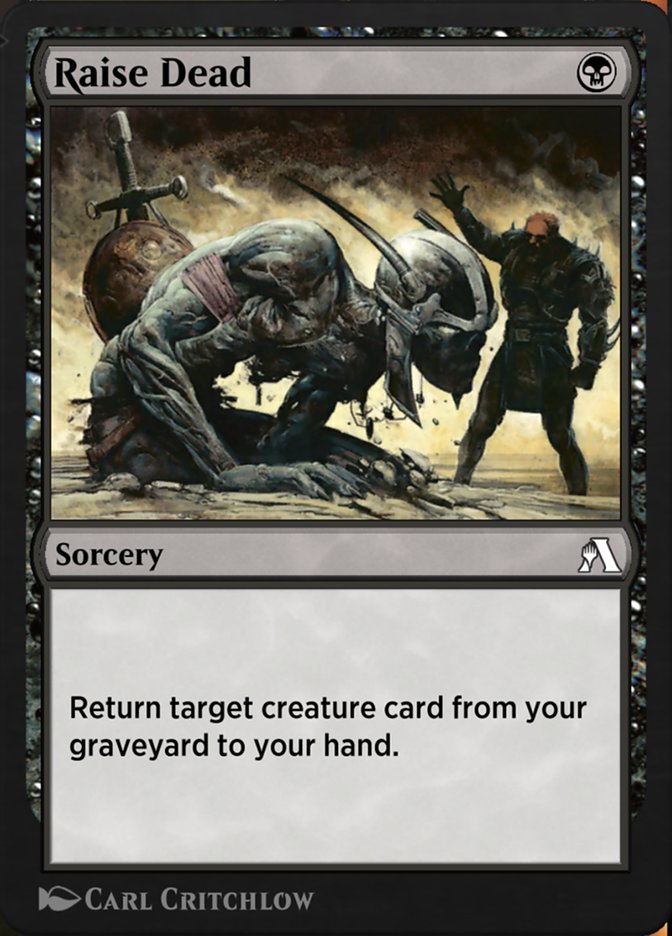
An effect that returns a creature from your graveyard to your hand.
Origin: Raise Dead.
Ramping
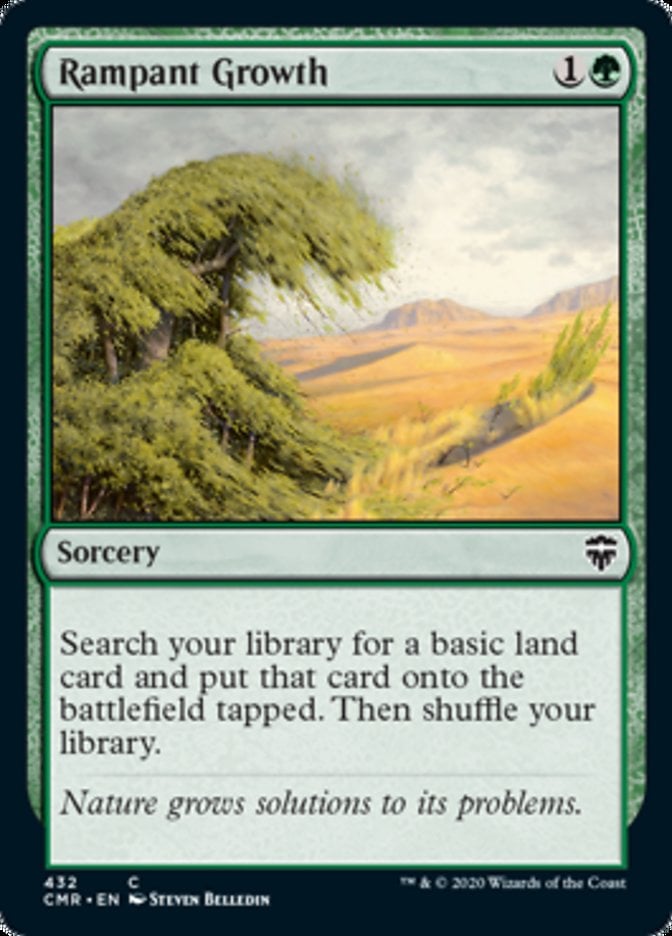
Getting extra lands or mana sources beyond your one-land-per-turn limit.
Origin: Possibly Rampant Growth.
Reanimate
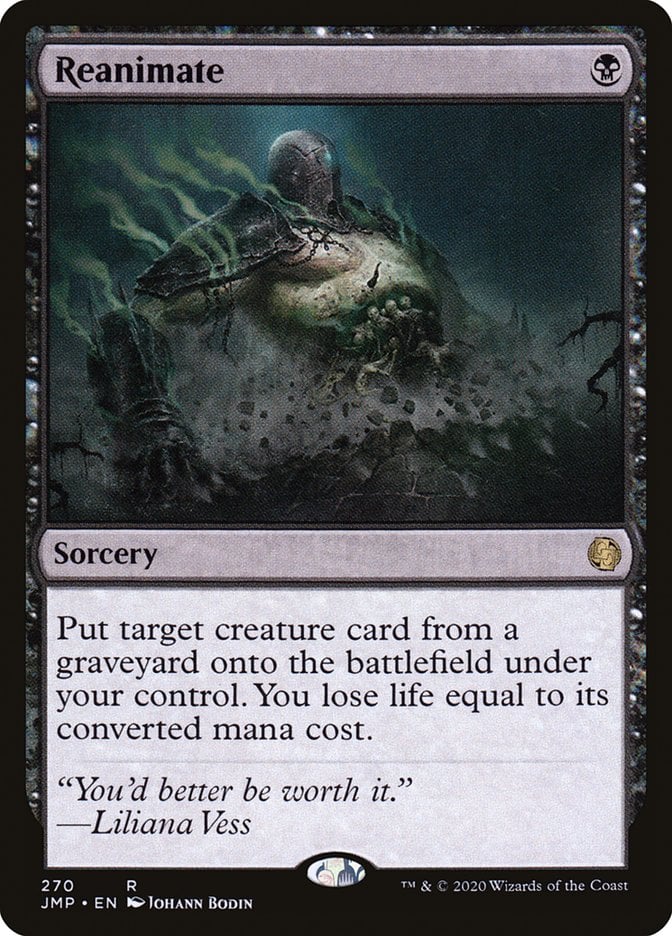
Return a creature from the graveyard to the battlefield.
Origin: Reanimate.
Regrowth
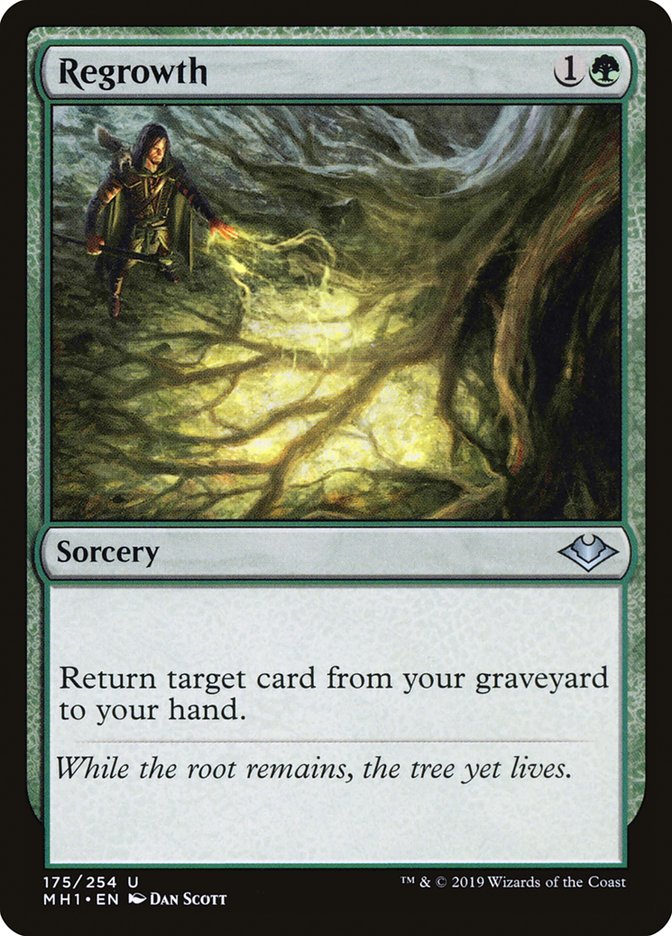
Return a permanent from your graveyard to your hand. Less specific than a Raise Dead.
Origin: Regrowth.
Ritual
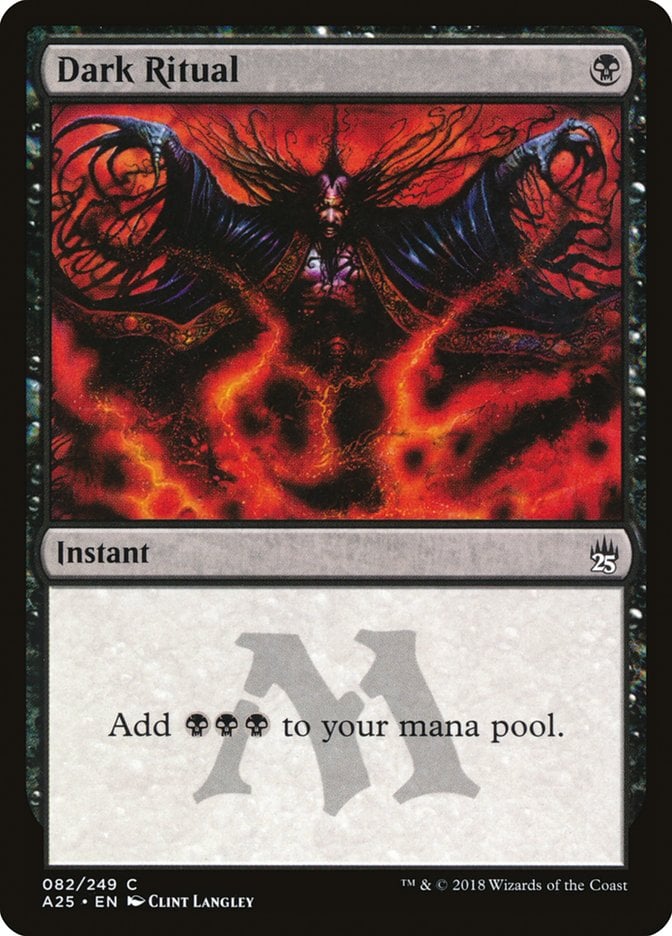
An effect that produces a net positive amount of mana.
Origin: Dark Ritual.
Rummage
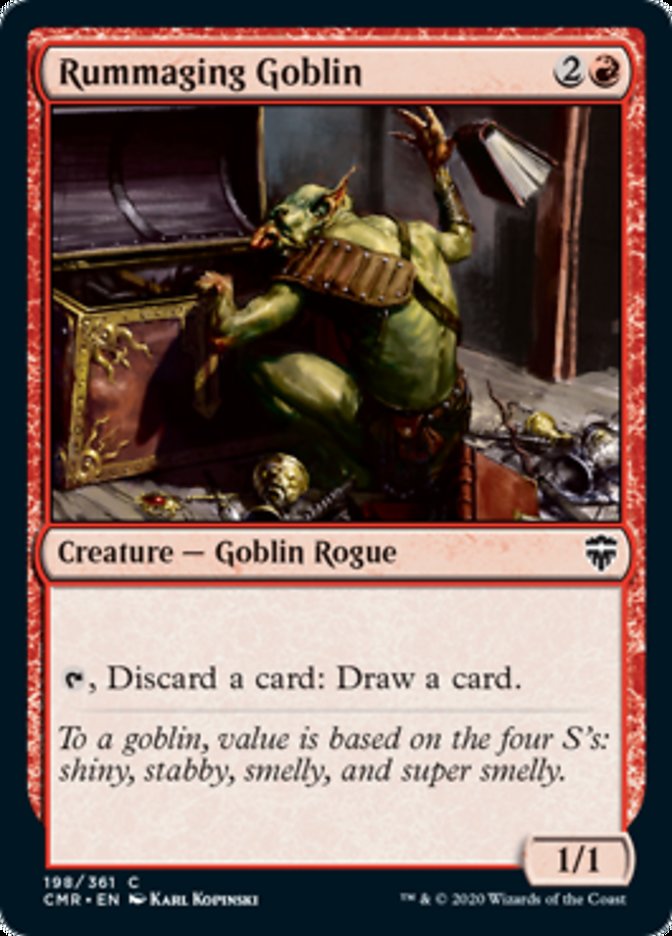
Discard a card, then draw a card. The opposite of looting.
Origin: Rummaging Goblin.
Shatter
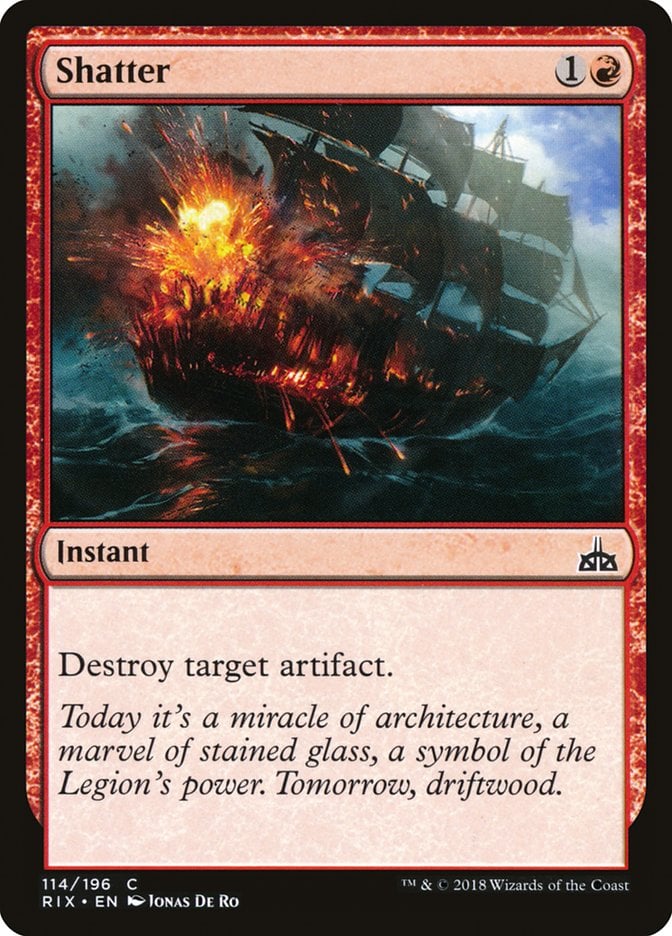
Destroy an artifact.
Origin: Shatter.
Slith
A creature that gets a +1/+1 counter when it deals combat damage.
Origin: The “Slith” cycle from Mirrodin.
Splinter Twin Situation
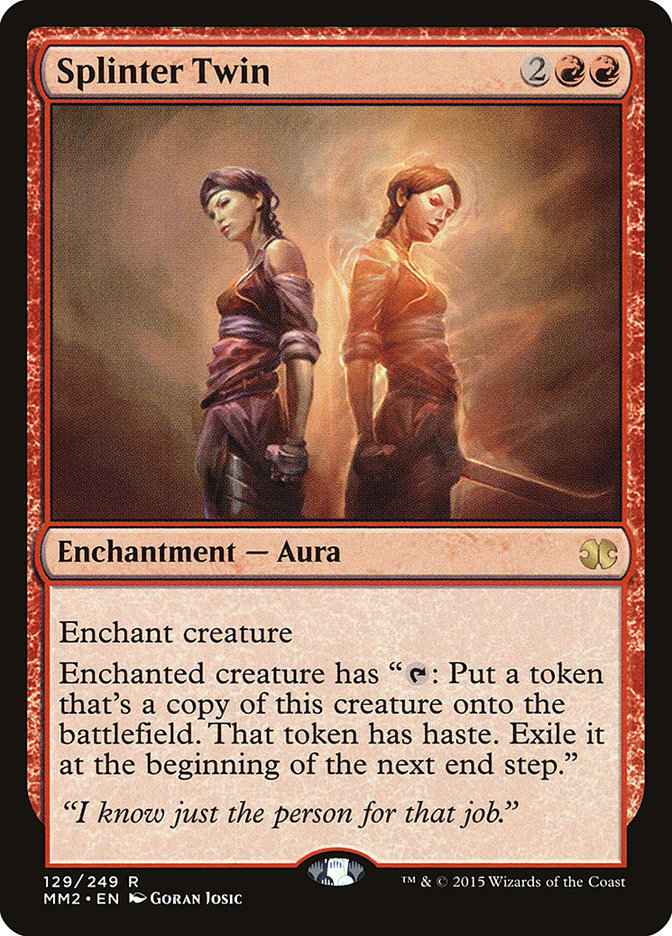
Any two cards that combine together to form an infinite combo.
Origin: Splinter Twin and a number of combo enablers.
The Abyss
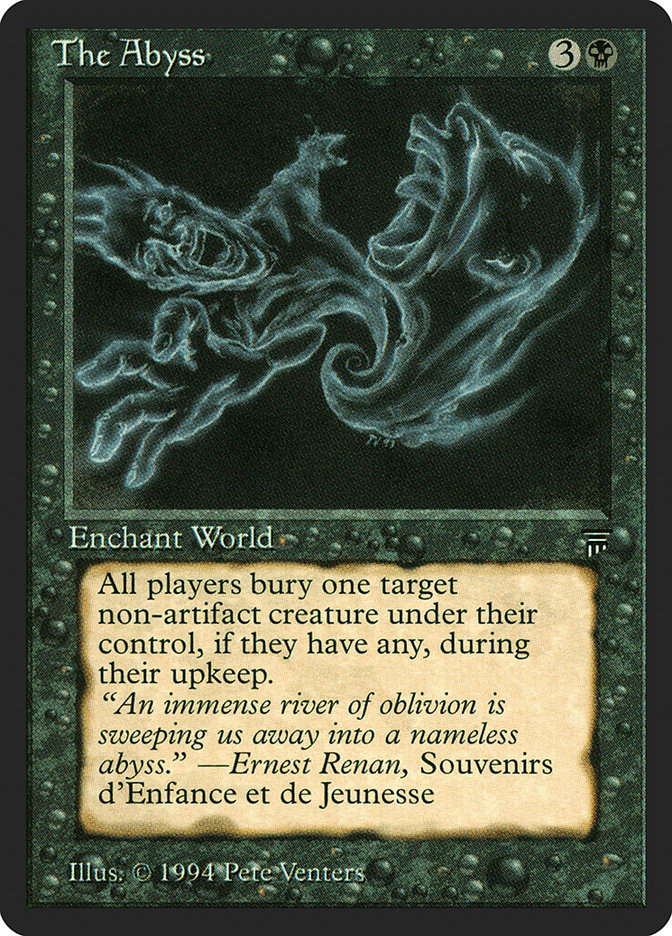
A game situation in which a player must lose a creature every turn to avoid dying, usually when a large creature demands a chump block every turn.
Origin: The Abyss.
Threaten
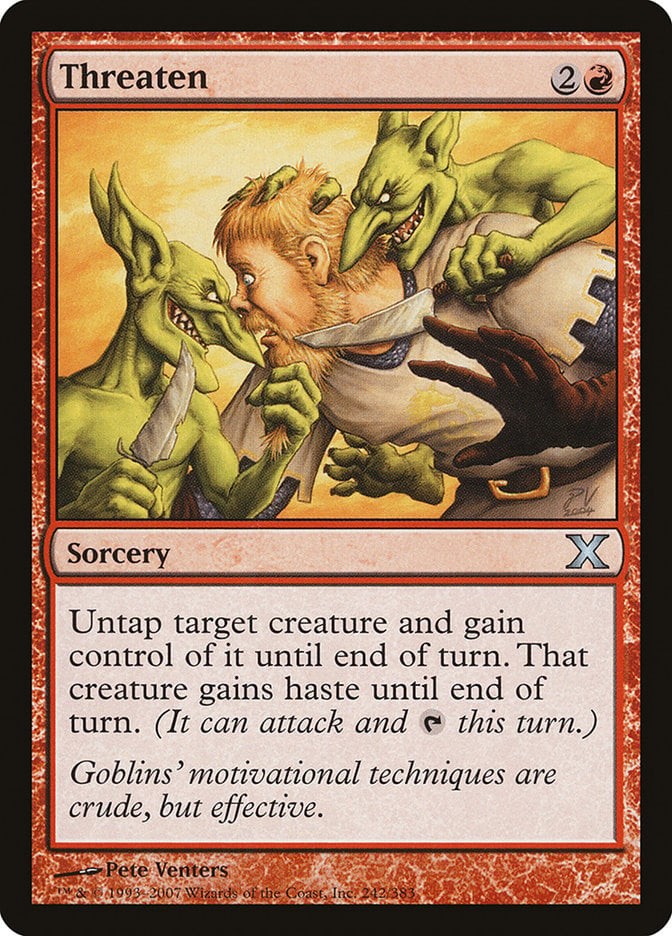
An effect that takes control of an opposing creature for a turn.
Origin: Threaten.
Time Walk
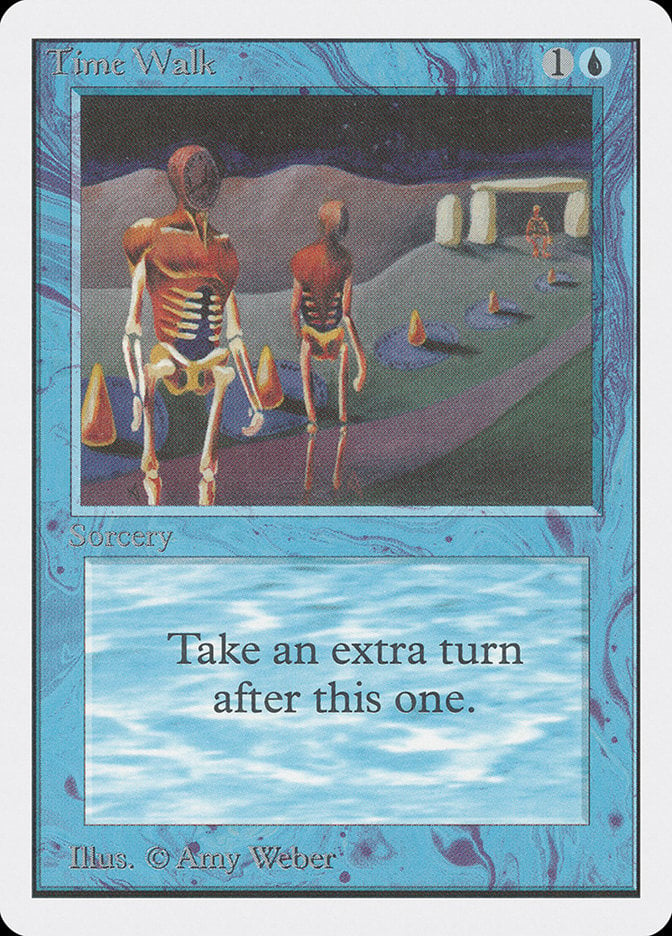
An extra turn spell. Also used to describe a situation where a player’s turn goes to waste, as in “they Time Walked themselves.”
Origin: Time Walk.
Tutor
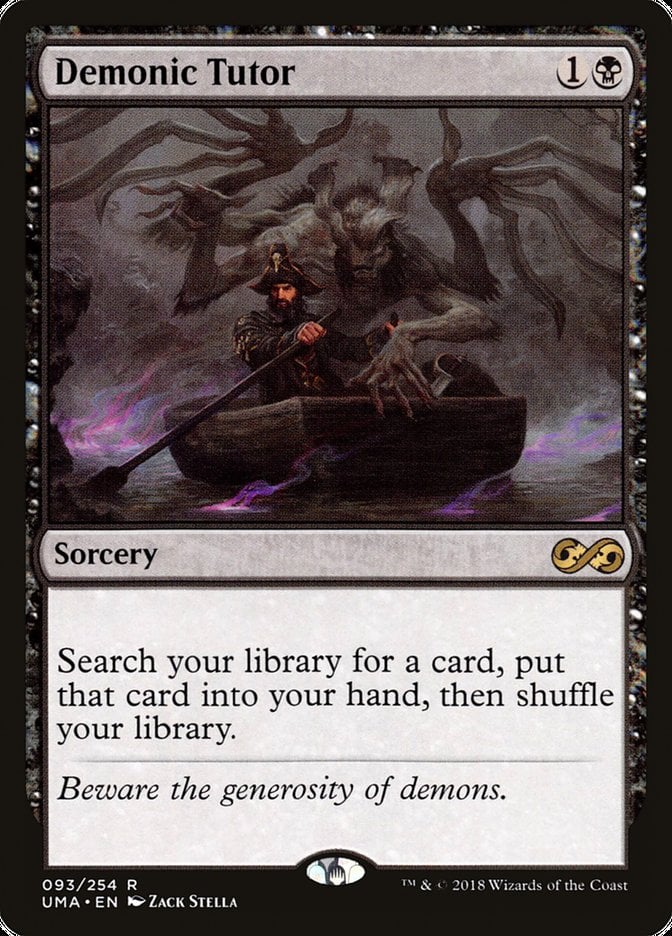
An effect that searches your library, sometimes for a specific type of card.
Origin: Demonic Tutor.
Twiddle
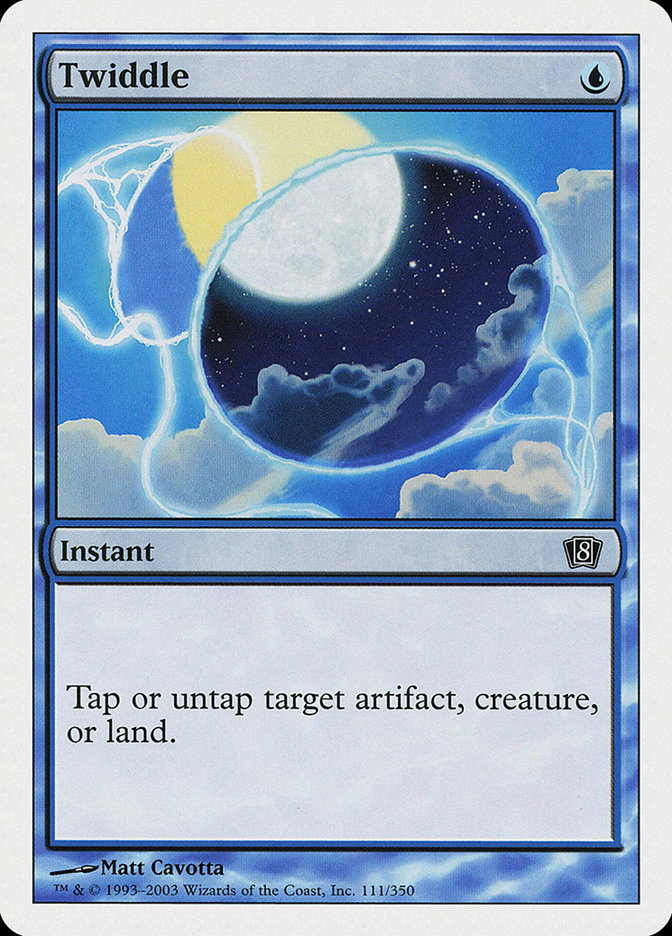
An effect that taps or untaps a permanent.
Origin: Twiddle.
Unsummon
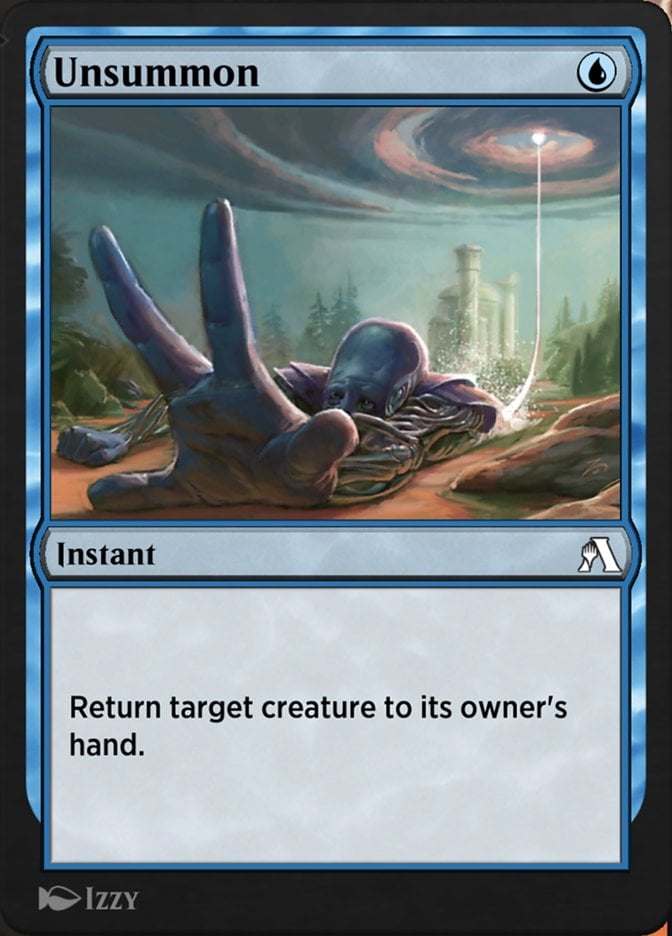
A spell that returns a creature to its owner’s hand. Interchangeable with “bounce.”
Origin: Unsummon.
Wheel
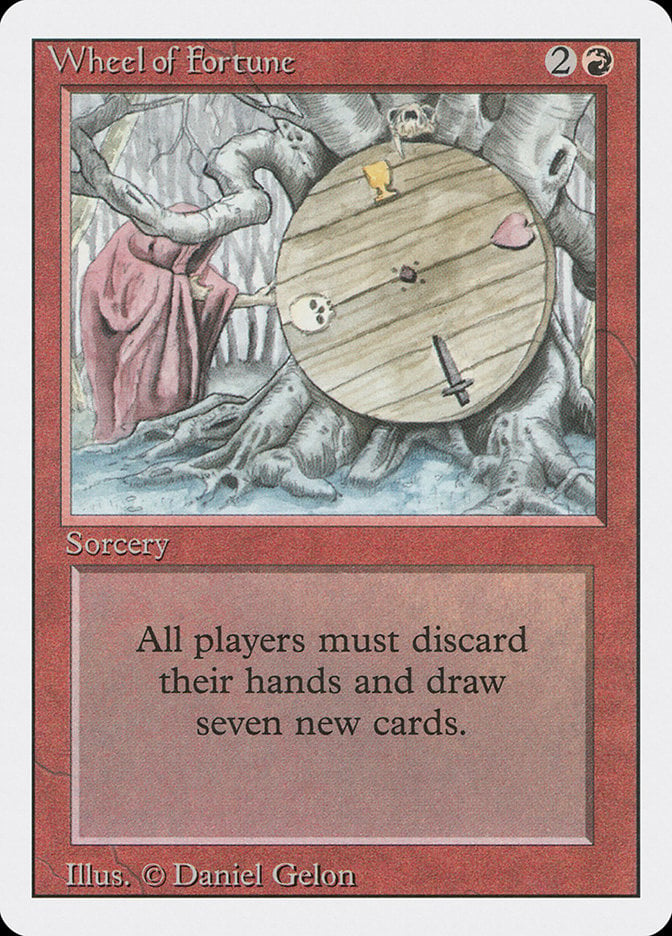
An effect that forces players to discard their hands and draw some number of new cards.
Origin: Wheel of Fortune.
Wish
An effect that selects a card you own from outside the game.
Origin: The “Wish cycle” from Judgment.
Wrath
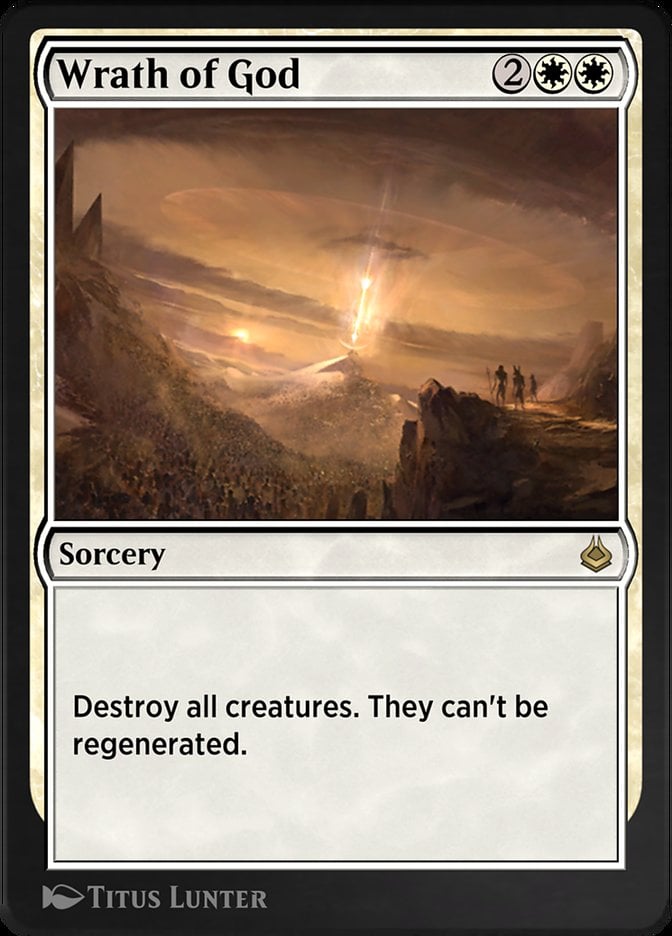
An effect that destroys all creatures. Used interchangeably with “board wipe” or “sweeper.”
Origin: Wrath of God.
Deck Names/Archetypes
.dec
Describes a deck focused on a single card type or effect. “Bears.dec” means a deck full of 2-mana 2/2 creatures.
8-Rack
A discard deck playing eight total copies of The Rack and Shrieking Affliction.
8-Whack
An aggro deck playing eight total copies of Goblin Bushwhacker and Reckless Bushwhacker.
Affinity/Robots
An artifact-focused deck that usually uses affinity creatures to play out its hand quickly.
Aggro
A macro-archetype short for “aggressive.” Fast decks that often sacrifice late-game card quality for early-game advantage. Aggro decks look to close the game out quickly and often rely on burn damage for reach.
Aristocrats
A deck centered around sacrificing its own creatures. Named after Falkenrath Aristocrat and Cartel Aristocrat, key cards in a notable Standard deck.
Bogles
A deck that pumps up a singular hexproof threat, usually with auras.
Brown/Mono-Brown
A deck consisting of mostly or only artifacts. Refers to the old brown card frame for artifacts.
Burn
A deck focused on dealing damage directly to the opponent, sometimes completely ignoring the board state.
Caw-Blade
A former dominant Standard deck centered around the key cards Jace, the Mind Sculptor, Squadron Hawk, Stoneforge Mystic, and Batterskull.
Cheerios
A deck consisting of mostly 0-mana spells (cheerios).
Combo
A deck attempting to assemble a specific sub-set of cards. Splinter Twin + Pestermite is a well-known infinite combo, but Reanimate + Griselbrand also qualifies as general combo.
Control
A macro-archetype looking to answer the opponent’s threats and win through inevitability or with a specific win-con. Usually wants to out-resource the opponent in a longer game. Commonly features counterspells, draw spells, and heavy interaction.
Death & Taxes
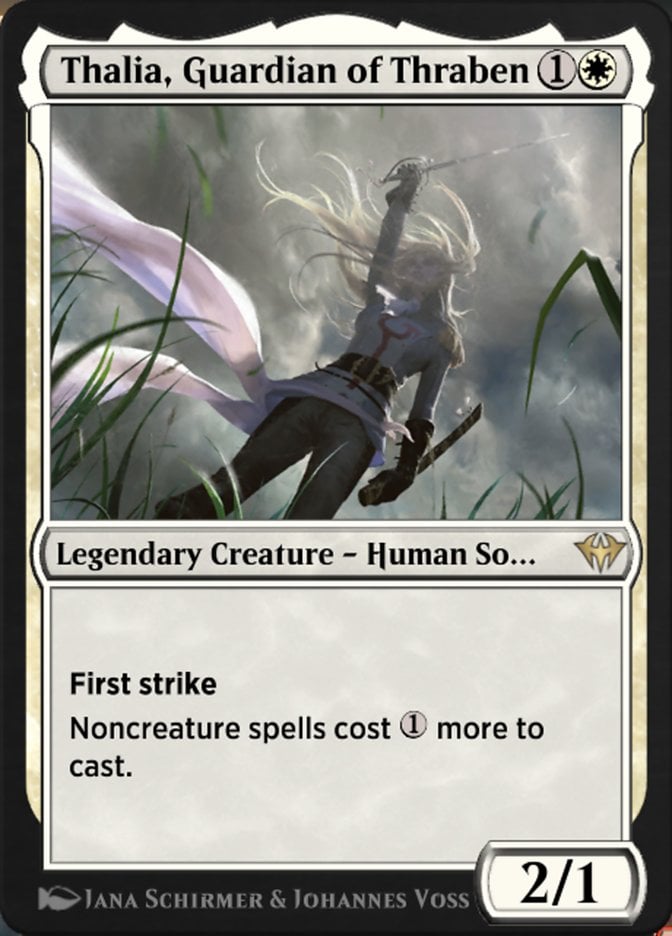
A deck with cheap, efficient threats and mana denial, usually including Thalia, Guardian of Thraben.
Draw-Go
A control deck that operates almost entirely at instant-speed and wants to be purely reactive during the opponent’s turn. Most turns consist of drawing for turn and immediately passing.
Elfball
An elf typal EDH deck.
Enchantress
An enchantment-themed deck.
Good-Stuff
A deck that’s playing high-quality cards without a central theme or gameplan.
Grouphug
A deck with cards that benefit all players or select players.
Groupslug
A deck that chips away at players’ life and resources and stifles their ability to play.
Junk
A nickname for decks before the name Abzan was established. Also a nod to Jund (), poking fun at Junk being the worse of the two.
Maverick
A -based deck similar to Death & Taxes that plays with more of a toolbox strategy.
Midrange
A well-rounded macro-archetype that’s not as fast as aggro and not as interactive as dedicated control, lying somewhere in between. Most decks are midrange decks, featuring efficient threats, removal, and card advantage.
Miracle Grow
A deck centered around creatures that continuously scale in power. Quirion Dryad was the original Miracle Grow creature, but Enigma Drake and Crackling Drake formed their own version.
Nic Fit
A multi-color deck with value cards that generally play well together, like Veteran Explorer and Cabal Therapy. The name originates from a typo, with the intended deck name being “nice fit.”
Oops All ___
A deck only playing cards of a single type. “Oops All Spells” plays no front-facing land cards, relying on rituals, free mana sources, and MDFCs to produce mana.
Pillow Fort
A defensive deck that attempts to prevent the opponent from attacking you or removing your permanents. Ghostly Prison and Propaganda are iconic pillow fort cards.
Ponza
A deck focused on ramping while destroying its opponent’s lands.
Prison
A lockout deck, using cards like Chalice of the Void, Trinisphere, and Blood Moon to prevent the opponent from playing.
Reanimator

A deck focused on bringing a game-winning threat back from the graveyard. The name comes from Reanimate, or possibly the movie Reanimator.
Rogue Deck
A deck that intentionally avoids most meta card choices. Usually considered “tier-2” at best. No association with the rogue creature type.
Sligh
An aggro deck designed to beat its opponent quickly by using all of its mana on every turn. Usually a red-based deck with burn spells. Named after Paul Sligh, an early pilot of the archetype.
Soul Sisters
A lifegain deck centered around Soul Warden and Soul's Attendant.
Spellslinger
A deck with payoffs for casting large amounts of noncreature spells, usually instants and sorceries.
Stax
A strategy that attempts to cut off your opponents’ ability to play the game, usually through sacrifice effects, taxation, and mana denial/land destruction.
Stompy
An aggro/”beatdown” deck playing mostly creatures with above-rate high-power creatures.
Storm
A deck attempting to cast a flurry of spells in one turn, using cost-reduction abilities and rituals to generate mana. The win condition doesn’t necessarily need to be a storm card.
Superfriends
Tempo
Short for “temporary,” tempo decks give up long-term advantage in exchange for short-term gains. They’re often a hybrid of an aggro playstyle with control elements, and the term is often used in association with bounce spells.
“The Rock”
One of any -based decks that attempts to play the most efficient card possible at every point in the game. Defined by efficient disruption and above-rate creatures.
Toolbox
A deck with a collection of narrow card effects aimed at beating specific strategies, usually running tutors to find the right card for the right matchup.
Tron
A deck looking to assemble Urza's Power Plant, Urza's Mine, and Urza's Tower to generate large amounts of mana and cast expensive spells.
Turbo-Fog
A deck trying to prevent the opponent from dealing combat damage with fog effects while setting up an engine or finding a wincon.
Voltron
A deck using auras, +1/+1 counters, or equipment to make one large, resilient threat.
White Weenie
An aggro deck consisting of mostly 1- and 2-mana white creatures, cheap disruption, and anthem effects.
Zoo
A deck playing low mana value, high-power creatures. Often associated with creatures that benefit from having different land types in play.
Draft/Limited Slang
Bomb
A game-ender, usually a large flying creature or hyper-efficient card.
Pod
The players you’re grouped with for a Draft. Pods usually consist of eight players.
Signals
Information that can be gleaned by the cards that have/have not been picked from a pack.
Wheel
Draft picks from a pack you’ve already passed once. “Wheeling” a card is also called “tabling.”
Windmill Slam
Drafting an obviously powerful card without thinking about it.
Popular Nicknames
Bob
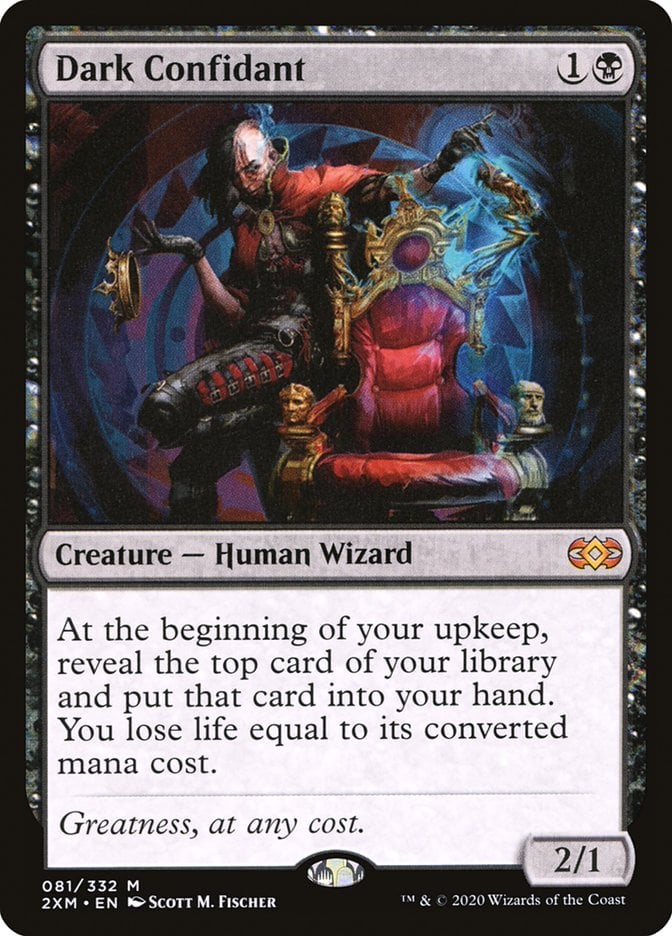
Dark Confidant, named after Bob Maher, who helped create the card after winning the 2004 Magic Invitational.
Darcy/DRC
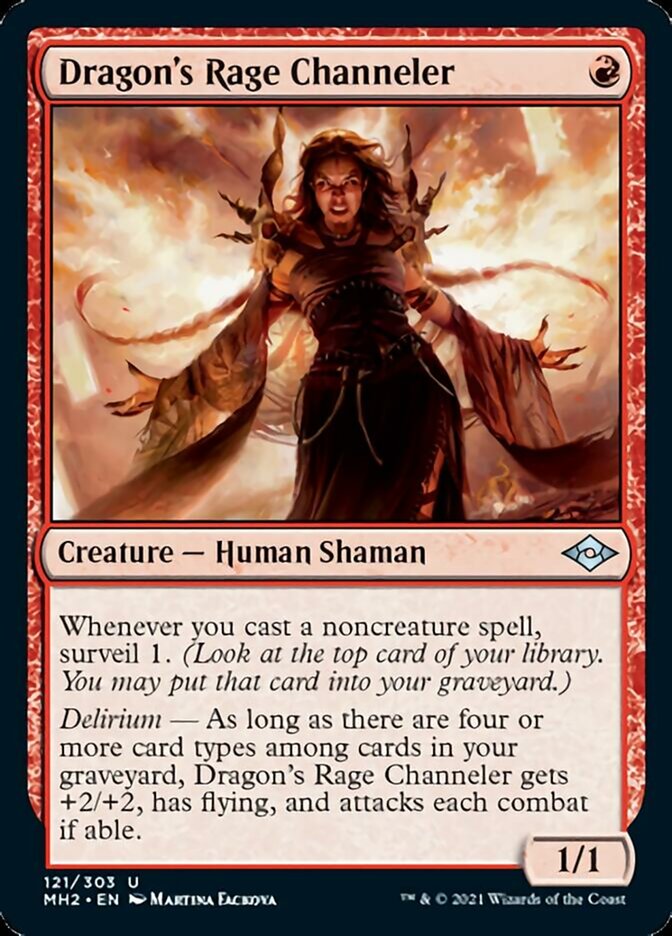
Origin: Dragon's Rage Channeler
Dr. Teeth
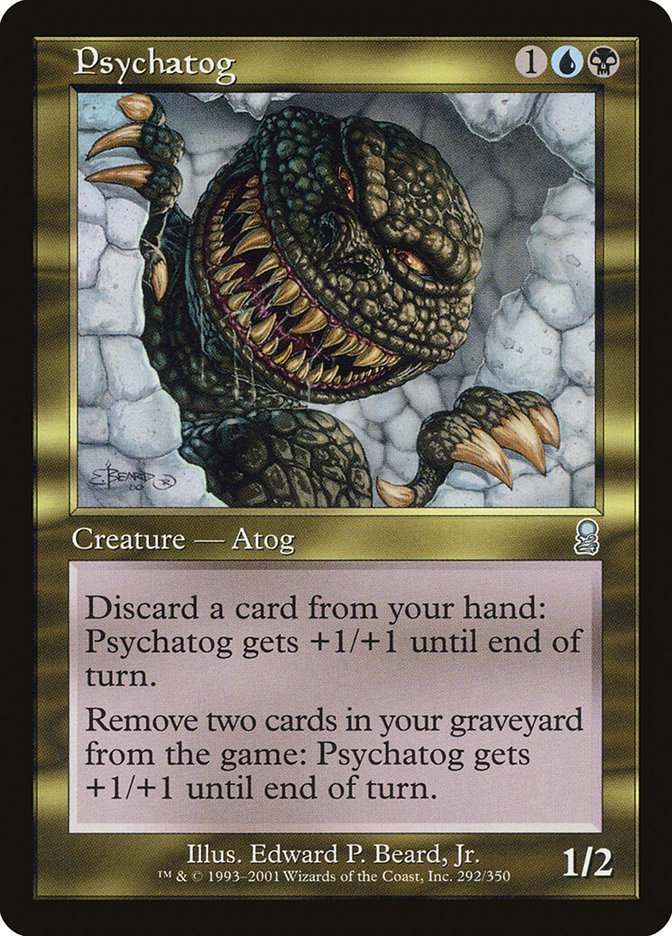
Origin: Psychatog
E-Wit
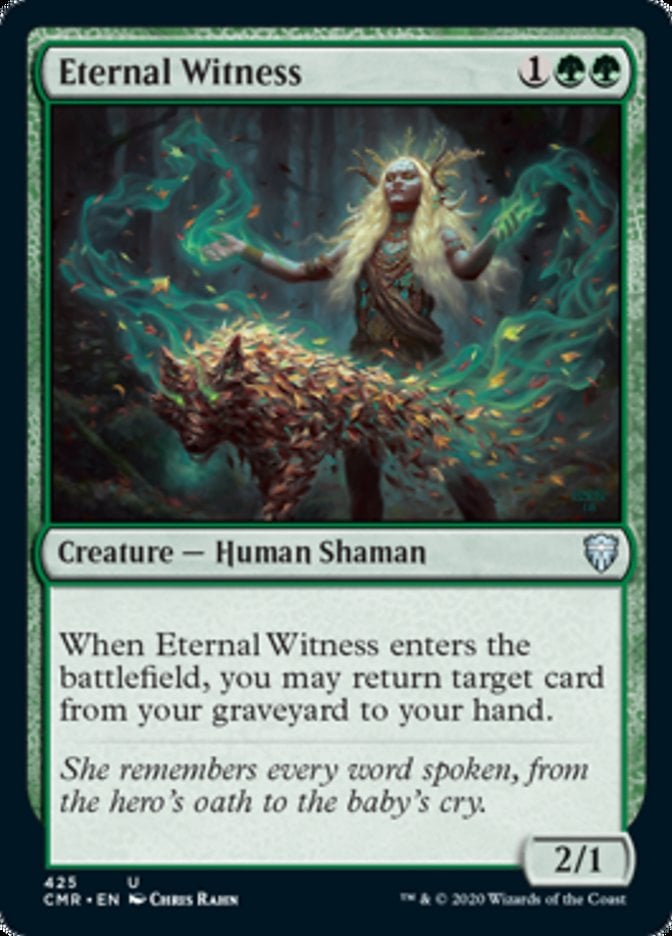
Origin: Eternal Witness
Gary
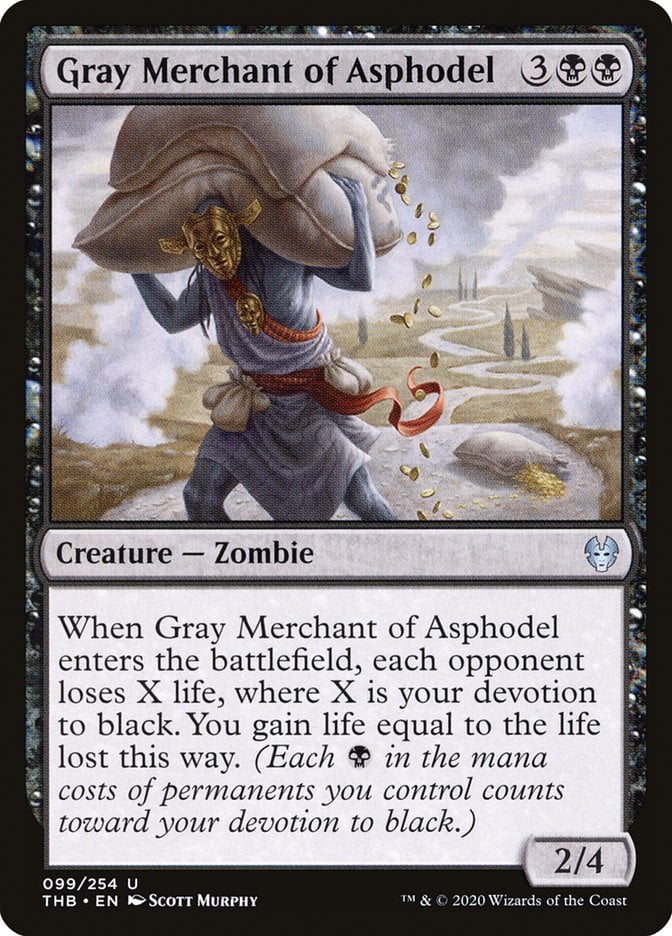
Origin: Gray Merchant of Asphodel
Karnstruct
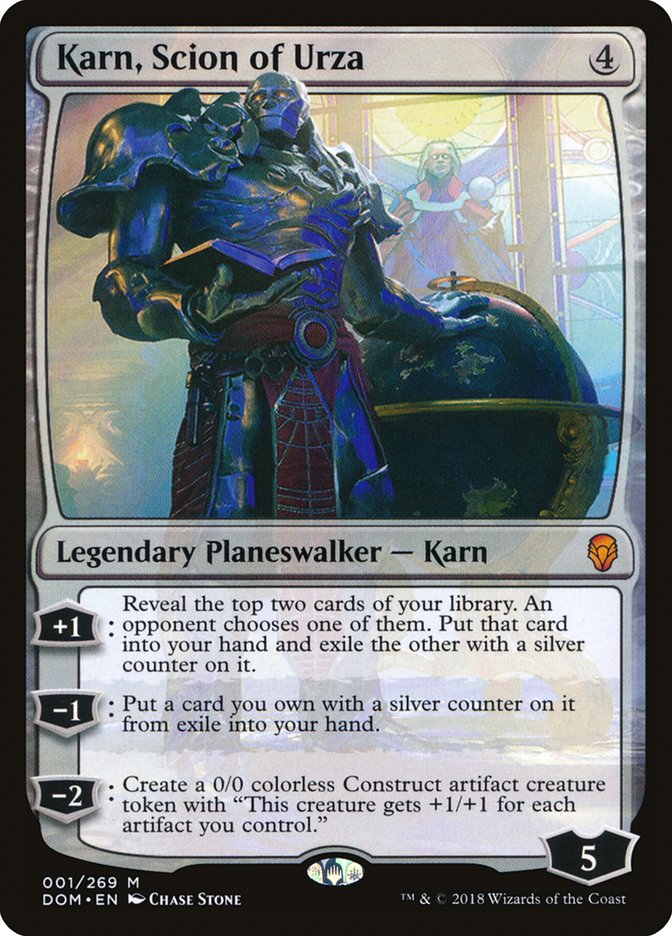
Origin: 0/0 Construct tokens created by Karn, Scion of Urza and others.
Lab Man
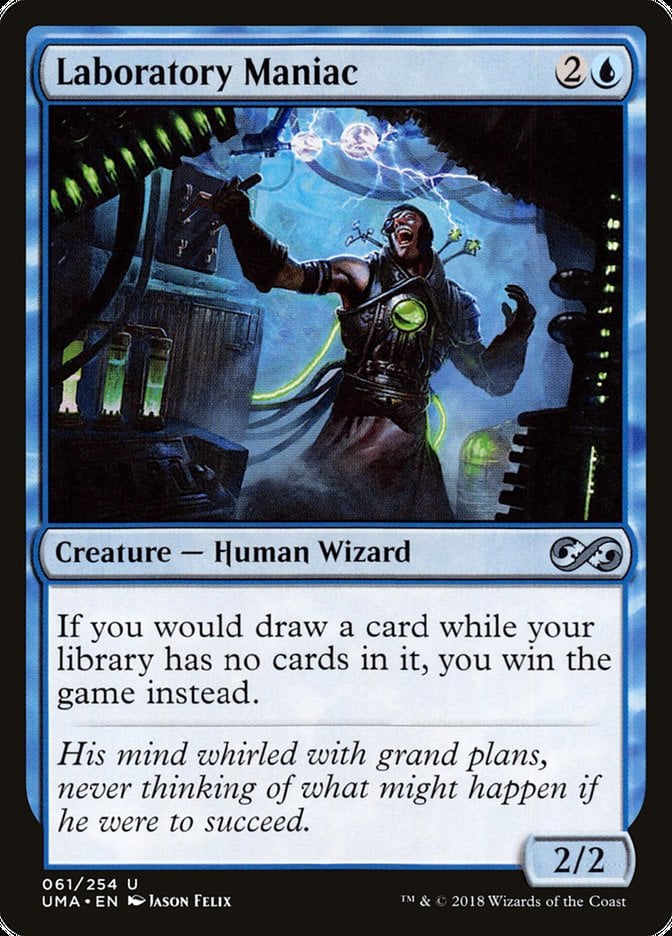
Origin: Laboratory Maniac
Mom
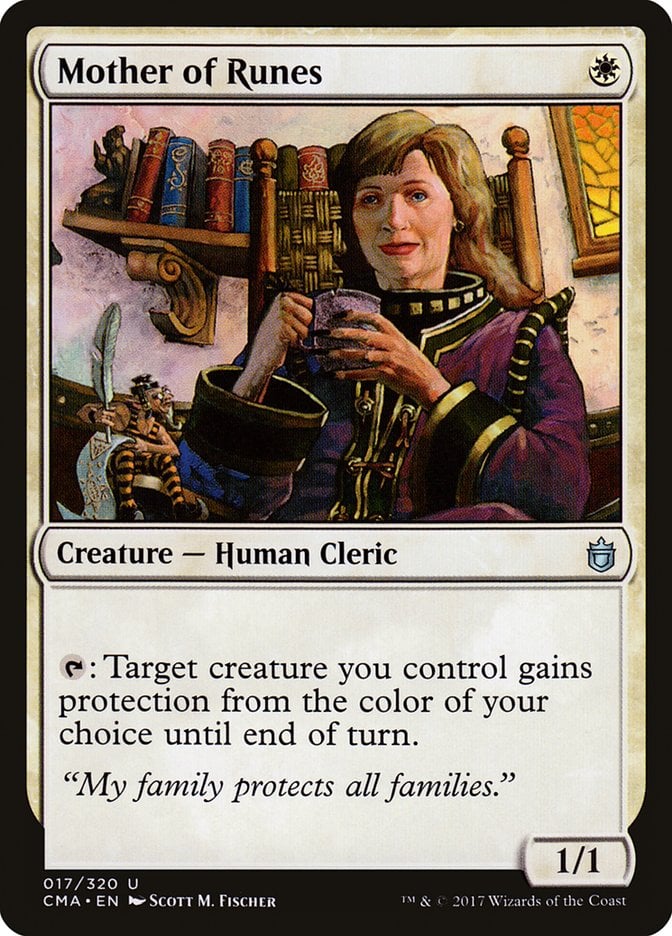
Origin: Mother of Runes
Prime Time
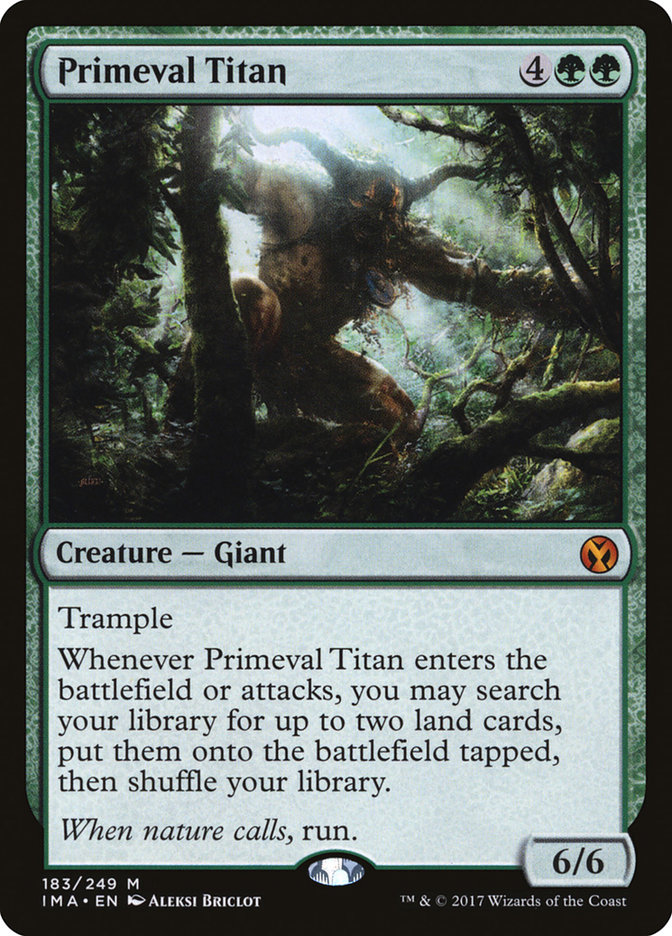
Origin: Primeval Titan
Scooze
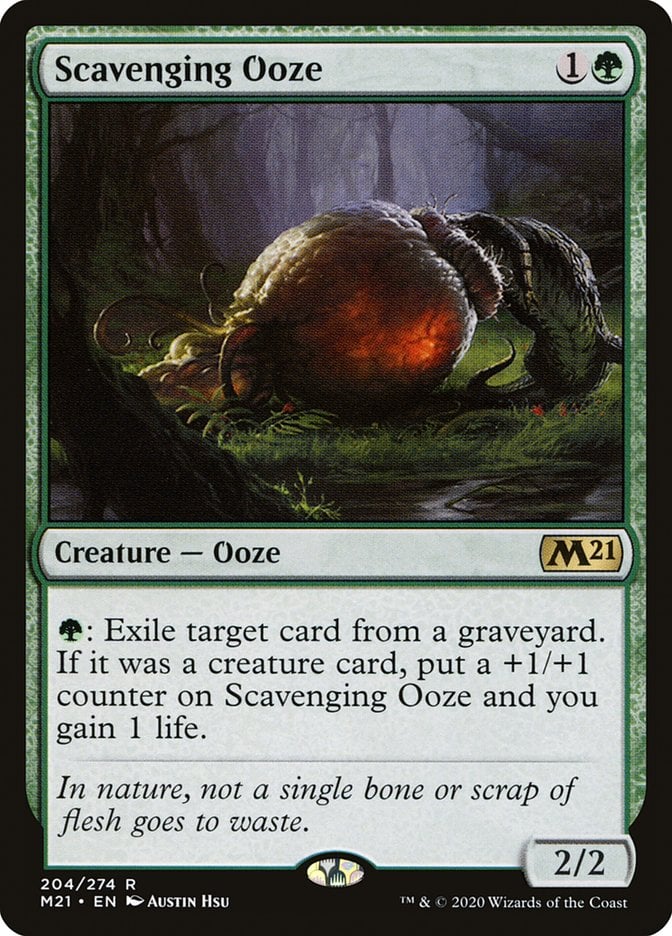
Origin: Scavenging Ooze
Skittles
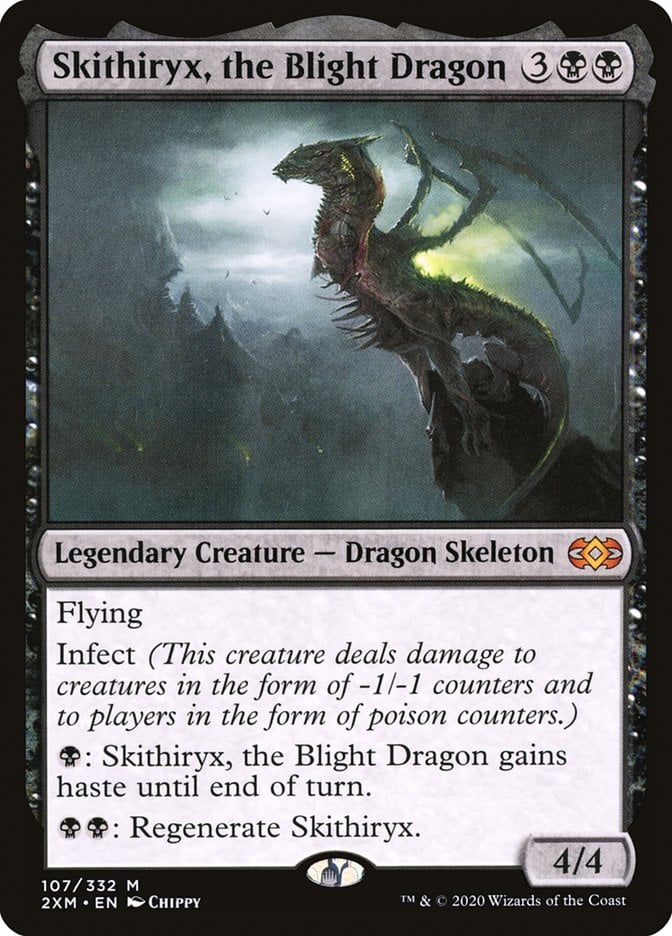
Origin: Skithiryx, the Blight Dragon
Steve
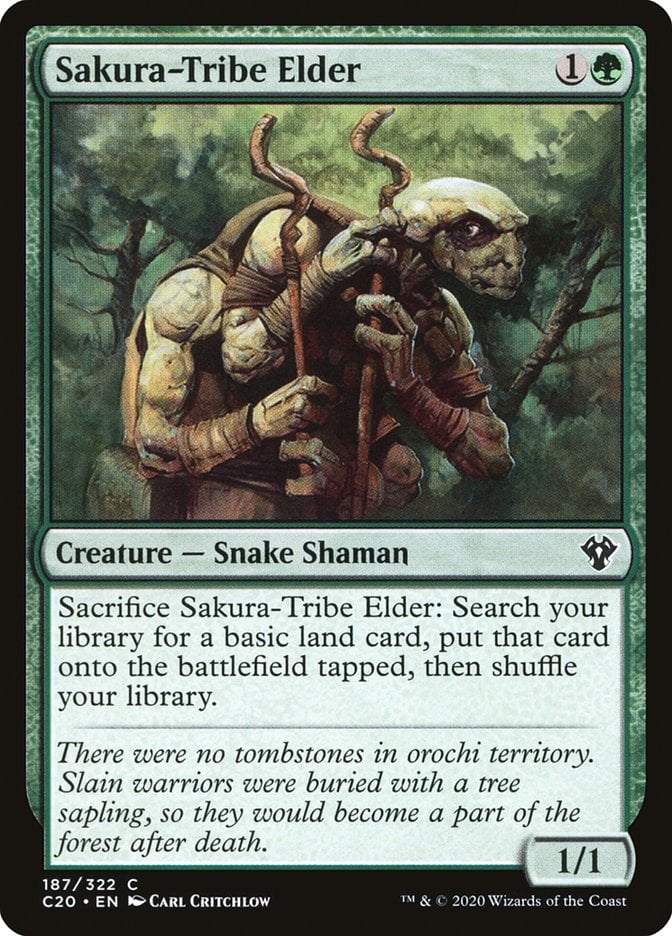
Origin: Sakura-Tribe Elder
Superman
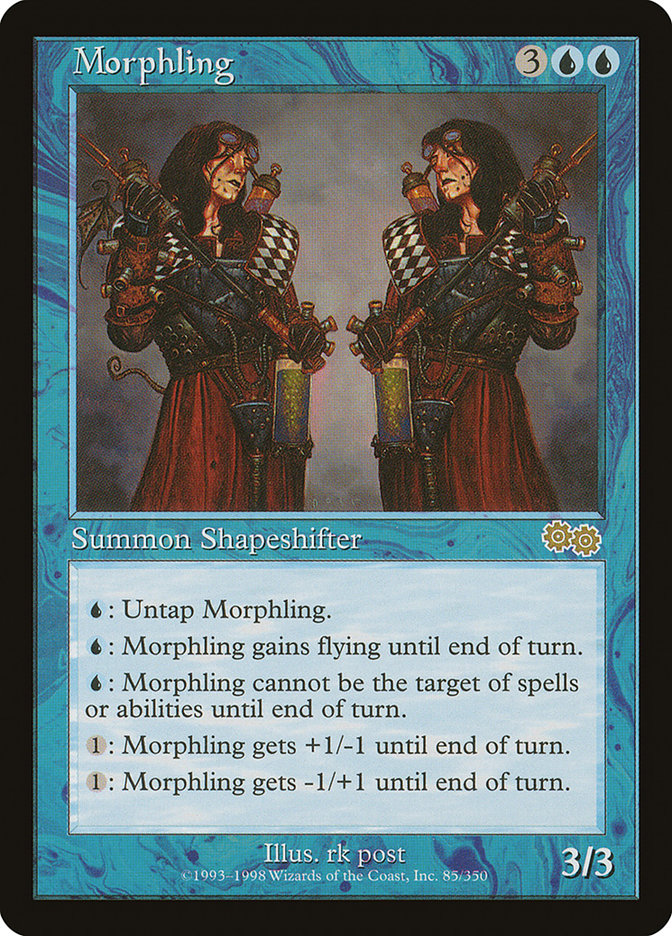
Origin: Morphling
Swagtusk
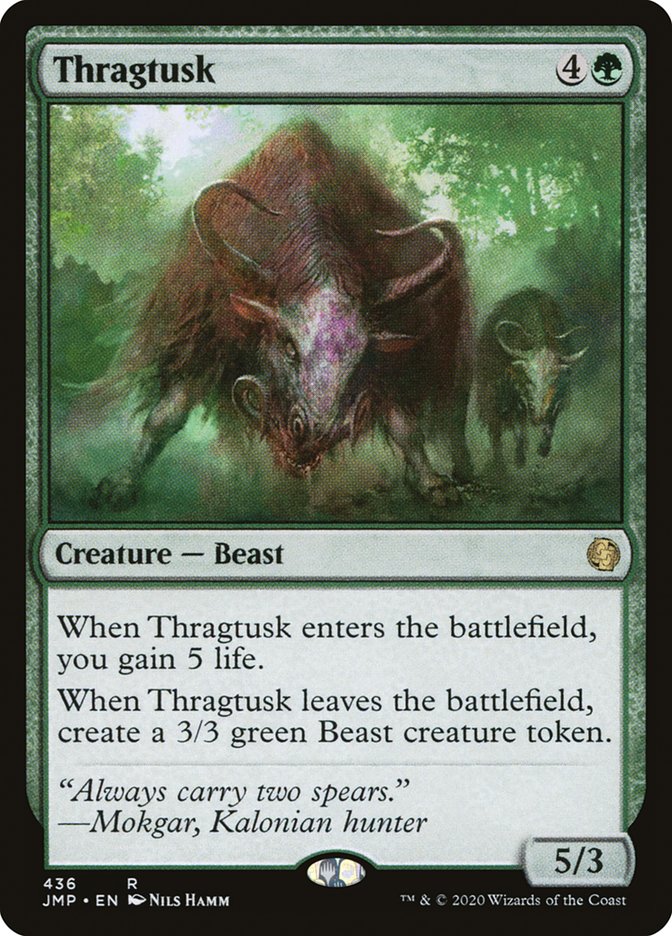
Origin: Thragtusk
Tim
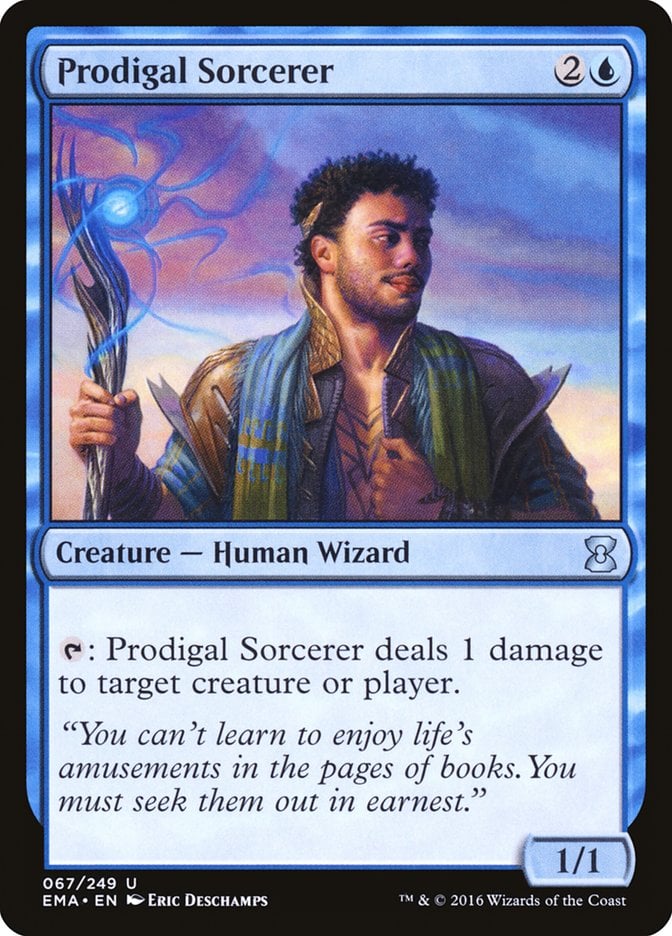
Origin: Prodigal Sorcerer
Young Peezy
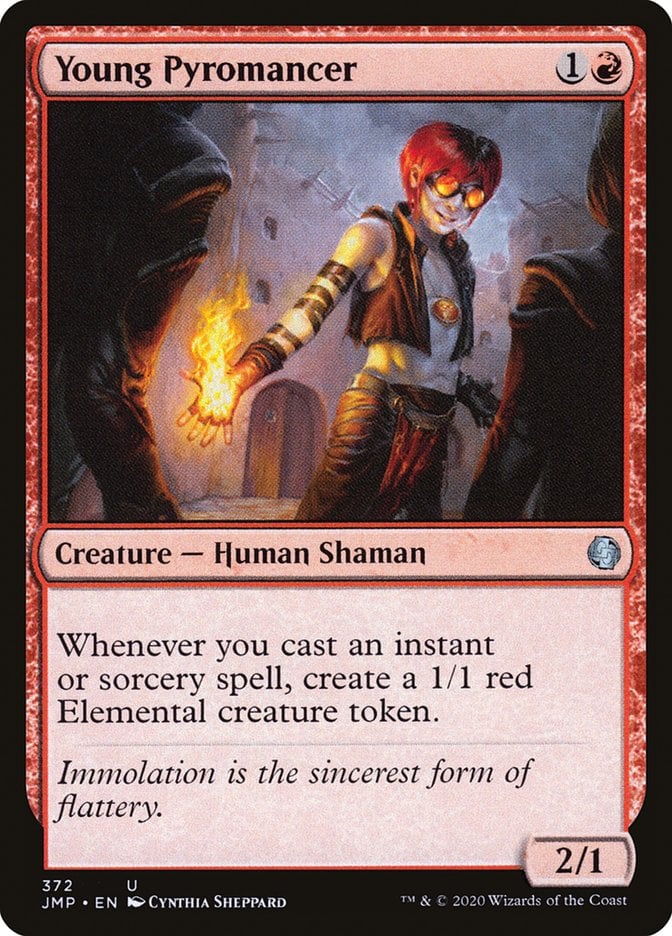
Origin: Young Pyromancer
General Slang Terminology
187 Creature
A creature that destroys another creature on ETB. Named after the penal code for murder in California.
Alpha Strike
An attack with all your creatures, also called “turning everything sideways.”
Answer
A card used to deal with an opposing threat. Usually a removal spell that “answers” an opponent’s creature.
Archenemy
A player who’s clearly ahead of the others in a multiplayer game, forming a 3-against-1 situation. Named after the Archenemy format.
Assembling Tron
A tongue-in-cheek way to say you have specific cards in play together. Controlling Crown of Empires, Scepter of Empires, and Throne of Empires at the same time is an example of assembling Tron.
Battlecruiser
Expensive creatures with powerful, game-warping abilities. “Battlecruiser Magic” describes games where each player is mostly ignoring cheap plays and focusing on battlecruiser cards.
Big Butt
High toughness, usually much higher than the creature’s power.
Bin
The graveyard. Putting a creature in the graveyard is “binning” it.
Blowout
A situation where one player comes out significantly ahead after interacting with another player. Usually involves one player losing multiple cards.
Board Presence
The collective permanents you control on the battlefield, specifically the creatures.
Board Wipe
An effect that removes all of a certain type of permanent from the battlefield, usually creatures. Vandalblast is an artifact board wipe, while Damnation is a creature board wipe. Used interchangeably with “sweeper” or “wrath.”
Body
A creature on the battlefield. Also refers to the power/toughness of a creature.
“Bolt the Bird”
A phrase that suggests you should always use removal on your opponent’s turn-1 mana dork when possible. Comes from a common situation where someone has Lightning Bolt against an opposing Birds of Paradise.
Broken
Way too good compared to other cards/decks. See also: Cracked, busted in half, banworthy, etc.
Burn
Damage dealt directly to a player. Lava Axe and Lava Spike are traditional burn spells.
Bury
To acquire so much of a resource that the opponent can’t keep up. Drawing 20 cards is “burying your opponent in card advantage.” Distinct from the obsolete game term “bury.”
Cantrip
A cheap spell that replaces itself, usually by drawing a card. A “cantrip creature” draws a card when it enters the battlefield. Derived from cantrips in D&D, which are simple spells that don’t expend spell slots.
Cheerio
A 0-mana spell, specifically one with in its mana cost.
Chump Attack
Attacking a smaller creature into a larger one that’s likely to block and remove your creature for free.
Chump Block
Blocking with a creature expecting it to die, with the creature it blocked surviving. Usually done to preserve your life total.
Clock
The assumed number of turns left in the game. If you have 20 life and your opponent is attacking you with a 5/5 creature you can’t stop, you are on a 4-turn clock.
Clutch
Ideal timing. A card that you drew on the exact turn you needed it “came in clutch.”
Color Hoser
A card designed to counteract a specific color of card or a specific basic land type. Boil and Choke are blue color hosers, whereas Deathgrip and Hibernation are green color hosers.
Combat Trick
An instant or activated ability that buffs or debuffs a creature, usually after attacks and blocks have been declared.
Crack
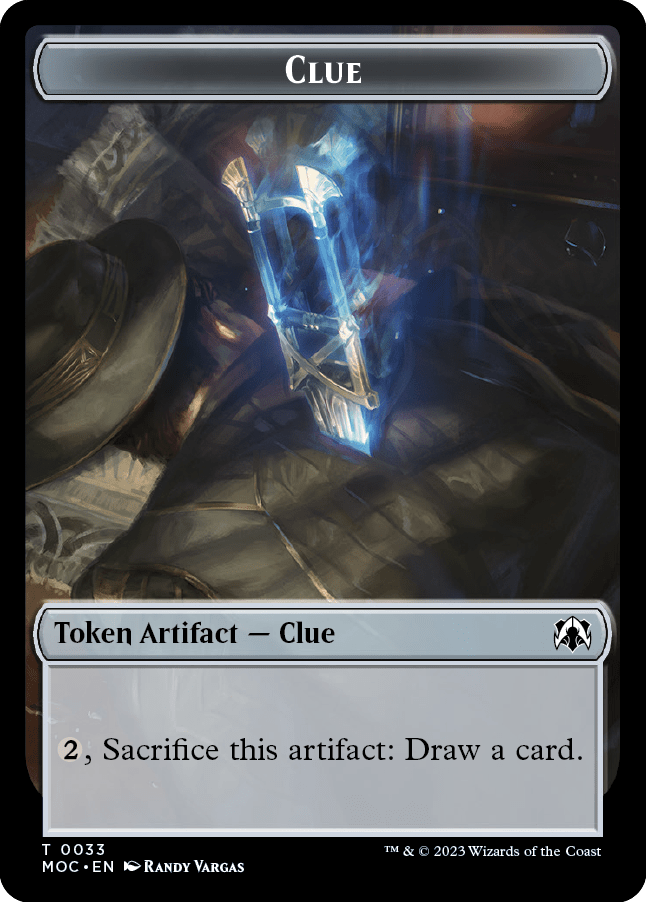
Sacrificing a permanent as part of a cost. You “crack” a Clue when you activate its ability.
Crack-Back
The attack you expect your opponent to make back at you after you attack them.
Curve
The distribution of mana values across the cards in your deck. Decks with mostly expensive cards have “high curves” while decks with mostly 1-mana and 2-mana spells have very “low curves.”
Cycle
A group of cards with a representative of each color/color pair that share a mechanical identity. Inferno Titan and Primeval Titan are the red and green cards in the “Titan cycle.” Badlands and Plateau are the and lands in the “dual land cycle.”
“Dies to Doom Blade”
A way to say a creature’s not good enough because it’s easy to kill with cheap interaction. Serves as an argument that creatures need to have an immediate impact on the game to be worth playing.
Durdling
Prolonging the game or disrupting your opponent from winning without having a plan to win yourself. “Wheel-spinning” or “buying time.”
Eggs
Cheap artifacts with self-sacrifice effects.
Evasion
Abilities that make it easier for a creature to deal combat damage or go completely unblocked. Flying and trample are common forms of evasion.
Evergreen
Anything expected to appear in most Magic sets. Flying, vigilance, and first strike are evergreen abilities. Treasure tokens are an evergreen artifact token.
F6’d
A way to indicate that you have no more plays for the turn. Comes from the shortcut key for yielding priority on Magic Online.
Fetch
Search a library for one or more cards.
Fixing
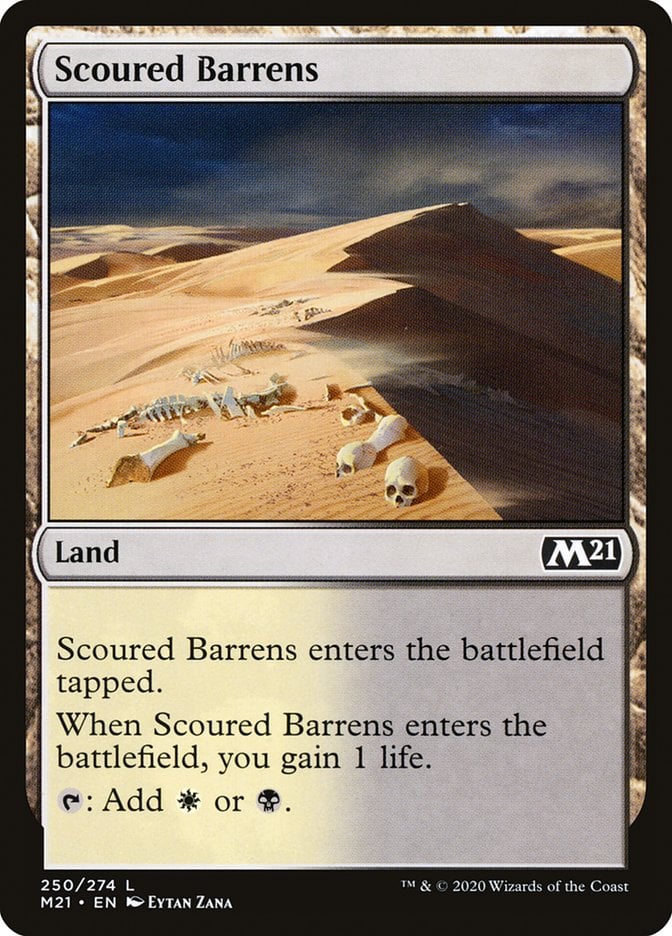
Effects that provide the colors you need to cast your spells. Scoured Barrens “fixes” for white and black mana.
Fizzle
A spell or ability being countered due to having no legal targets.
Float
Adding mana to your mana pool with the intentions of doing something with it later. Some effects allow you to “float” mana between steps and phases.
Flunge
Attacking with all your creatures without doing any combat calculations, hoping it works out in your favor.
French Vanilla
A creature with only keyword abilities.
Gas
A general way to say something’s good. “This deck is gas” means the deck plays well. Also describes the actions you can take in-game. If you have no cards in hand or plays to make, you’re “out of gas.”
Glass Cannon
A card or deck that fails completely if it doesn’t achieve its one main goal.
Go Tall
Making one hard-to-deal-with threat.
Go Wide
Spreading threats out and putting multiple bodies on board.
Goldfishing
Playing a game by yourself to learn play patterns, or drawing practice hands to see how they look. Also refers to games where you beat an opponent who didn’t do anything.
“Got There”
Won the game or got the card you needed.
Grind
Describes a slow attrition-based game where you’re gradually acquiring and trading off resources. Also used to describe consistently playing tournaments or matches, as in “grinding this season on the Arena ladder.”
Hard Counter
A counterspell with no restrictions, as opposed to a “soft counter” that usually counters a spell unless the controller pays a certain amount of mana. Counterspell is a hard counter, Mana Leak is a soft counter.
Hardcast
Casting a card for the full amount of mana. It costs eight mana to hardcast a Treasure Cruise with no cards in your graveyard.
Hatebear
A 2-mana creature with an effect that punishes certain strategies or prevents certain game actions. Usually a 2/1 or 2/2.
Jank
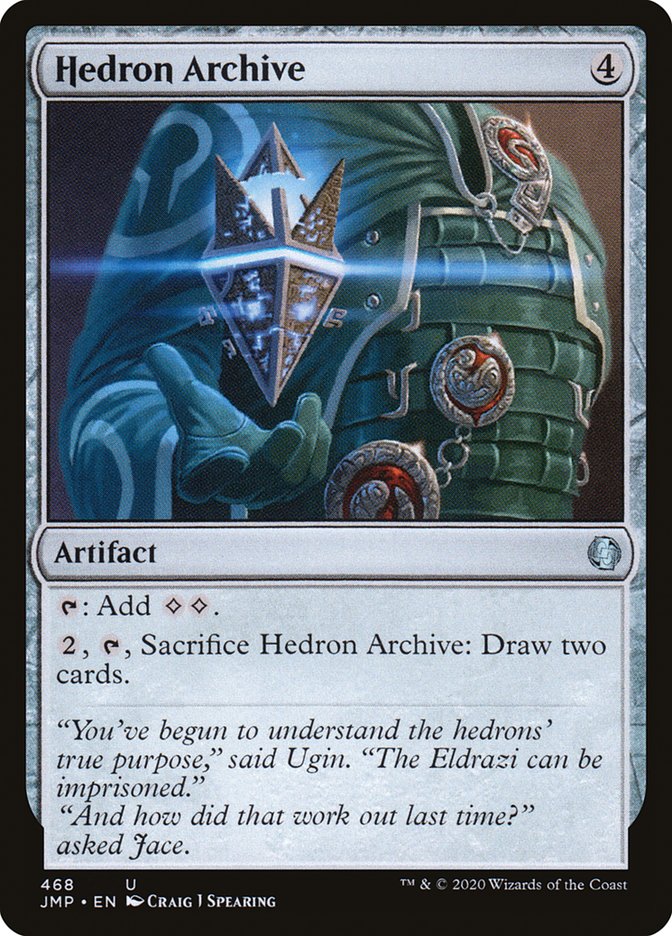
Less than ideal or otherwise “bad”. Usually used to describe a goofy or off-beat deck, card, or strategy. Trying to win with Hedron Archive might be considered “janky.”
Keyword “Big”
A “hidden” ability on creatures with no useful abilities but large stats.
Keyword Soup
A creature with numerous keyword abilities.
Kingmaking
Making decisions that determine the outcome of a multiplayer game in which you have no chance of winning. Choosing winners/losers.
Lethal
The amount of damage needed to kill a player. A “lethal attack” is one that threatens to take a player out.
Lightning Rod
A card that is almost always the opponent’s priority target for a removal spell.
Magical Christmas Land
A situation where a bunch of unlikely factors come together to make an awesome play. Wishful thinking.
Mana Dork
A creature with low power/toughness that taps for mana.
Mana Flood
Drawing too many lands.
Mana Rock
An artifact that taps for mana.
Mana Screw
Not drawing enough lands. Infrequently called “mana drought.”
Mana Sink
Something to use your mana on besides casting a spell. Usually an activated ability you can spend mana on multiple times.
Mana Base
The lands in your deck and the distribution of colored mana they can produce. Some people also discuss mana dorks and mana rocks when talking about their mana base.
Manland/Creatureland
A land that can become a creature. “Creatureland” is a more inclusive, gender-neutral way to refer to this card type.
Meta/Metagame
The collective most popular decks and cards within a given time period, tournament, or region. Diverse metas consist of multiple viable decks with strengths and weaknesses. Stagnant metas have one or two dominant decks with few counters.
Meta Call
Picking a deck or playing a card based on what’s expected within a current meta.
Mirror Match
A 1v1 game where both decks are playing most of the same cards or have the exact same colors and strategy.
Non-bo
A non-combo or anti-synergy between two or more cards.
“On the Throne”
The player with the highest life total is “on the throne,” a nod to the dethrone mechanic from Conspiracy.
Pants
Equipment. An equipped creature is “wearing pants.”
Pile
A deck with no consistent themes and lower-than-average card quality.
Ping/Pinger
Dealing one damage to something. A “pinger” is a source that can do this multiple times.
Pitch
Discarding a card from your hand, usually as the cost for another card.
Power
Short for the “Power 9.” A Cube or Constructed format is considered “powered” if it includes these cards.
Proxy
A non-tournament-legal substitution for a card, or in a tournament setting, a replacement that’s been approved by a judge.
Pulls
The cards you open from a booster pack or sealed product.
Punt
A mistake. “Punting” usually results in you losing a game.
On a Stick/On Legs/On Wings
A known effect that appears as the ability on a creature. Eidolon of the Great Revel is a Spellshock “on a stick” or “on legs.” If the creature has flying, it’s “on wings” instead.
Outs
Your potential draws that could shore up a game you’re winning or prevent you from losing.
Pressure
Your ability to consistently deal damage, usually with creatures.
Race
A situation where life totals are close and both players are consistently attacking one another.
Rattlesnake
An effect that’s visible to all players and discourages a player from taking a certain action, punishing them if they do so.
Saboteur
A creature with a combat damage trigger.
Sac
Short for “sacrifice.”
Scoop
To concede, as in scooping up your cards.
Shard
A 3-color pair consisting of a base color and each of its allied colors. Shards include Esper (), Jund (), Naya (), Grixis (), and Bant ().
Speed
Describes the timing at which certain types of spells can be cast. “Instant speed” can happen at any time, “sorcery speed” can only happen during your main phases. Effects like mana abilities that don’t use the stack are “faster than instant speed.”
Splash
Cards in your deck of a color other than your primary colors. A base deck with only two blue cards is “splashing” blue.
Stabilize
Reaching a board position where you’re no longer at risk of dying, usually coming back from a losing position.
Sweeper
An effect that removes all or most creatures from the battlefield. Used interchangeably with “board wipe” or “wrath.”
Swing
Attack.
Swingy
Describes a game where the advantaged player is constantly switching back and forth. Also describes the cards that cause this to happen.
Synergy
Facets of a deck or individual cards that work especially well with one another but aren’t necessarily great on their own.
Tap Out
Using up all your mana sources, usually leaving you with no way to interact during other players’ turns.
Tchotchkes
Assorted artifact tokens, including Treasure, Food, Blood, etc.
To the Dome/To the Face
Targeting a player, usually in reference to burn spells.
Topdeck
The top card of your library. “Topdecking” a card usually means you drew something useful when you desperately needed to do so.
Topdeck Mode
A situation where you have no meaningful actions to take and need to rely on drawing useful cards from your library. Also describes a stalemate situation where both players need to be the first to draw something relevant.
Tribal/Typal
Describes a specific subset of cards, usually a creature type. Separate from the tribal card type. Typal has been internally adopted by Wizards of the Coast and represents a more inclusive alternative to the term.
Tuck
Putting a permanent from the battlefield back into its owner’s library.
Ultimate
A planeswalker’s best ability, usually one that creates a powerful emblem or has a game-winning effect. Not every planeswalker has an ultimate.
Value
A bonus advantage you get from cards or effects, usually in the form of card draw. Divination is good value, and Inspiring Overseer gives you value attached to a body.
Vanilla
A creature with no abilities.
Wedge
A 3-color pair consisting of a base color and its two enemy colors. Wedges include Jeskai (), Abzan (), Mardu (), Temur (), and Sultai ().
Whiff
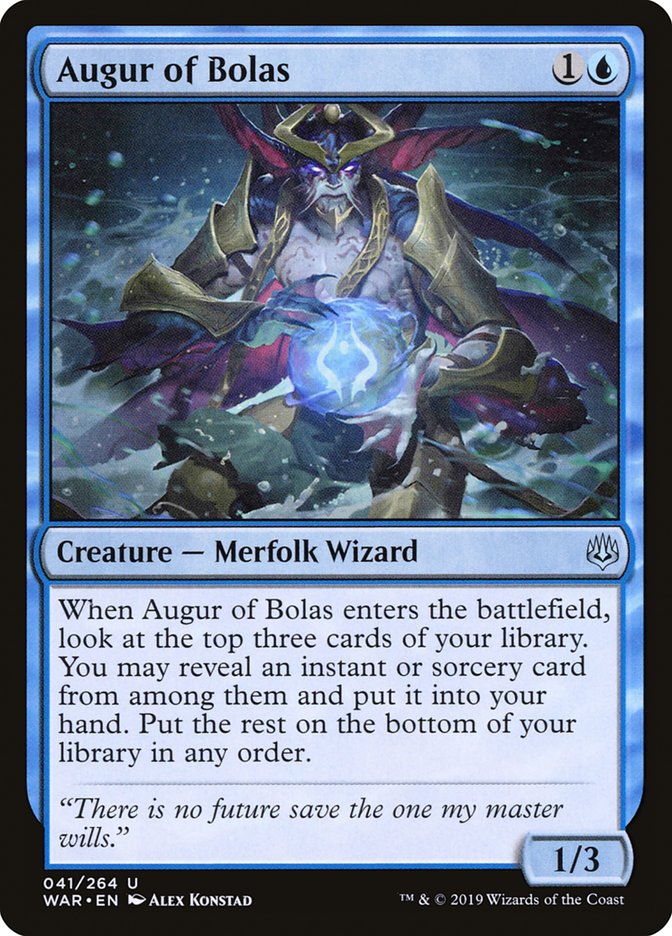
Missing out on an effect with a <100% chance of succeeding. If you resolve Augur of Bolas and look at three lands, you whiffed on the ability.
Wincon
Short for “win condition,” the card(s) or strategy you intend to win the game with.
X-Spell
A spell with one or more in its mana cost.
Keywords and Mechanics Used as Slang
Cycle
Discarding a card to draw a new one or casting a spell that does nothing other than draw another card. Derived from the cycling mechanic.
Flashback
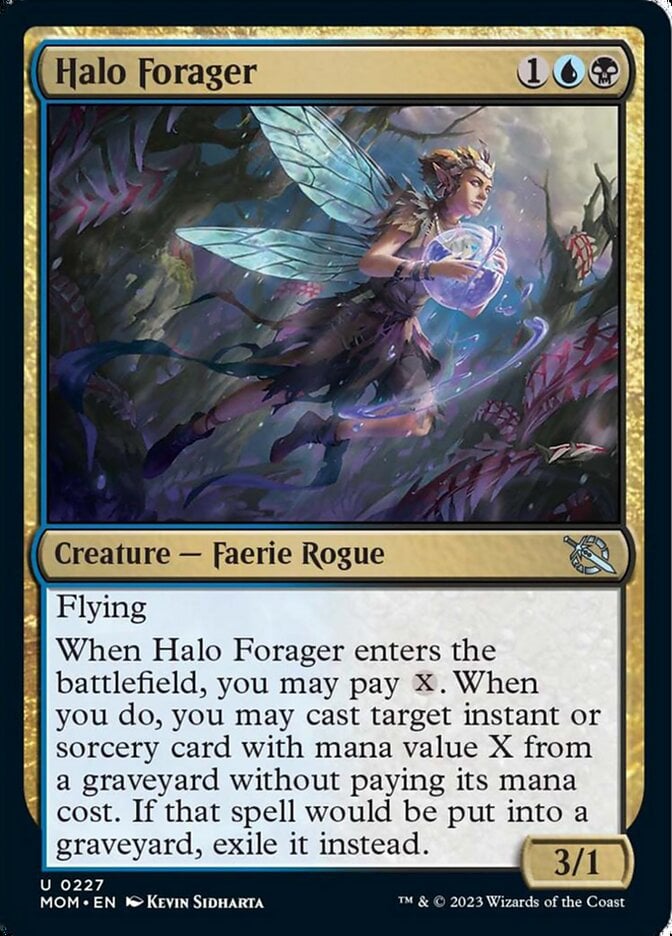
Casting a spell from your graveyard. Halo Forager lets you “flash a spell back.”
Hellbent
Having no cards in your hand, named after the Rakdos mechanic from Dissension. “Heckbent” is a riff on hellbent that means only having one card in hand.
Storming Off
Casting a lot of spells in one turn, a reference to the storm mechanic.
X-Fall
A riff on landfall, X-fall refers to a specific type of permanent entering the battlefield. “Creaturefall” cares about creatures entering the battlefield, and constellation is sometimes jokingly referred to as “enchantmentfall.”
Slang for Land Cycles
Bond Lands
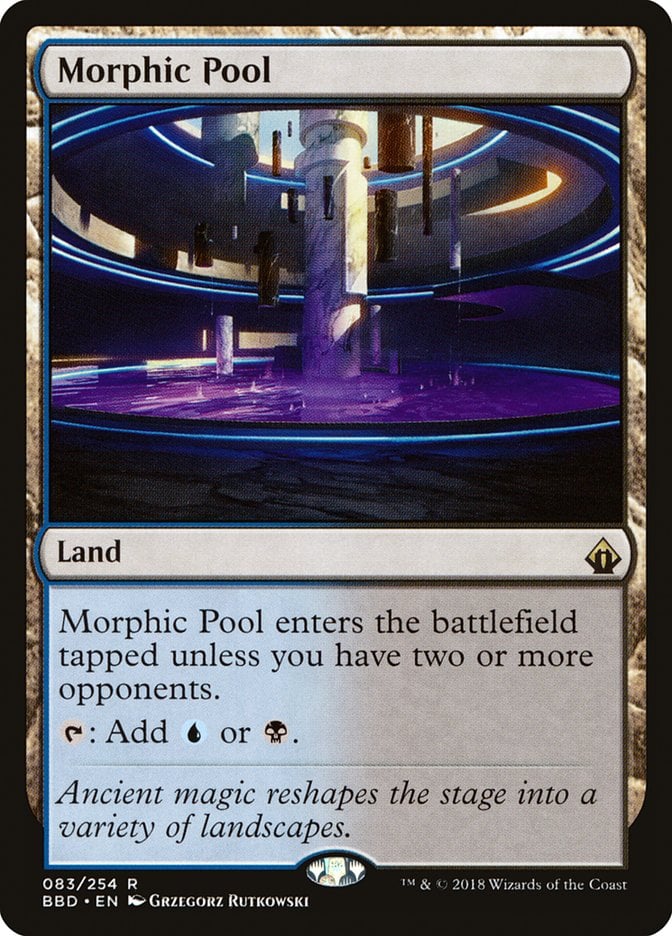
Dual lands originating from Battlebond that enter untapped if you have two or more opponents. Example: Morphic Pool.
Bounce Lands
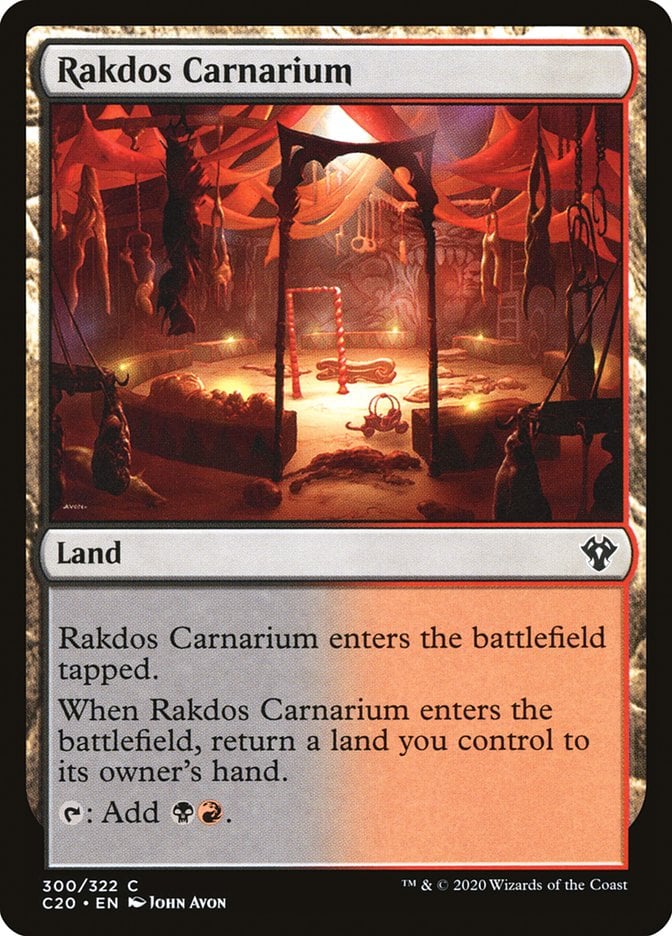
Lands that enter tapped and return a land you control to your hand but tap for two mana at once. Also called Karoos. Example: Rakdos Carnarium.
Canopy Lands/Horizon Lands
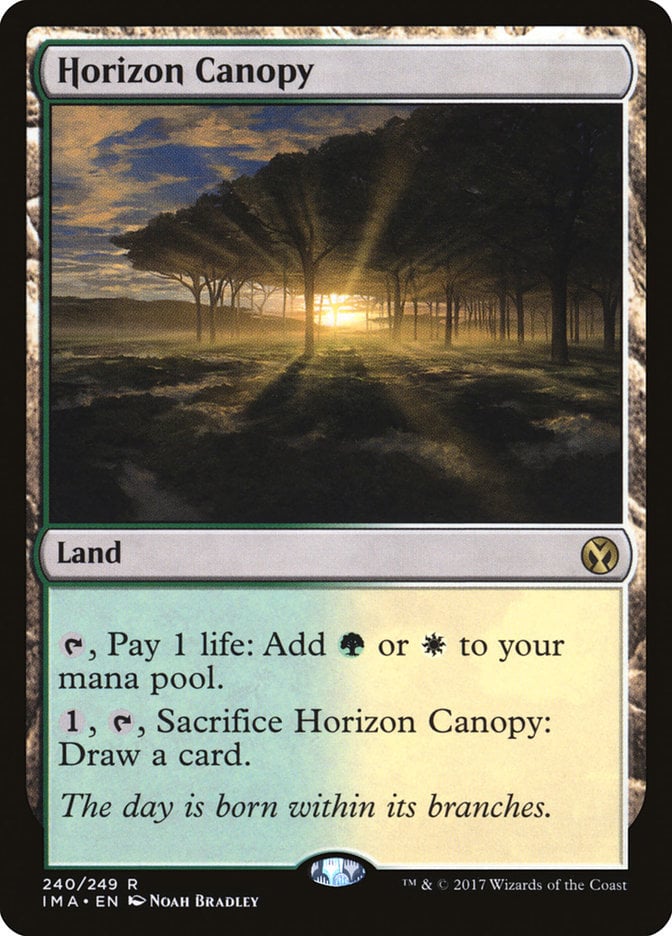
Dual lands that cost life to produce one of two different colors or can be sacrificed to draw a card. Example: Horizon Canopy.
Check Lands
Isolated ChaperDual lands that enter untapped if you control a land with a corresponding land type. Example: Isolated Chapel.
Dual Lands
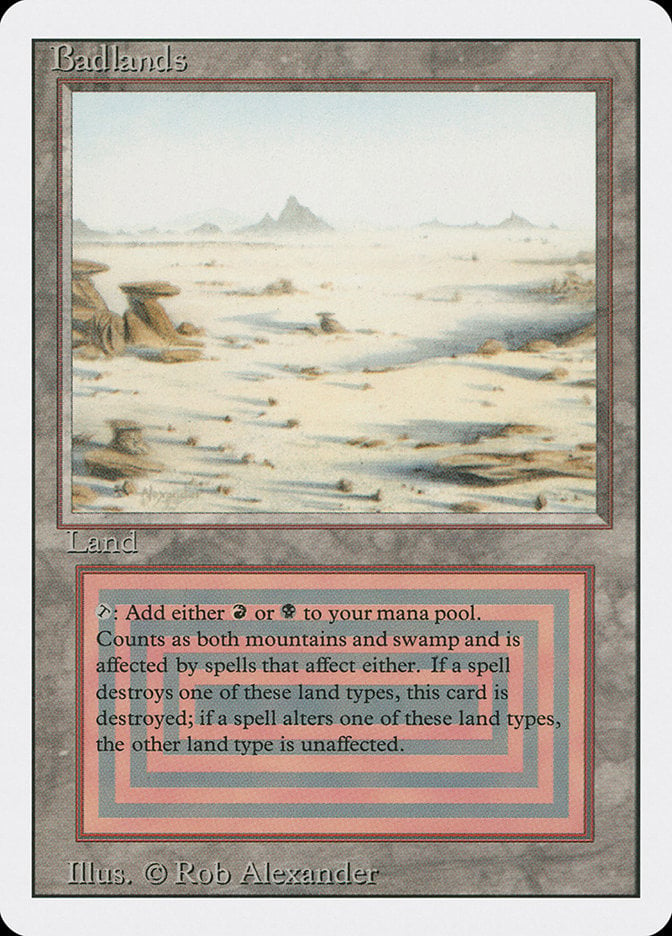
The original untapped lands from Alpha that tap for two different colors. Example: Badlands.
Fast Lands
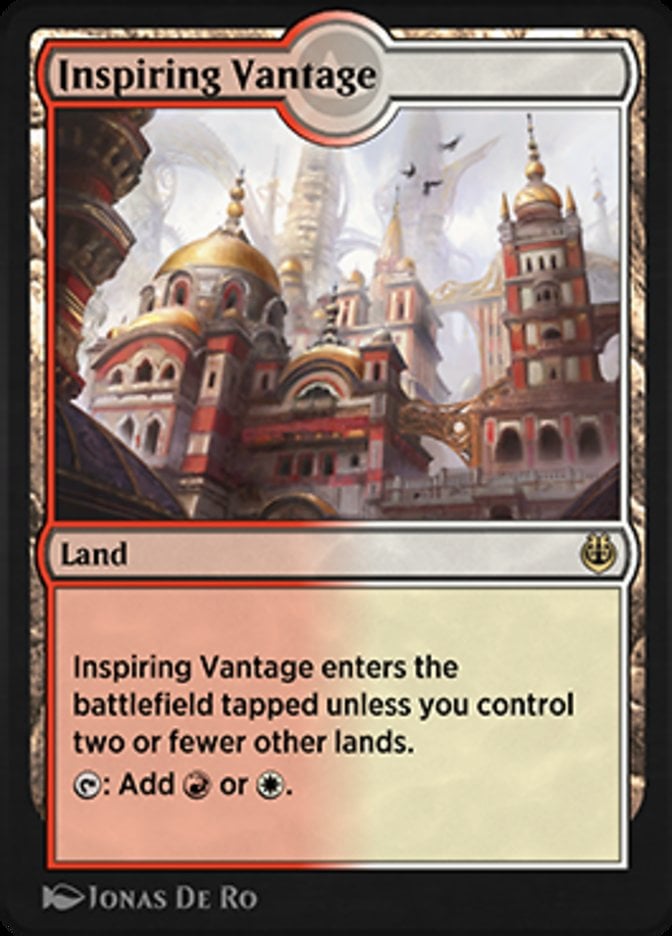
Lands that enter untapped earlier in the game, but usually enter tapped later. Example: Inspiring Vantage.
Fetch Lands
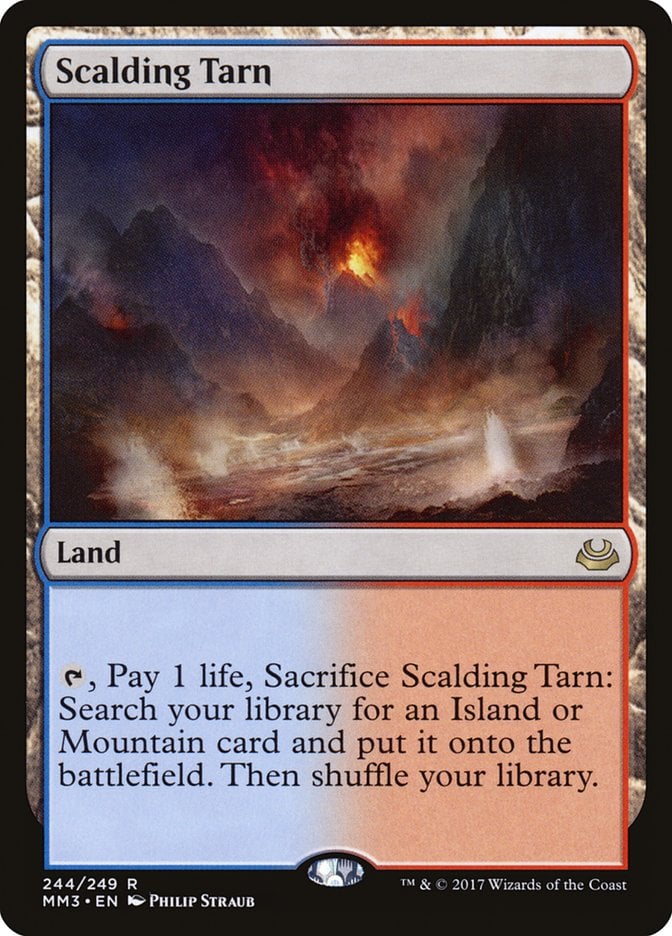
Lands you can sacrifice to search for a specific type of land in your library. Example: Scalding Tarn.
Filter Lands
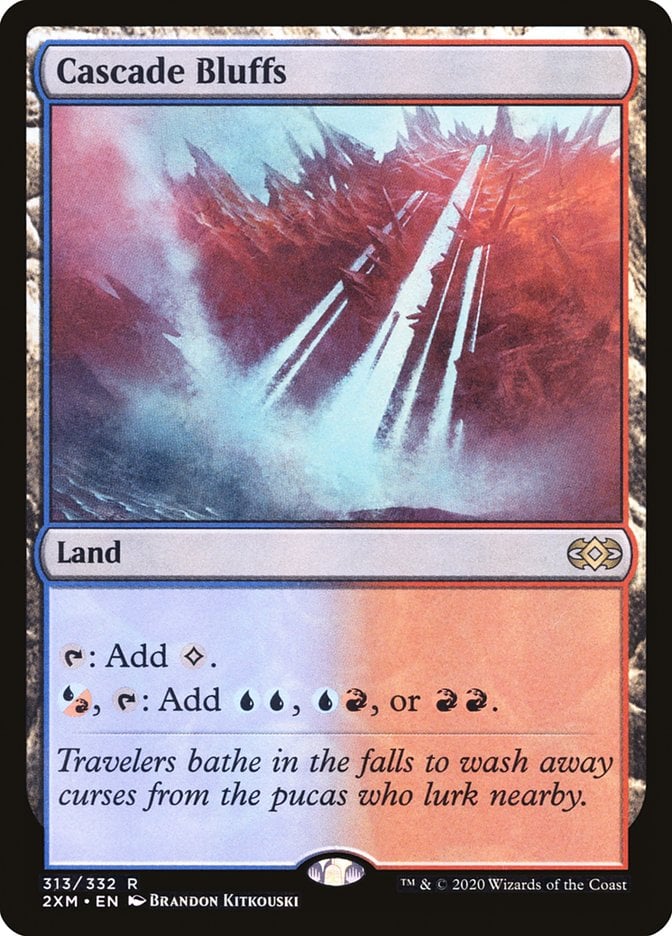
Dual lands that turn a single mana into some combination of two types of mana. Example: Cascade Bluffs.
Gain Lands
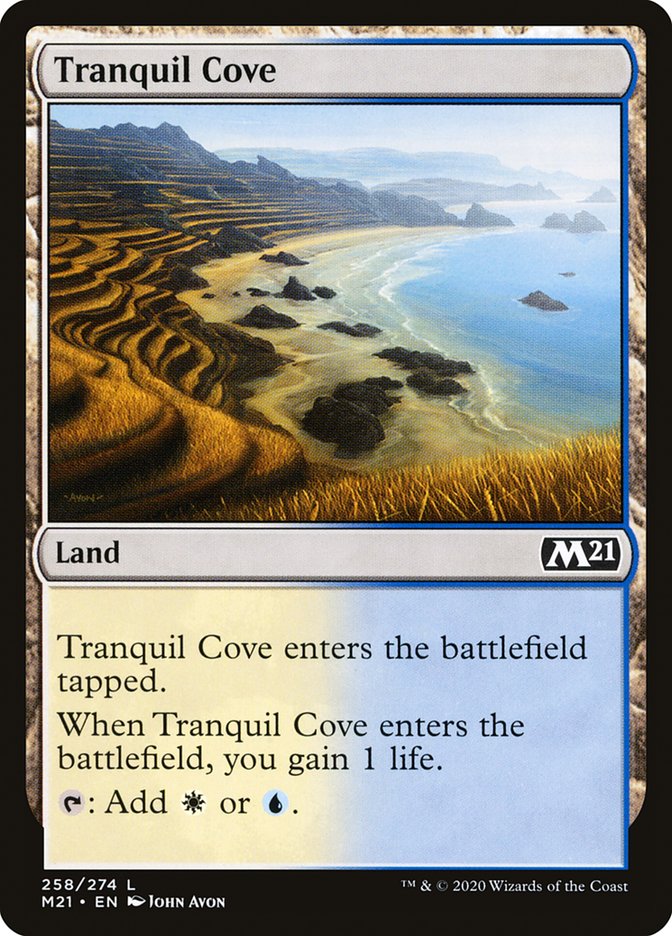
Dual lands that enter tapped and gain a life on ETB. Example: Tranquil Cove.
Guildgates
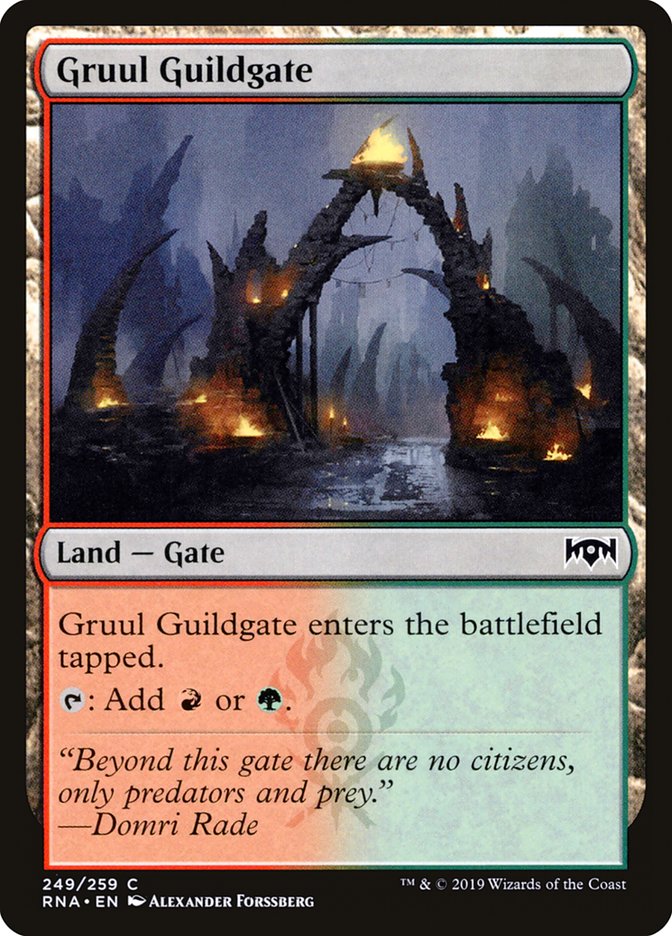
Dual lands with the subtype “gate.” Also used to describe any land that enters tapped and taps for two colors but offers no other utility. Example: Gruul Guildgate.
Pain Lands
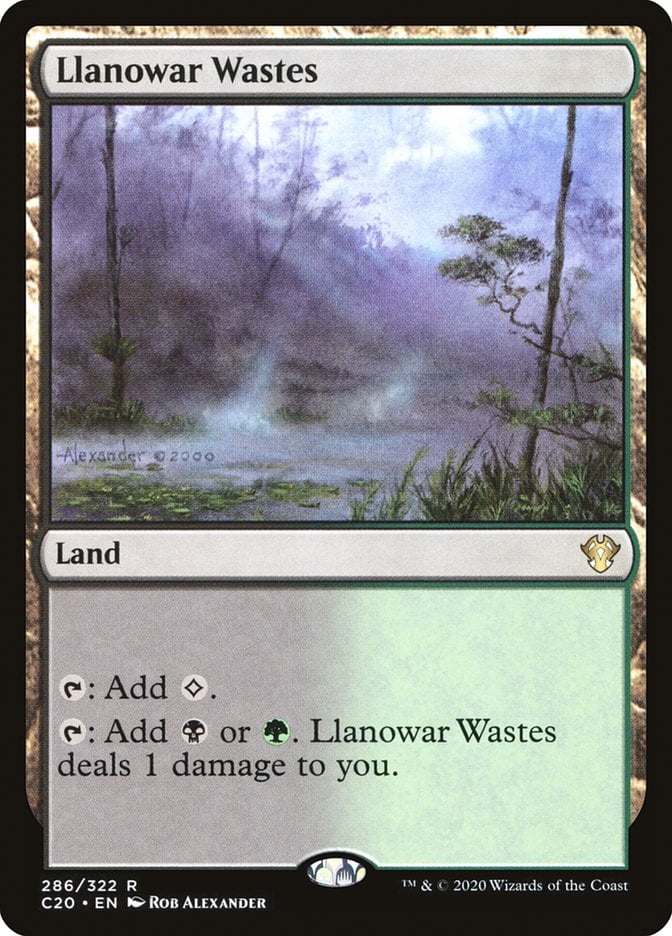
Lands that either sometimes or always cost life to produce mana. Example: Llanowar Wastes.
Scry Lands
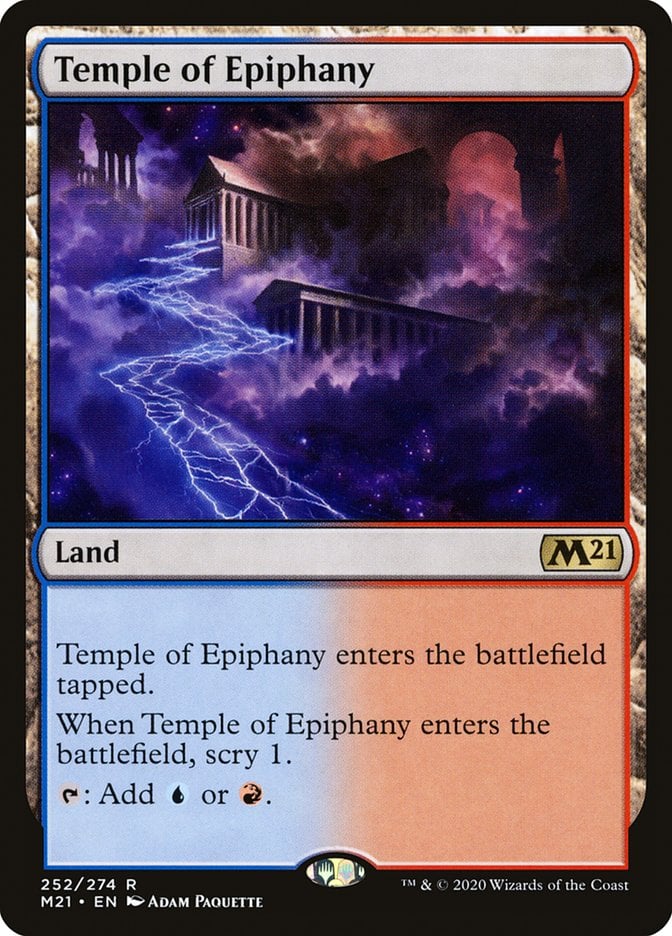
Dual lands that enter tapped and scry 1 on ETB, also called Temples. Example: Temple of Epiphany.
Shock Lands
Dual lands that have basic land types and enter untapped if you pay two life or “Shock” yourself. Example: Breeding Pool.
Tango Lands
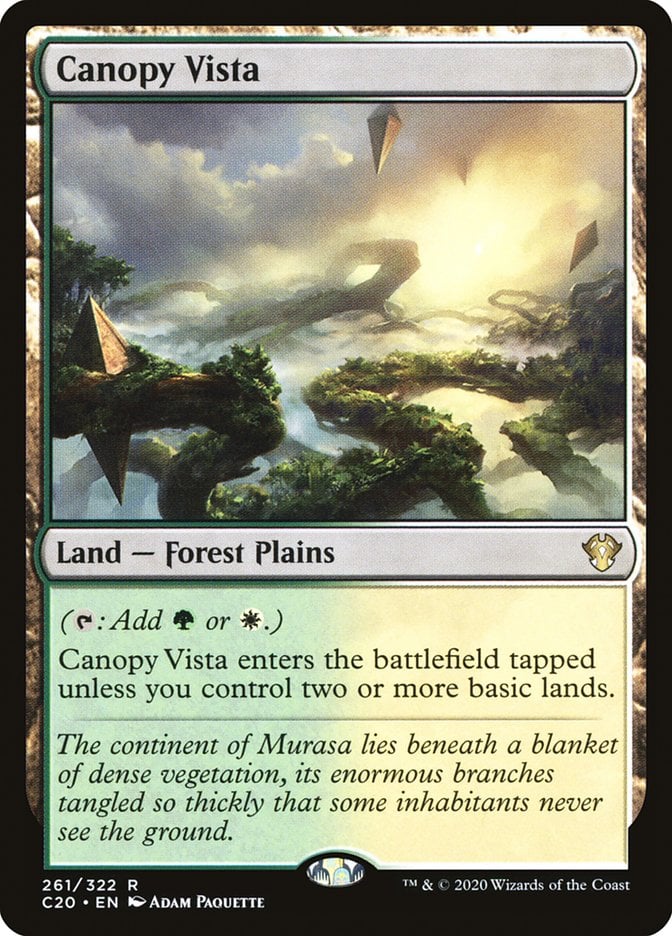
Dual lands that enter tapped unless you control two or more basics. As in, “it takes two to tango.” Example: Canopy Vista.
Triomes
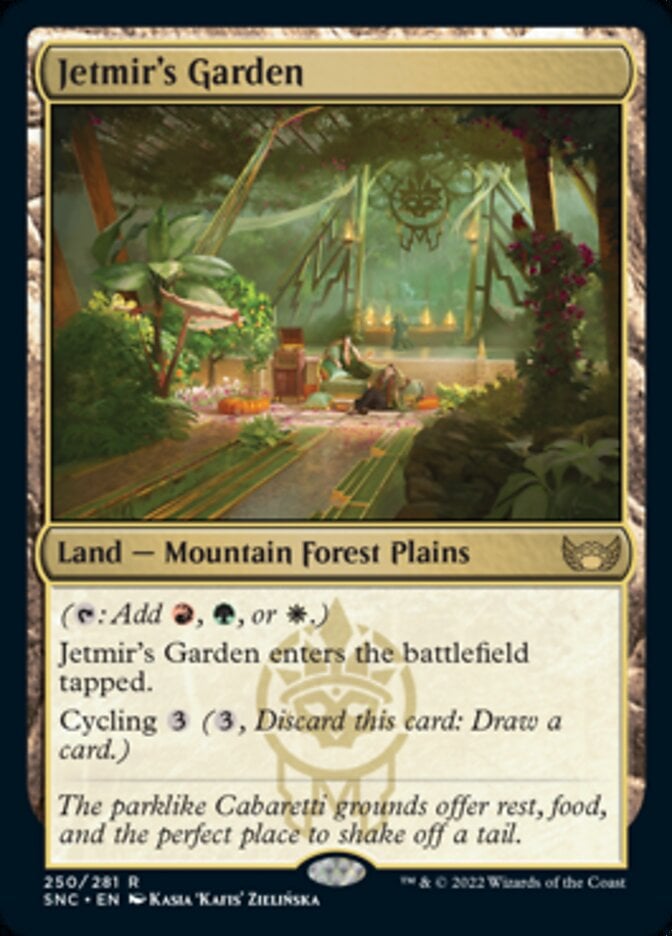
Tapped tri-lands with basic land types and cycling . Includes the tri-lands from Streets of New Capenna despite having a different naming convention. Example: Jetmir's Garden.
Specific Stat-Lines
Air Elemental
An Air Elemental is a 5-mana 4/4 with flying. Sometimes called a Serra Angel.
Grizzly Bear
Grizzly Bears, or just “bears”, are 2/2s for two mana. Some players also refer to 2/1s as bears.
Colossapede
A Colossapede is a 5-mana 5/5.
Flying Men
Flying Men are 1-mana 1/1s with flying.
Goblin Piker
A Goblin Piker is a 2-mana 2/1.
Grey Ogre
A Gray Ogre is a 3-mana 2/2.
Hill Giant
A Hill Giant is a 4-mana 3/3.
Phantom Monster
A Phantom Monster is a 4-mana 3/3 with flying.
Savannah Lion
Savannah Lions are 1-mana 2/1s.
Watchwolf
A Watchwolf is a 2-mana 3/3.
Wind Drake
A Wind Drake is a 3-mana 2/2 with flying.
Common Abbreviations
AP-NAP
Active Player – Non-Active Player, the order in which triggers go on the stack.
BOP
CMC
Converted Mana Cost, now known as mana value.
CoCo
EDH
Elder Dragon Highlander, renamed Commander by Wizards of the Coast.
EOT
End Of Turn.
ETB
Enter(s) the Battlefield, usually referencing a permanent’s triggered ability.
FNM
Friday Night Magic.
LGS
Local Game Store.
LTB
Leaves the Battlefield.
MDFC
Modal Double-Faced Card.
MTGA
Magic: The Gathering Arena.
MTGO/MODO
Magic: The Gathering Online. MODO stands for “Magic Online with Digital Objects,” the original name for the software.
RDW
Red Deck Wins, a style of all-in aggressive red deck.
RNG
Random Number Generator. “Good RNG” means randomness worked out in your favor.
WOTC
Wizards Of the Coast.
WUBRG
White/Blue/Black/Red/Green, the colors of Magic in order. Pronounced “woo-berg.”
Personalities/Psychographic Profiles
Johnny/Jenny
Motivated by combos and elaborate combinations of cards. Cares about winning in interesting ways.
Spike
Motivated entirely by winning. Highly competitive and only interested in top-tier cards and decks.
Timmy/Tammy
Motivated by exciting, expensive spells, usually large creatures and inefficient but splashy effects. Cares more about experience than winning.
Melvin/Mel
Motivated by mechanical intricacies and small card design nuances. Interested in building high-synergy engine-like decks.
Vorthos
Motivated by flavor and creative storytelling. Not heavily motivated by winning, but rather illustrating a creative theme or story with their cards.
Slang Terms from Poker
Bad Beat
A situation or play that didn’t go in your favor.
Bluffing
Telegraphing that you have something in your hand that you actually don’t. Bluffs in Magic usually involve combat tricks.
Brick
A card that doesn’t do anything useful. A “miss” or “whiff.”
Grinding
Playing for long periods of time.
In the Tank/Tanking
Thinking very hard about a play.
Slowroll/Sandbag
Delaying winning the game despite having the means to do so.
“The Nuts”
An incredible opening hand, also called a “nut draw” or “godhand.”
Tilting
Becoming aggravated, sometimes visibly.
The Grind Is Over
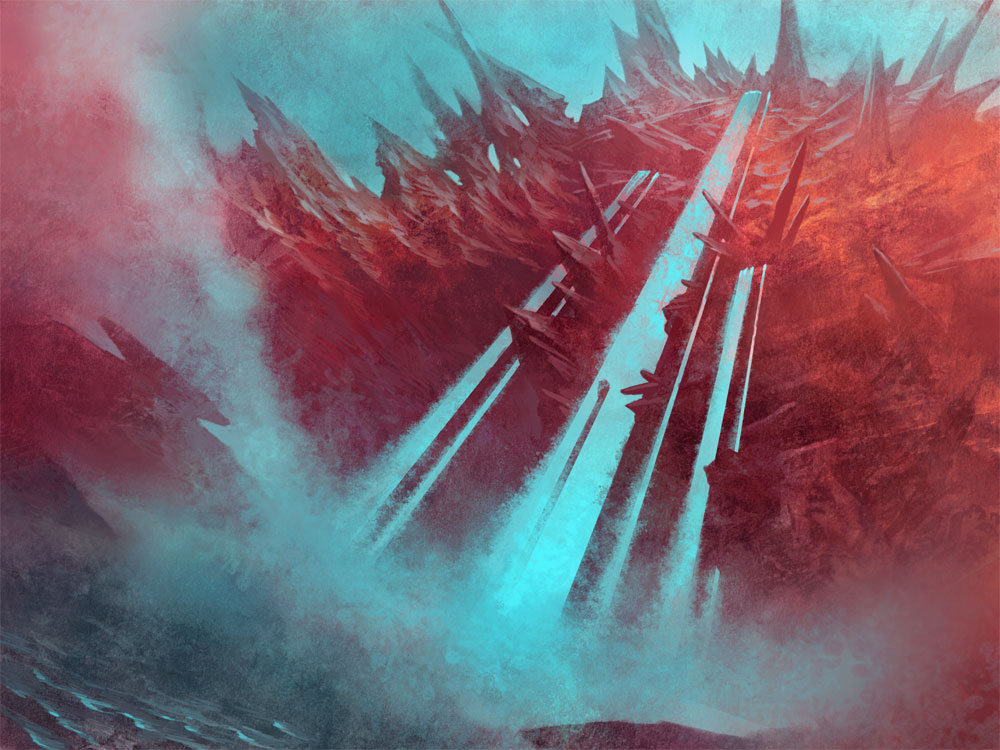
Cascade Bluffs | Illustration by Brandon Kitkouski
That’s a wrap. Surely almost everything you need to get your new Magic friends up to speed to start joining the conversation instead of looking at you like you’re speaking a foreign language.
I’m sure there’s plenty of other slang out there that slipped through the cracks. Let us know about any terms, deck names, card nicknames, or anything else that wasn’t included in the comments below or over in the Draftsim Discord!
Thank you for making Draftsim your #1 stop for all things Magic!
Follow Draftsim for awesome articles and set updates: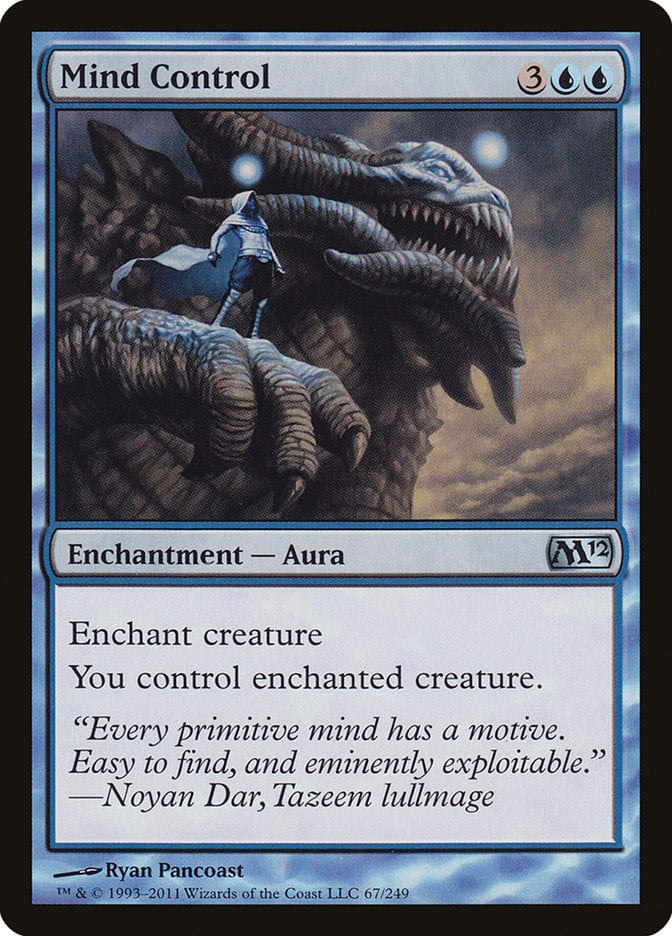
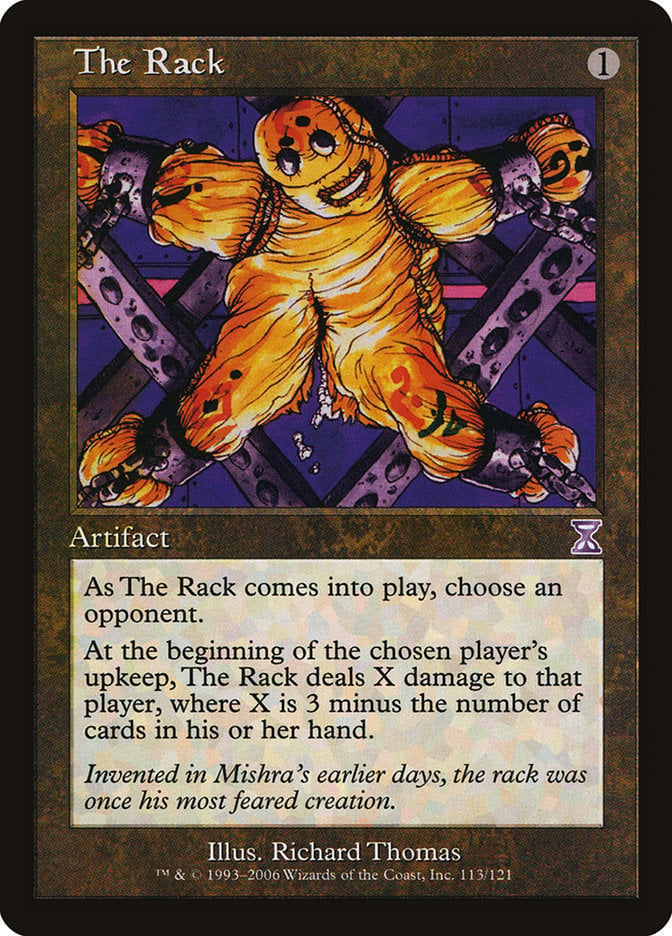
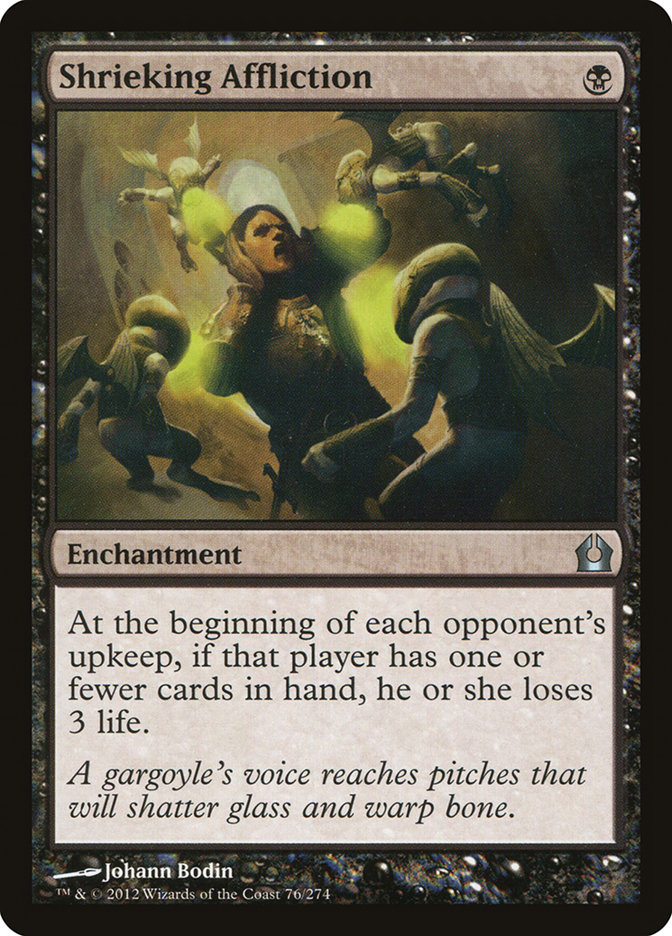
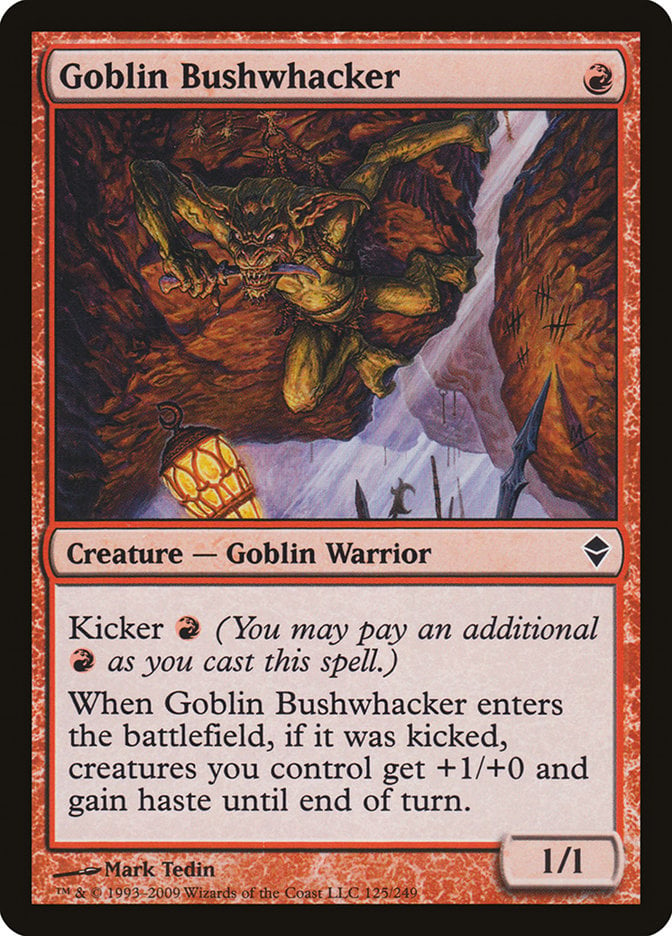
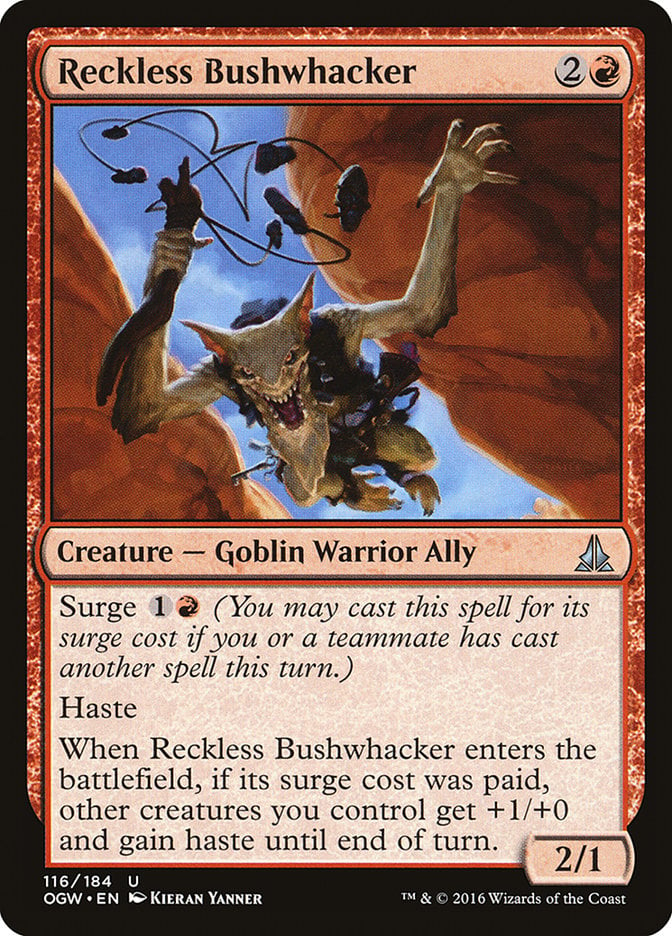
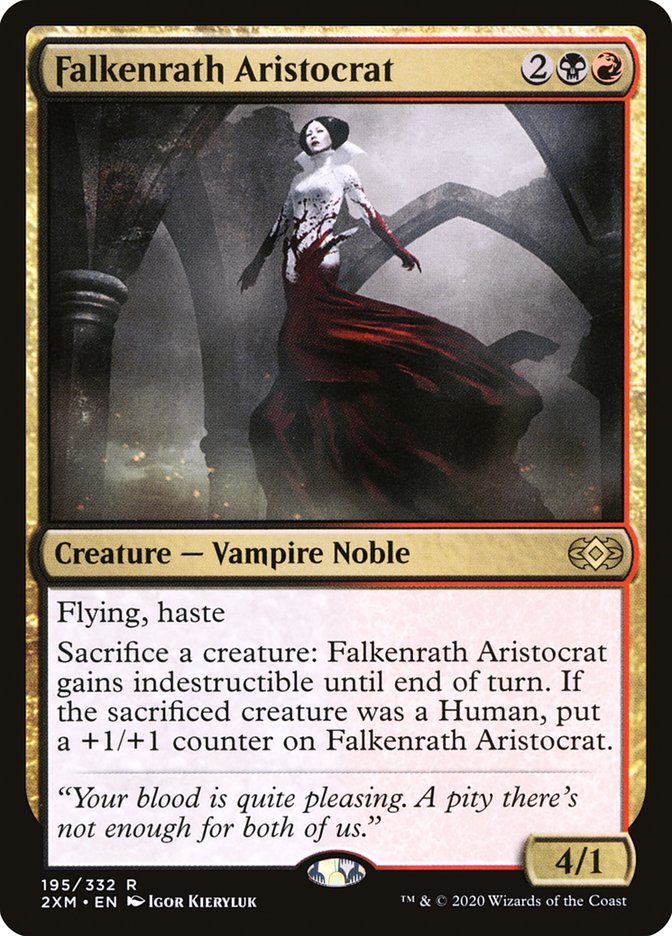
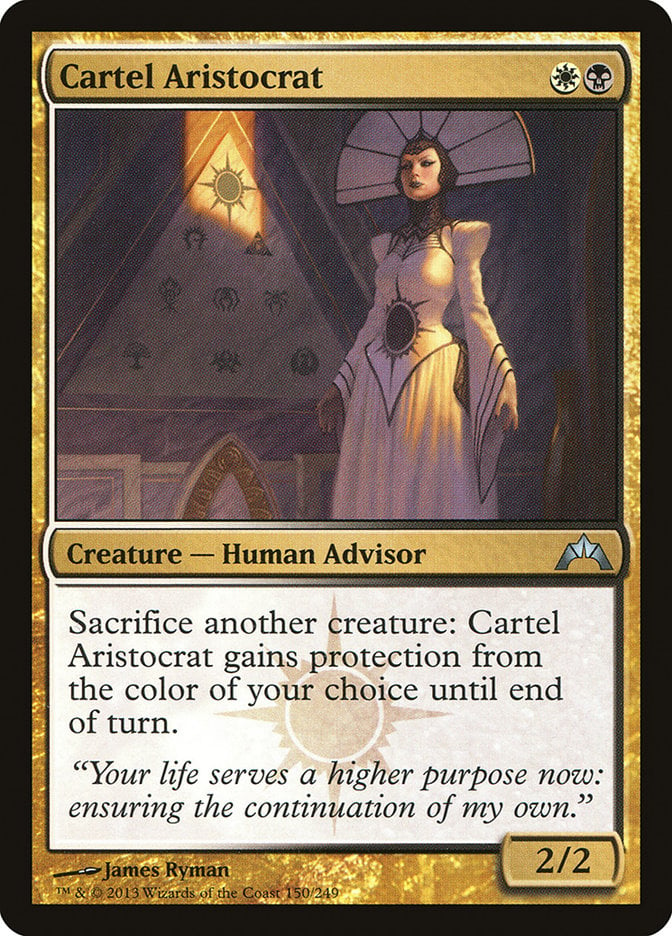
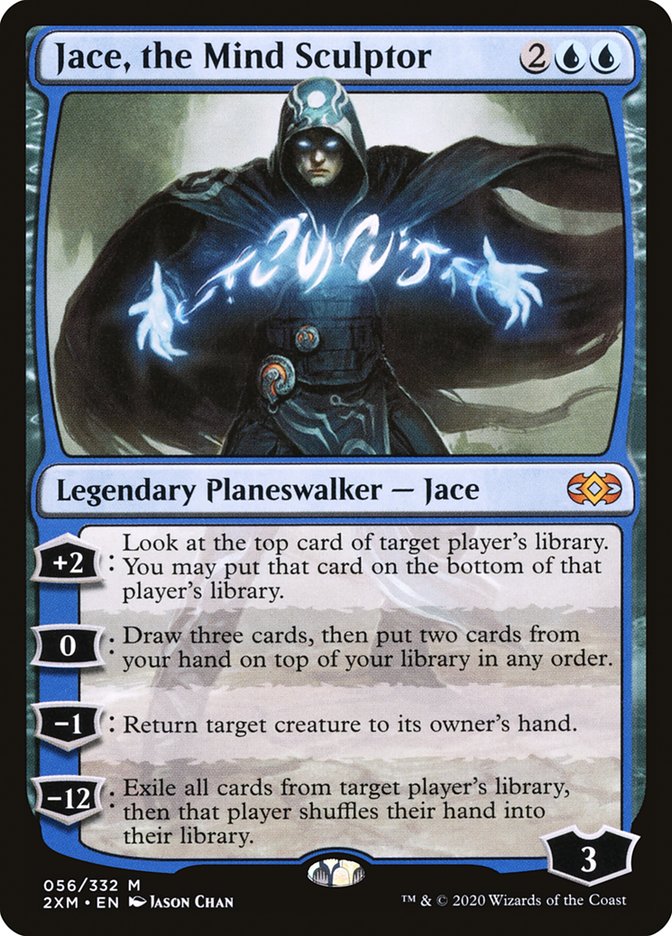
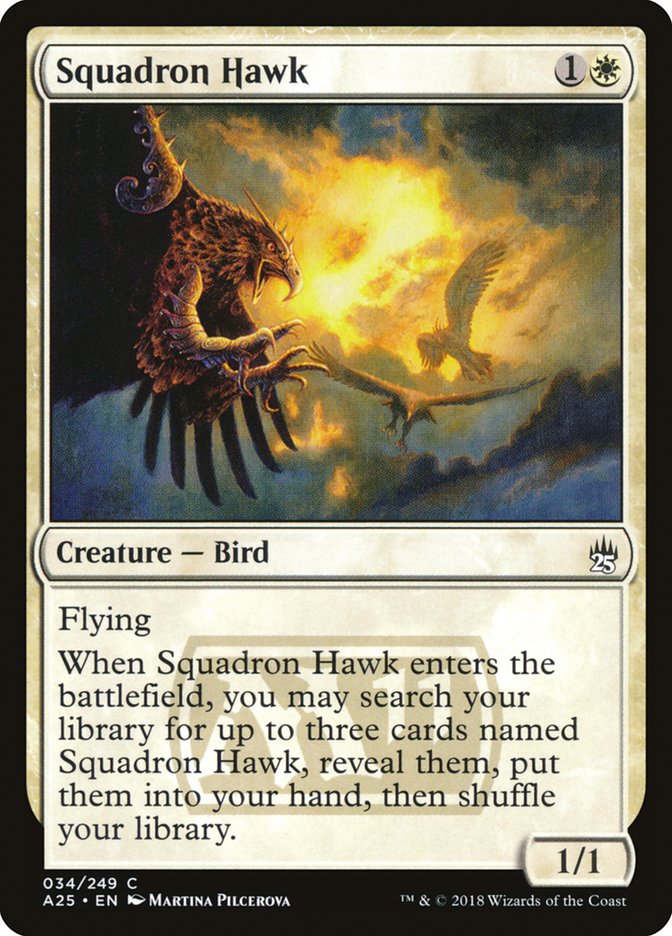
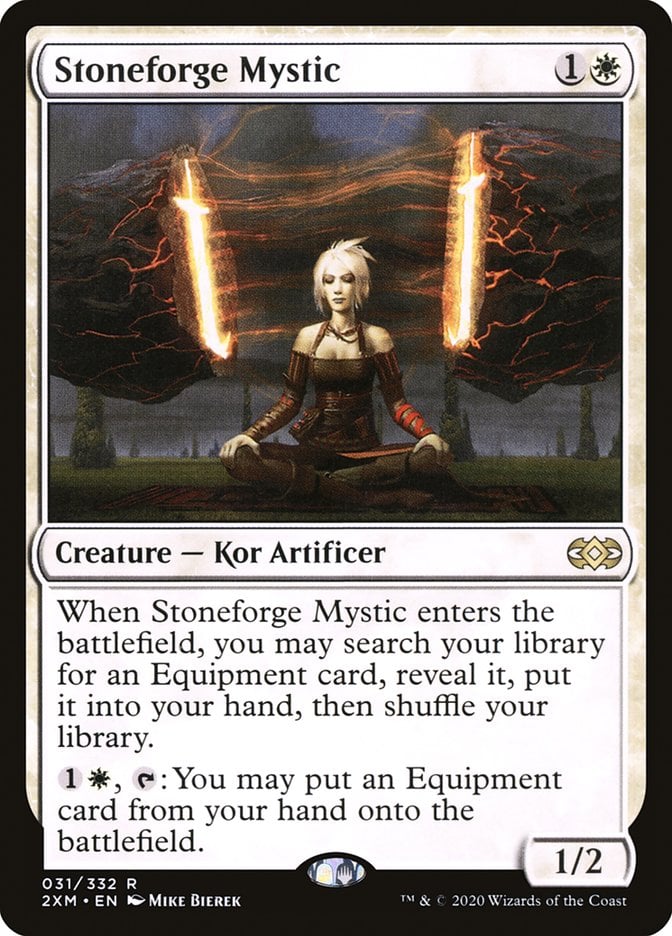
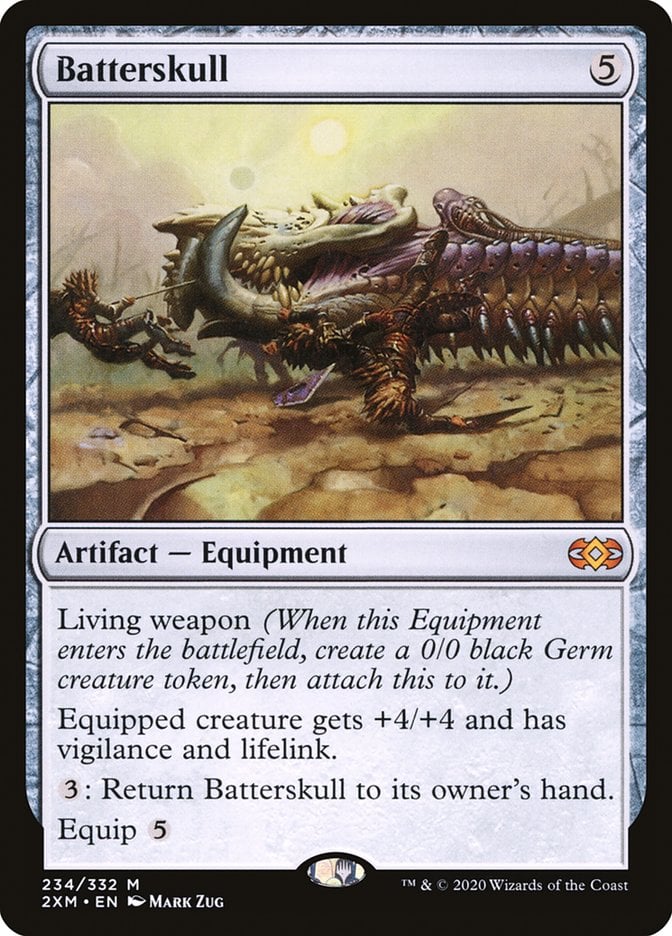
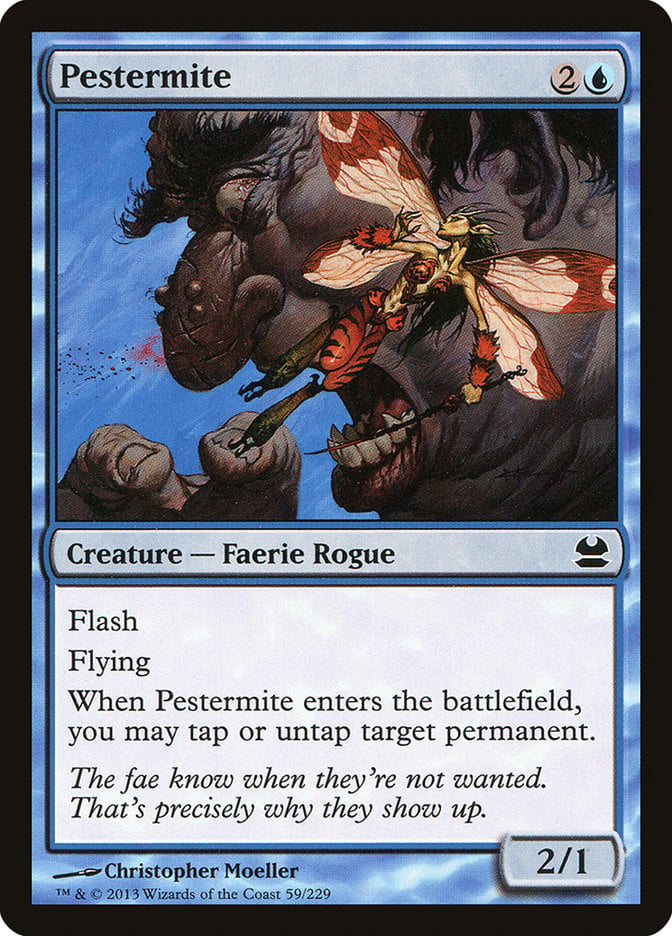
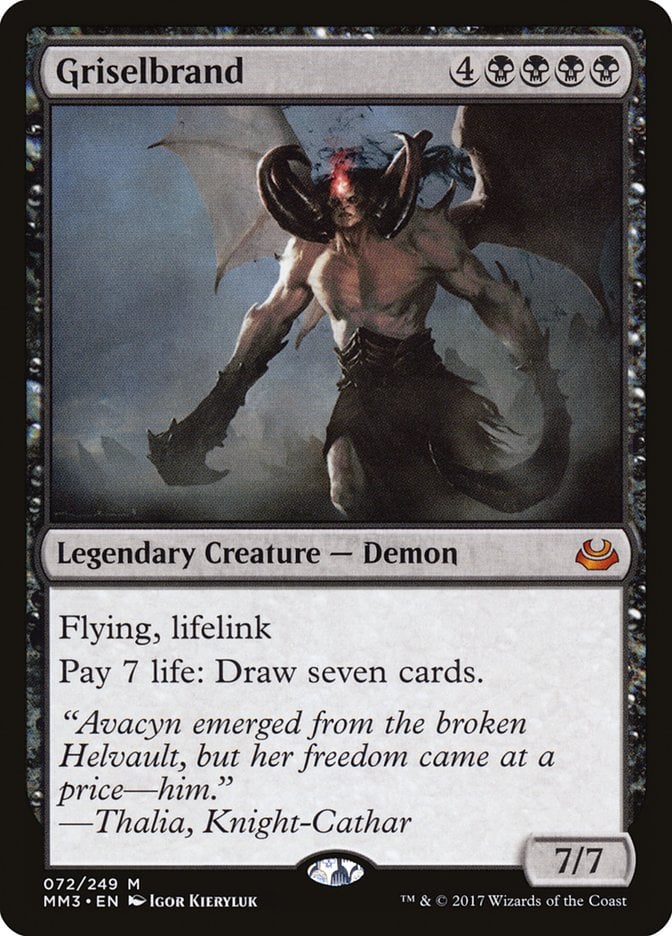
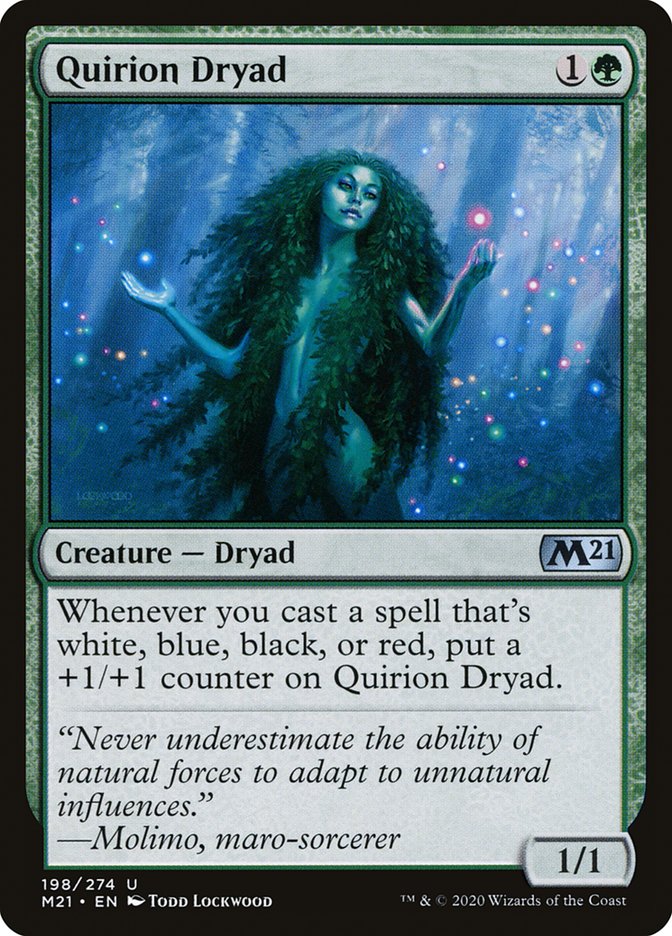
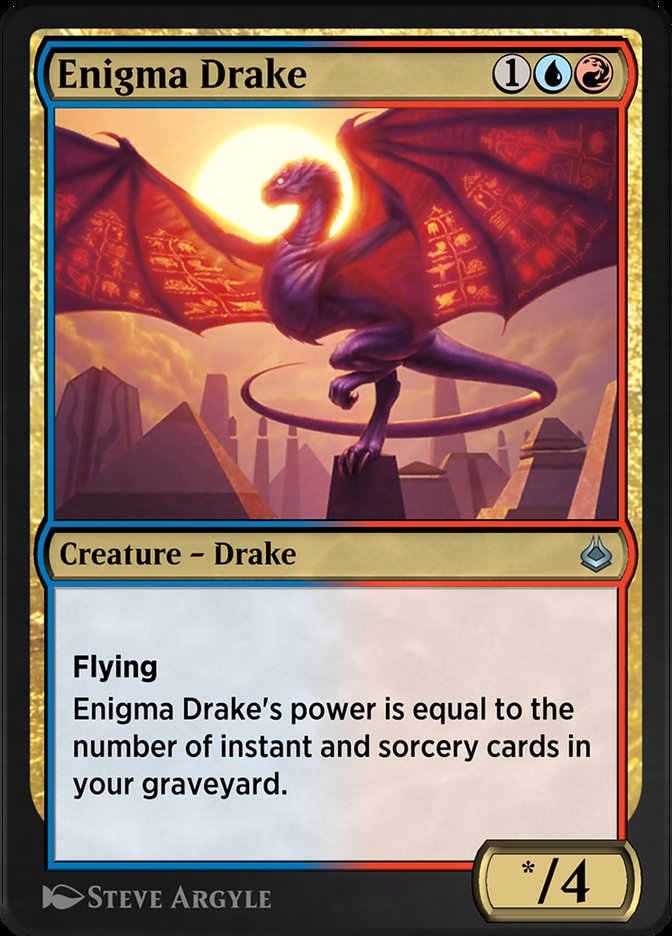
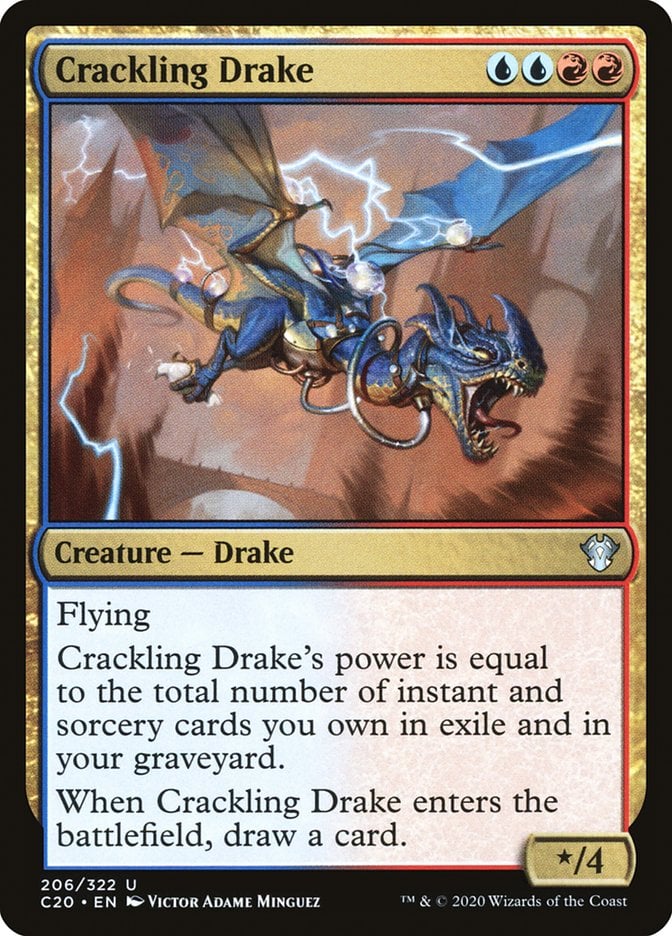
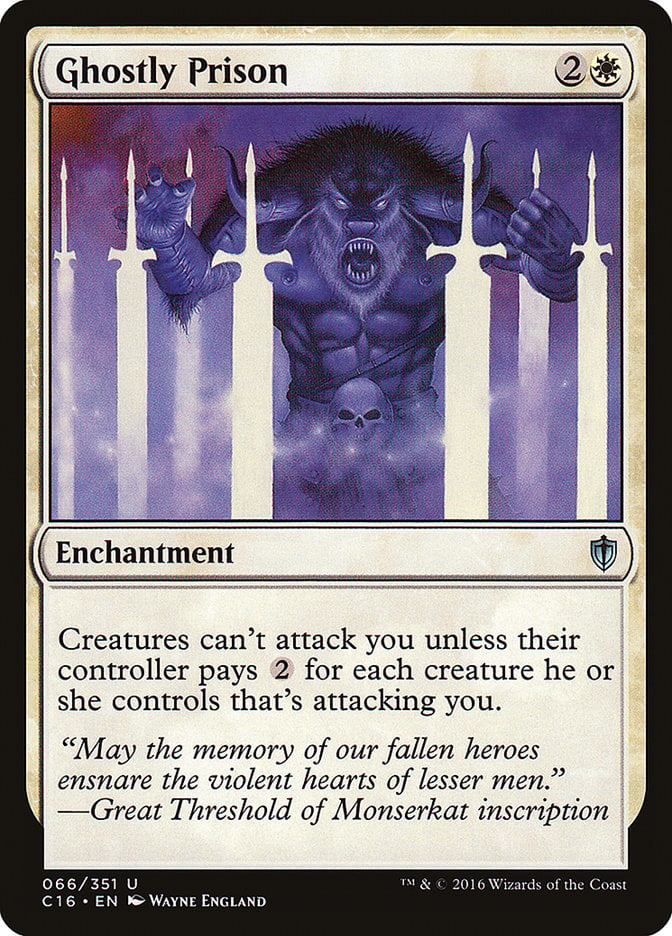
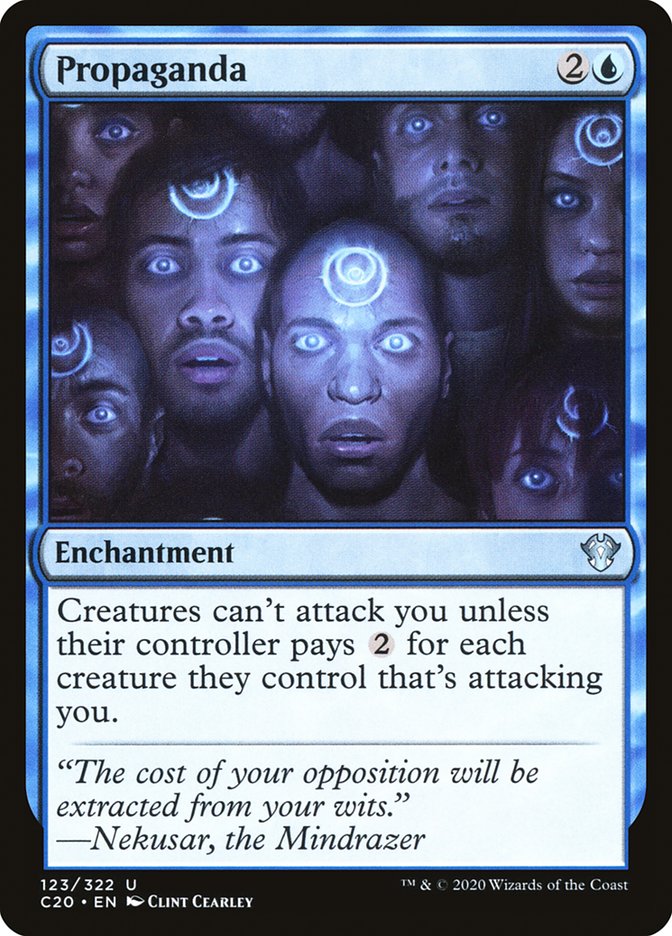
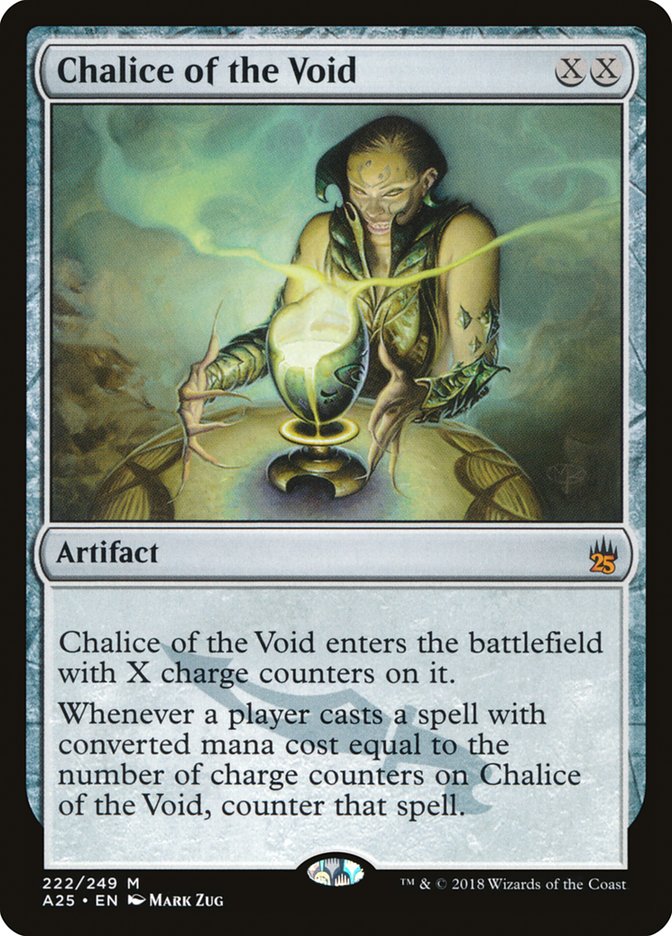
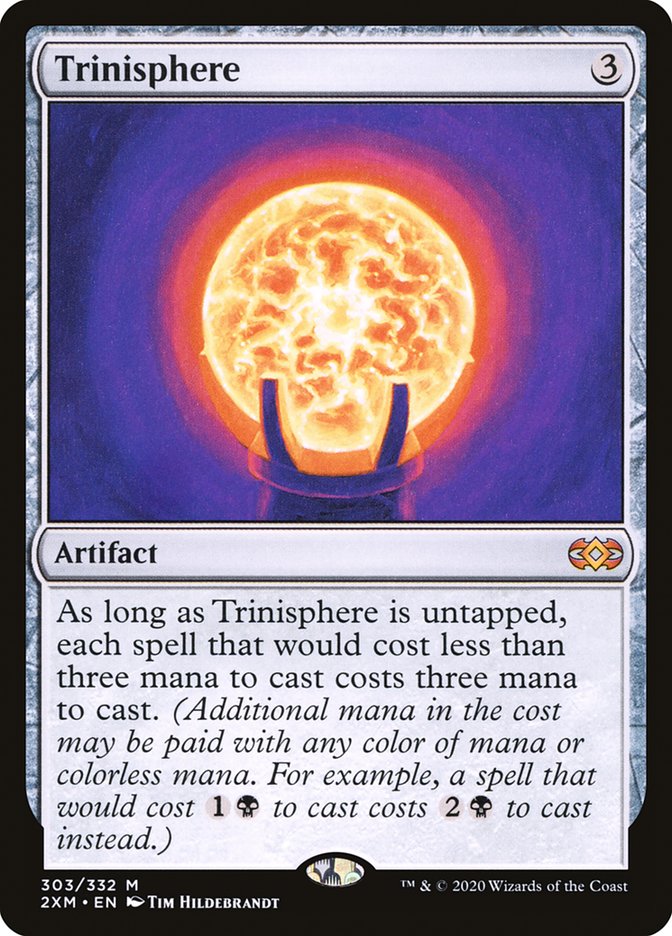
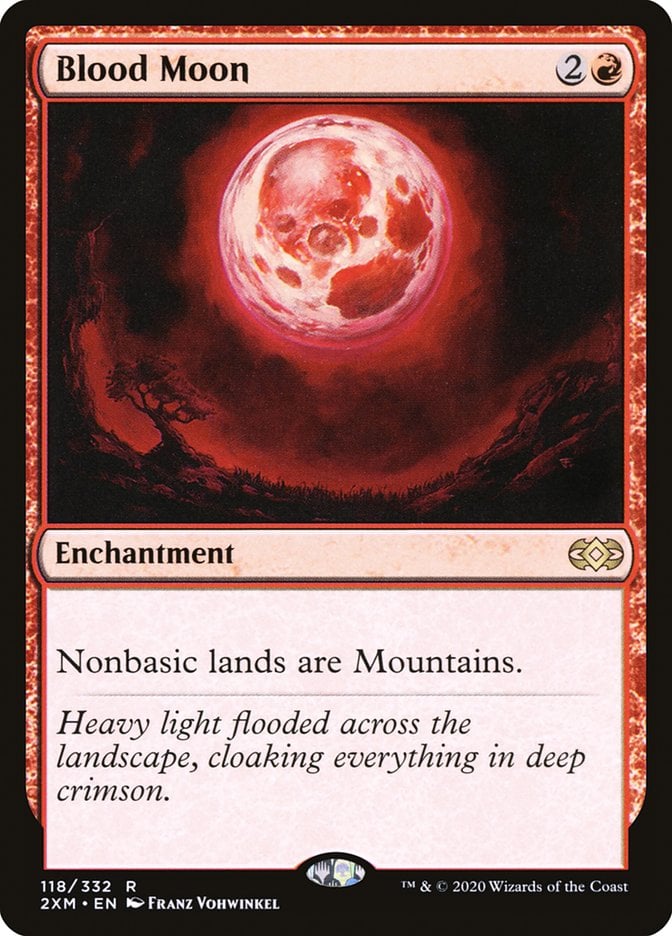
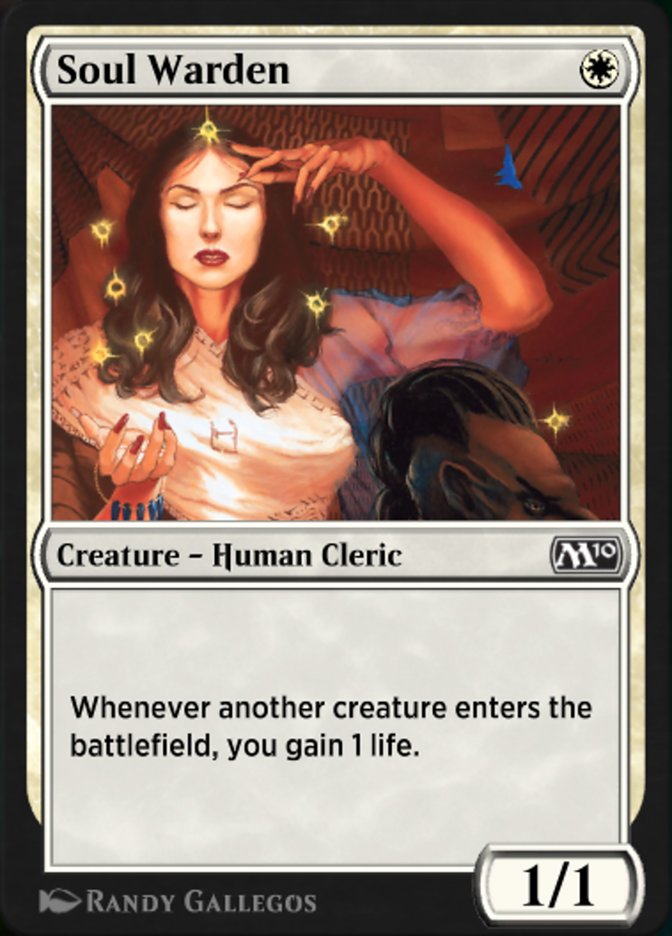
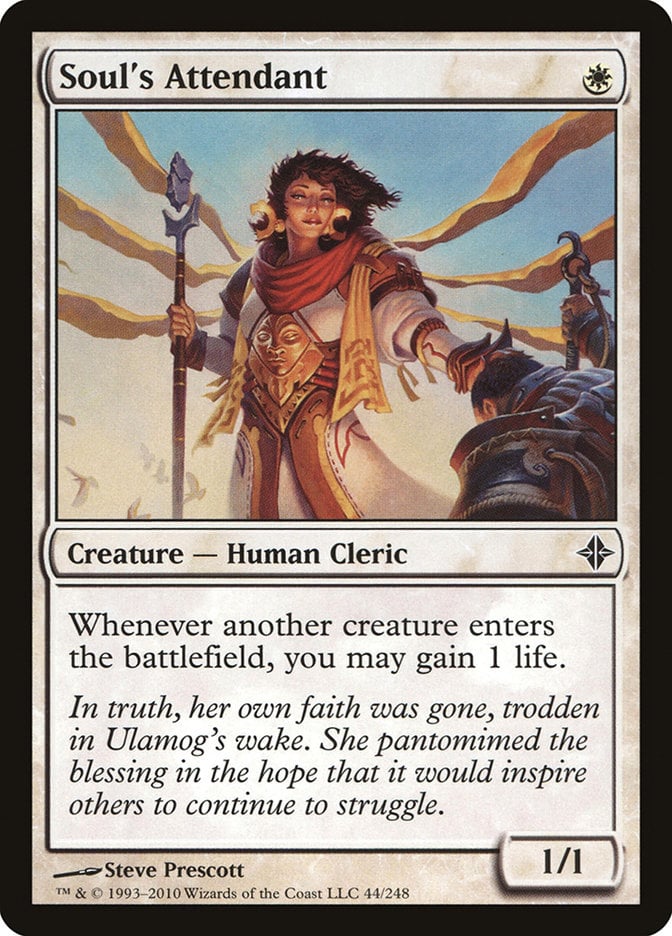
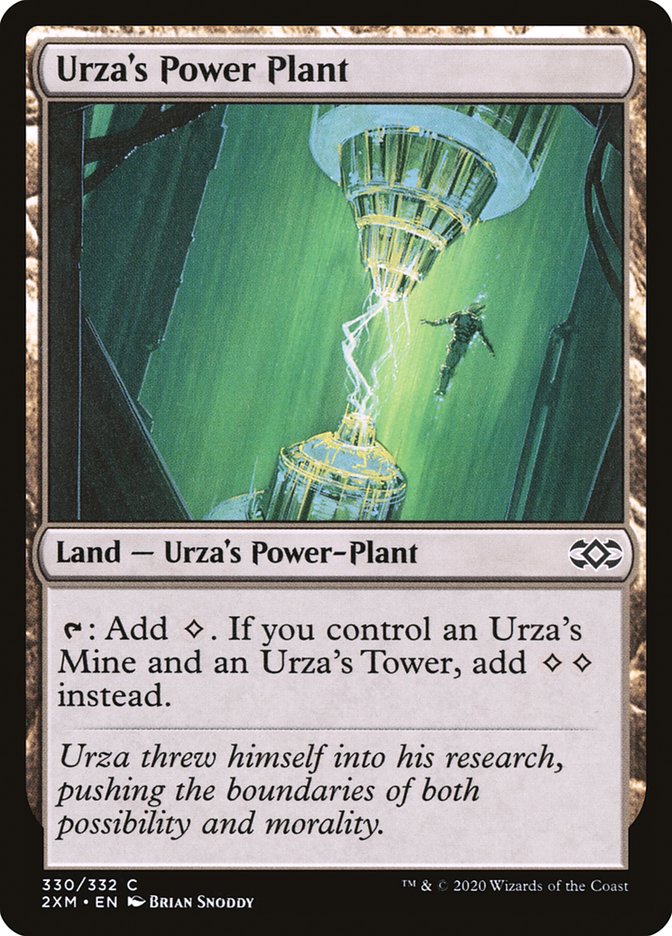
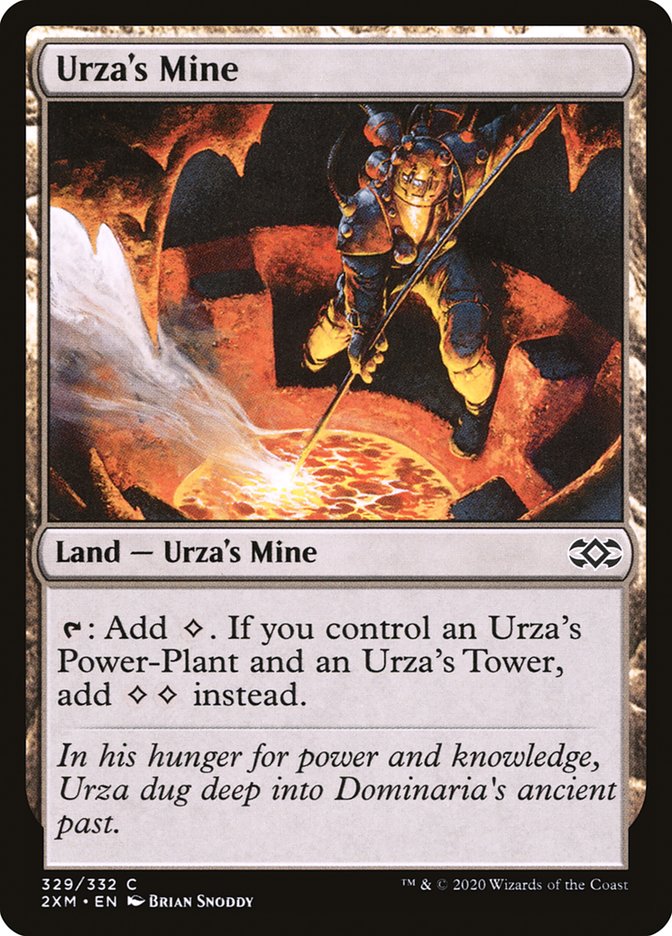
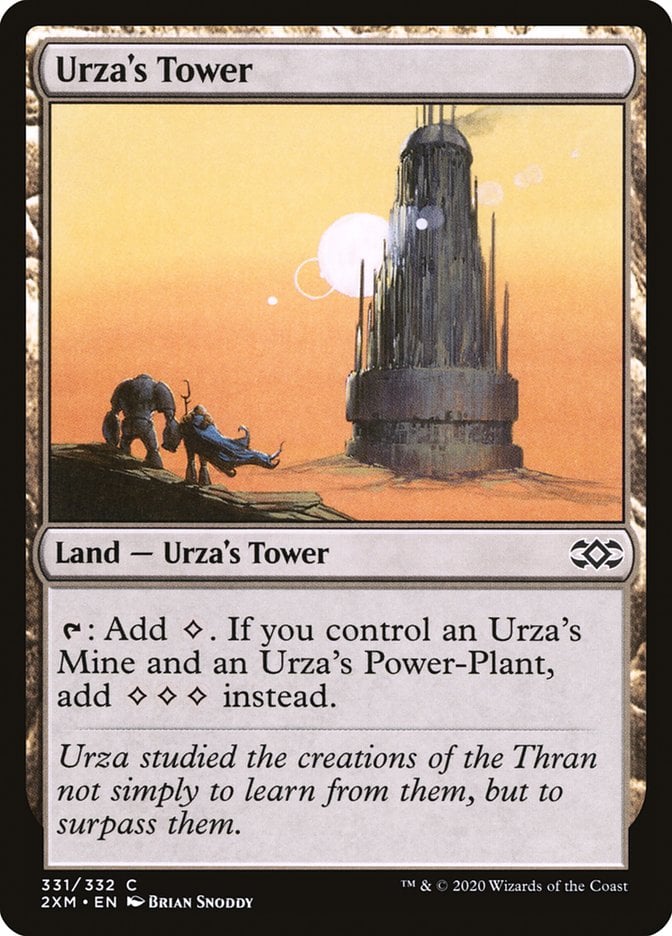
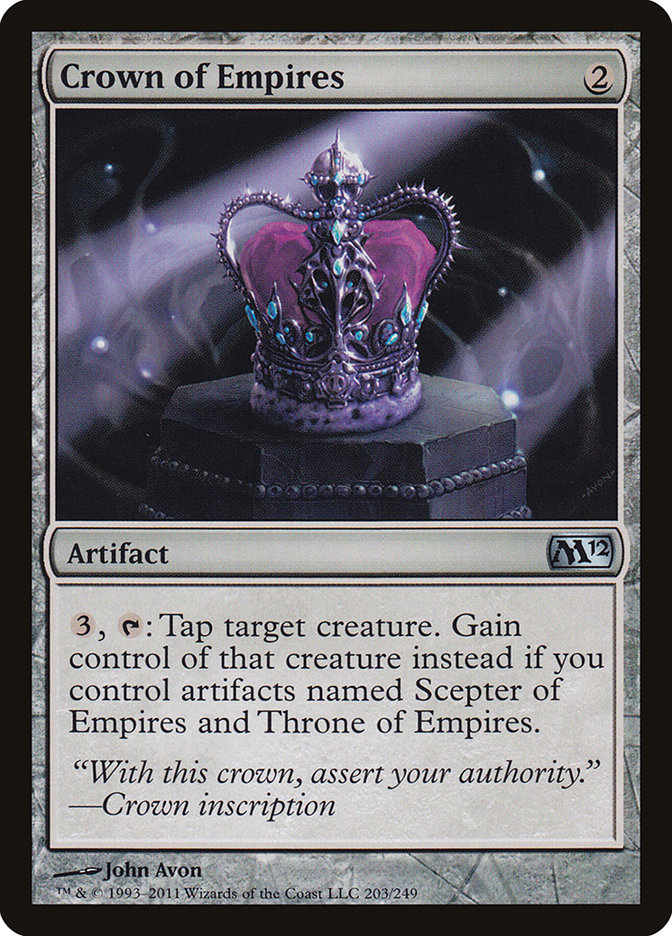
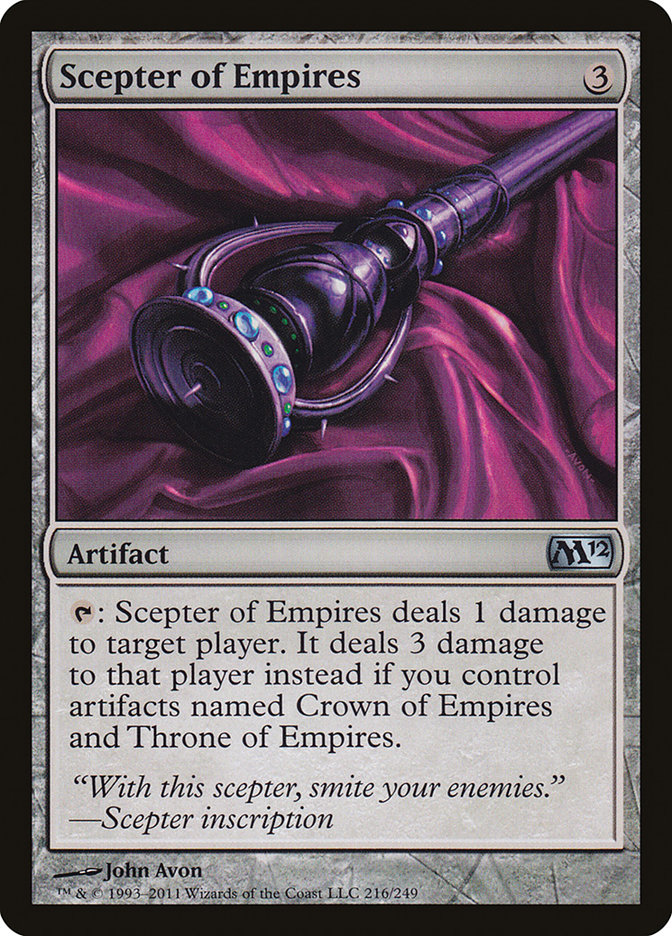
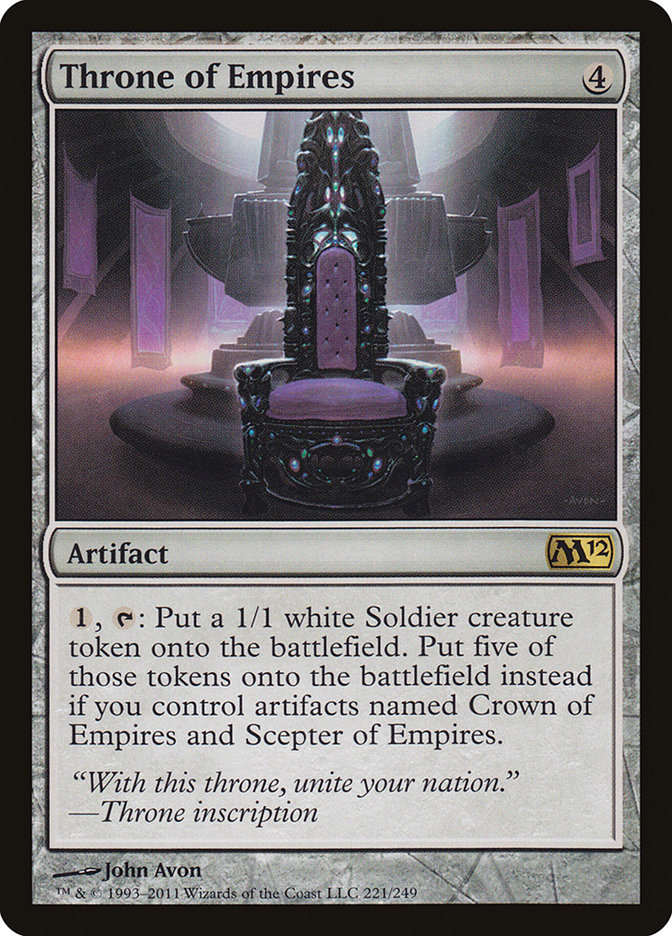
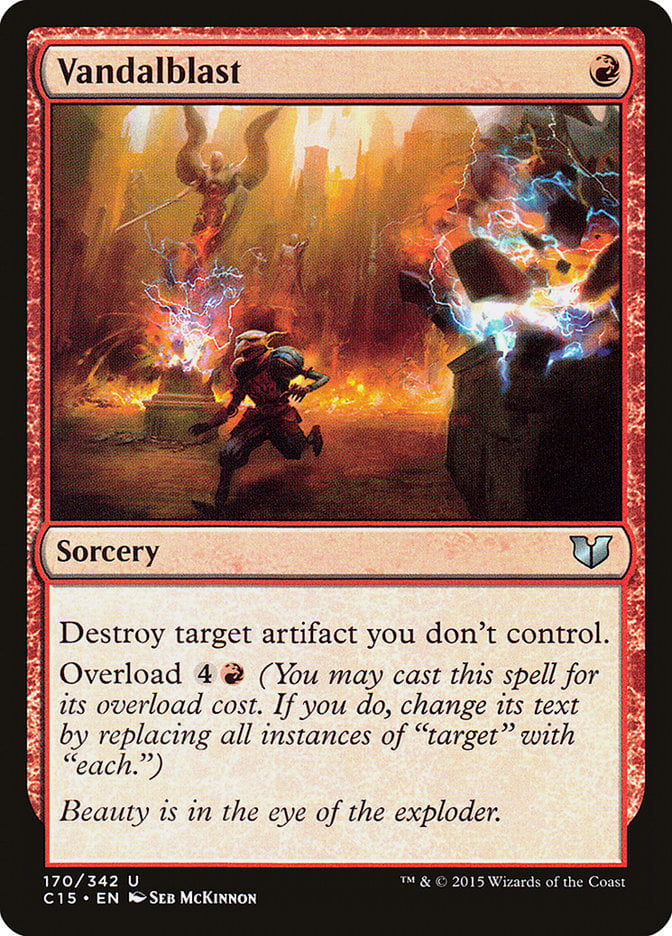
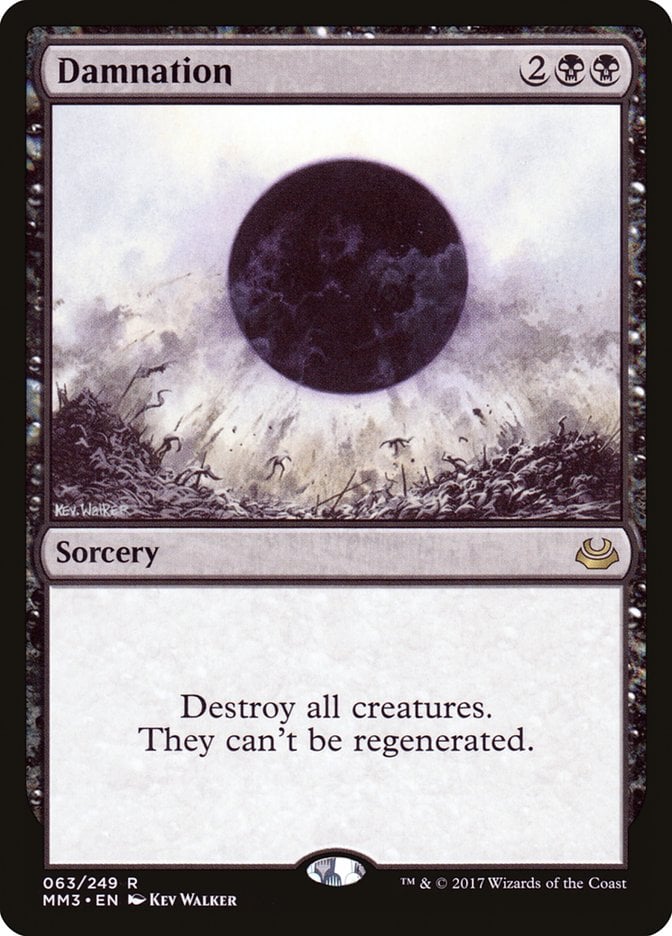
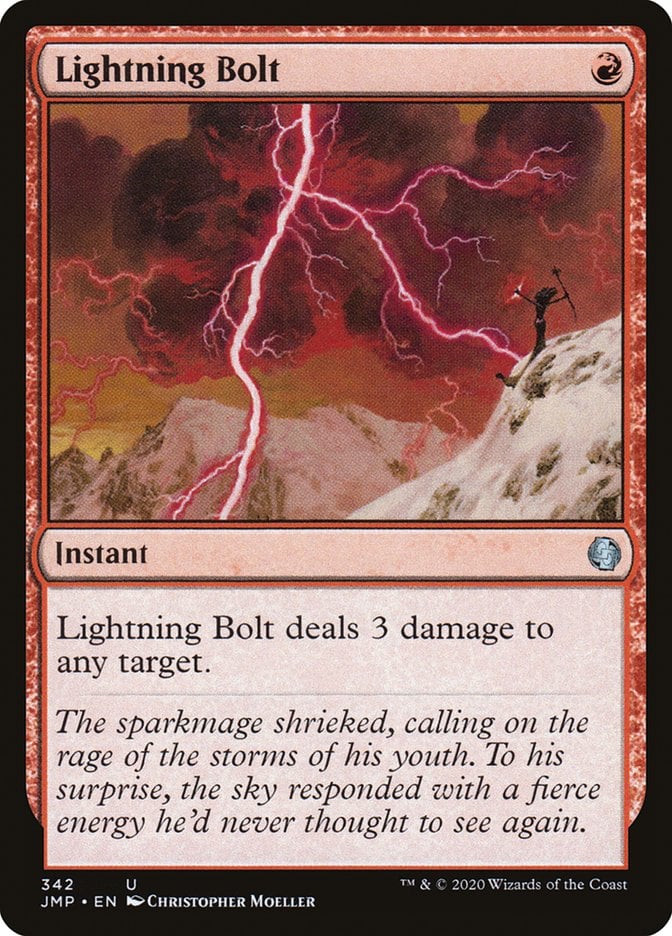
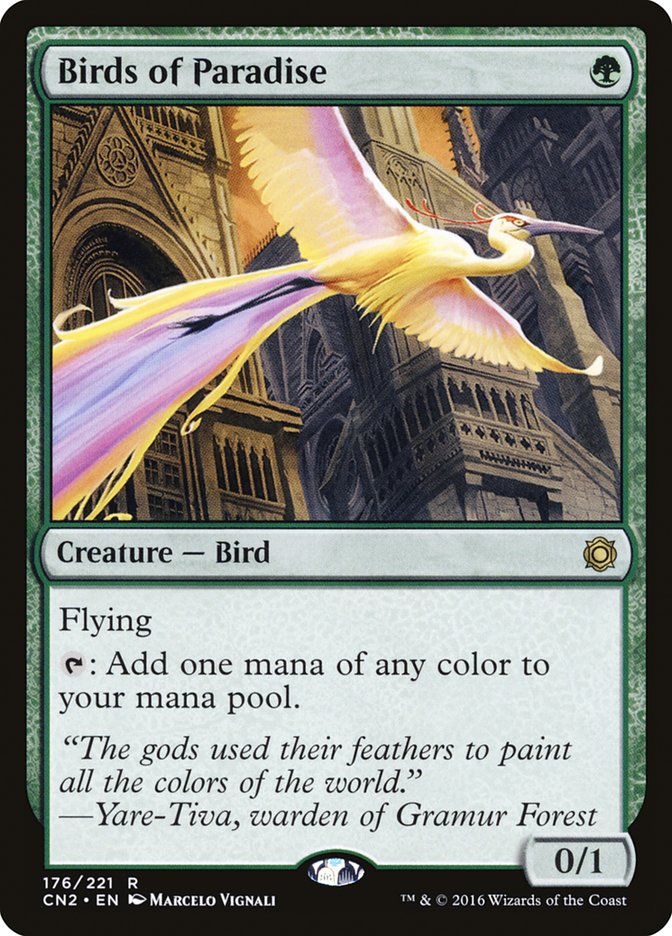
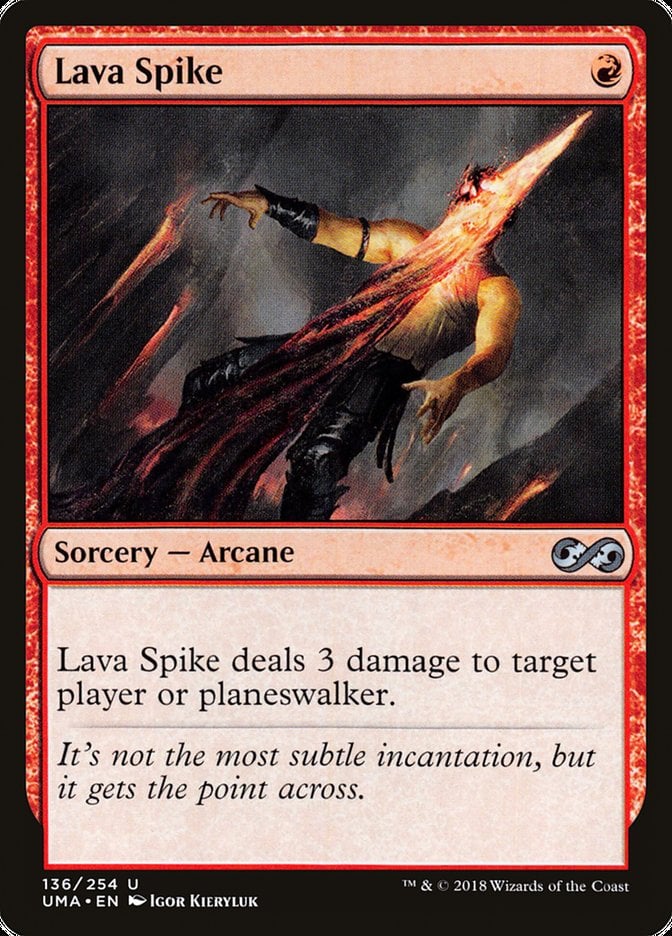
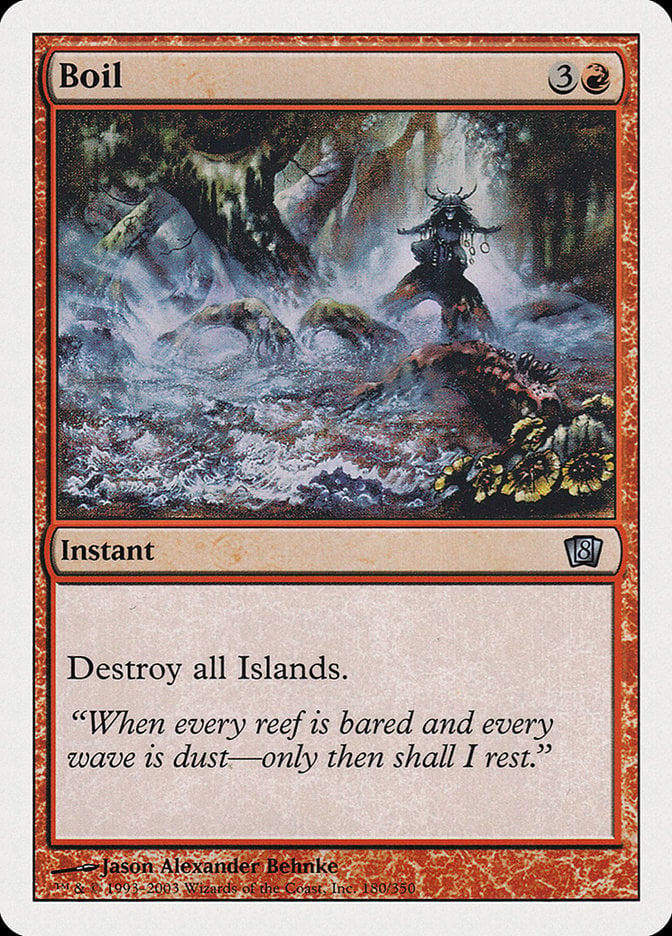
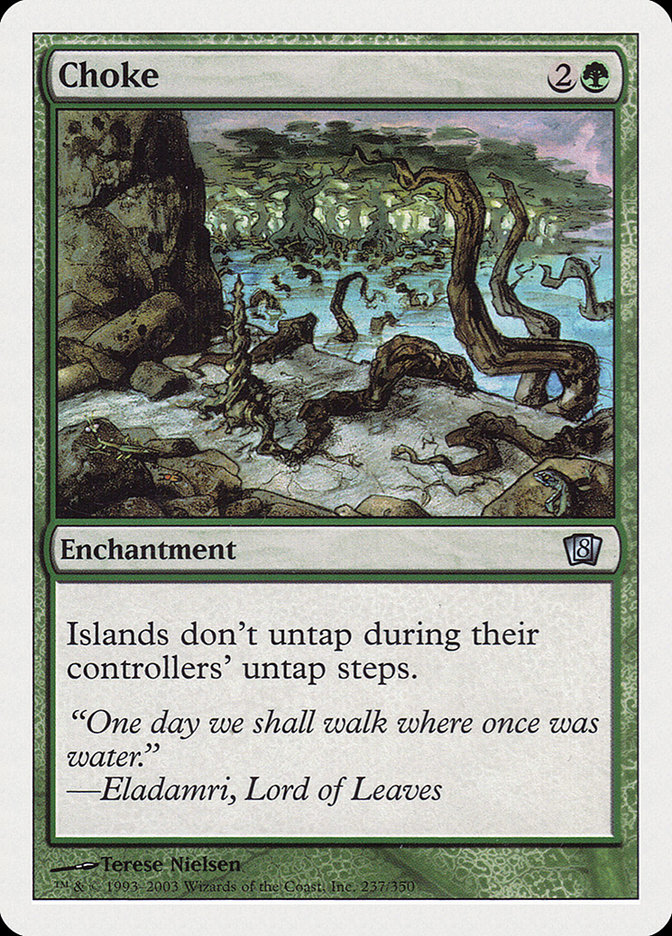
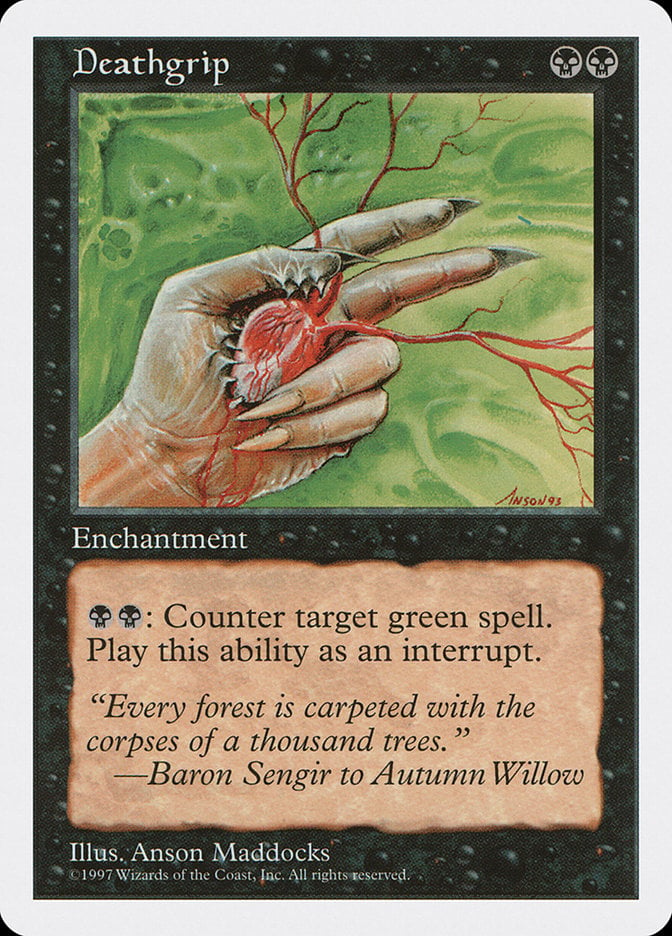
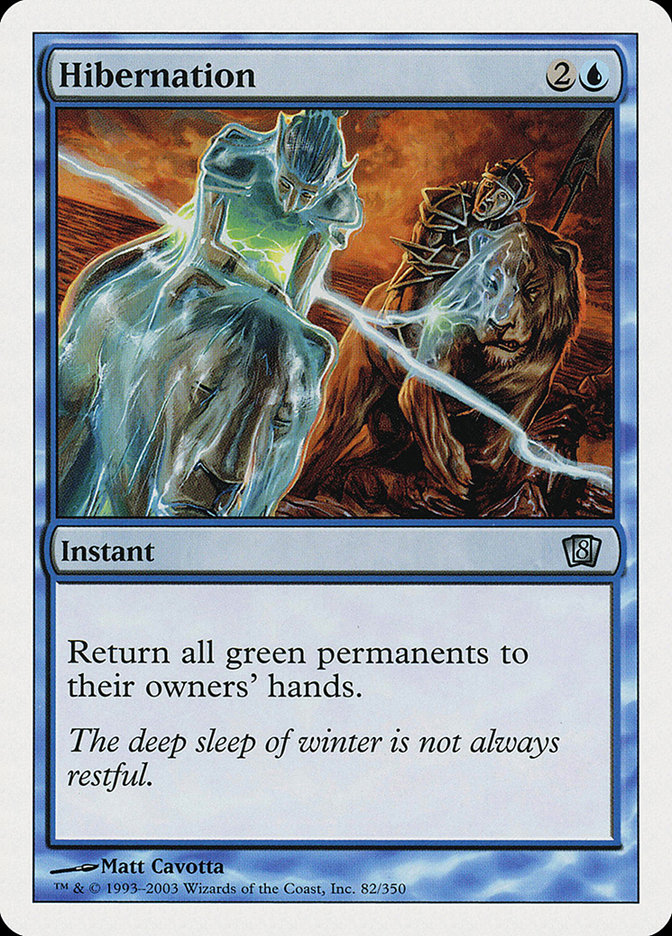
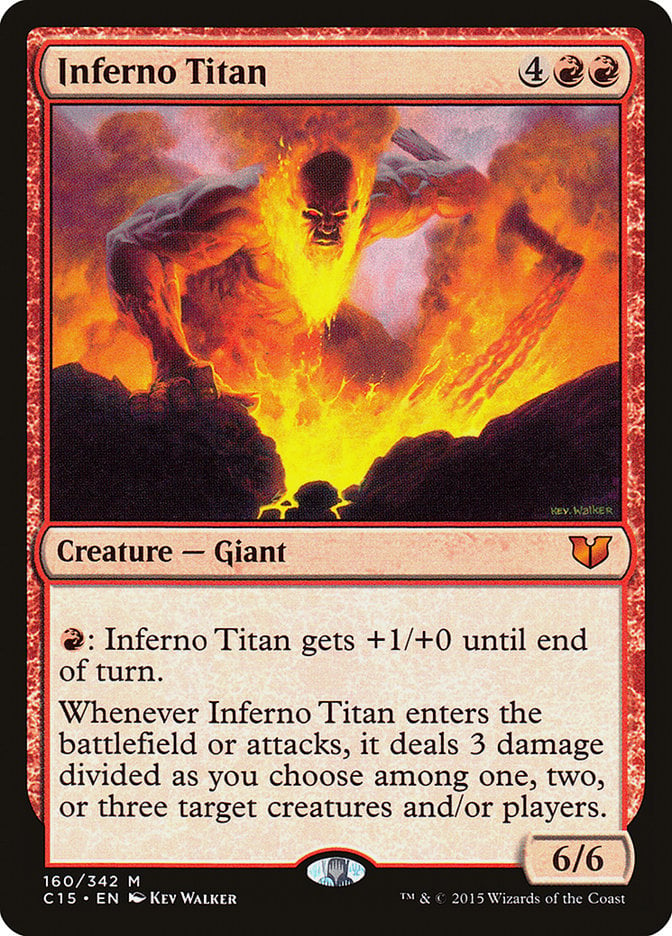
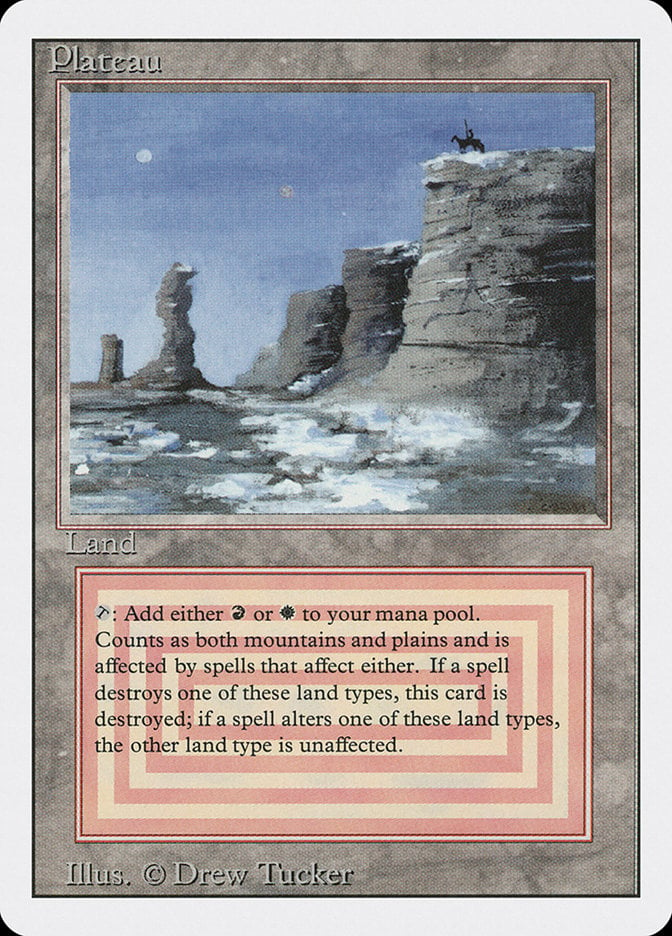
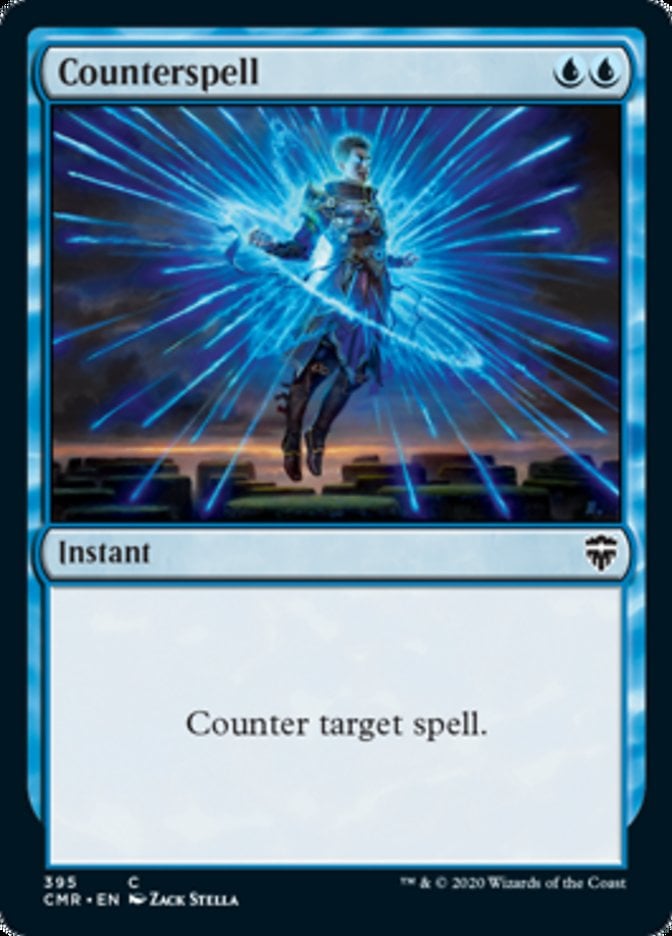
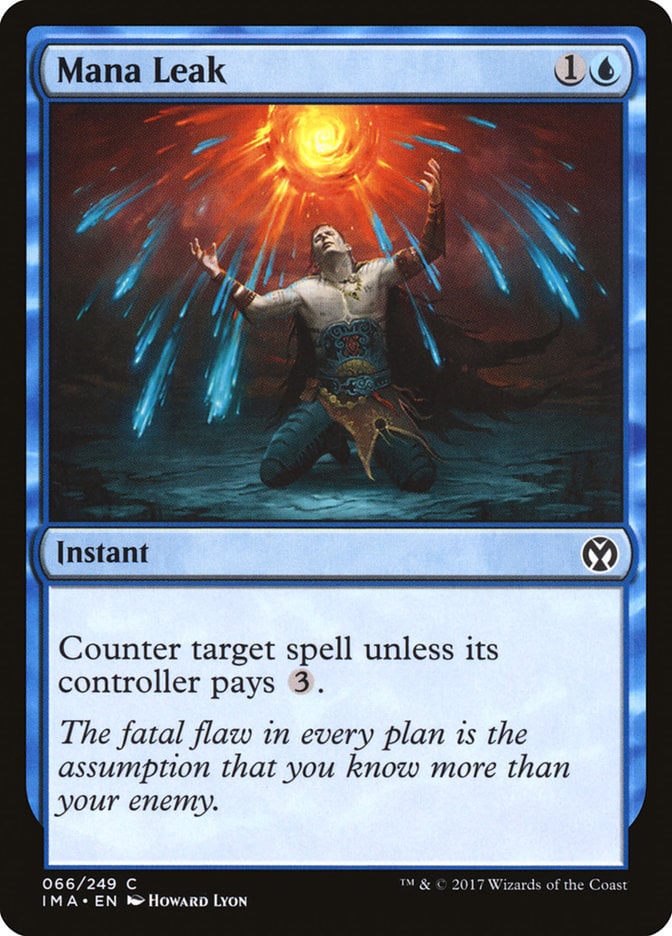
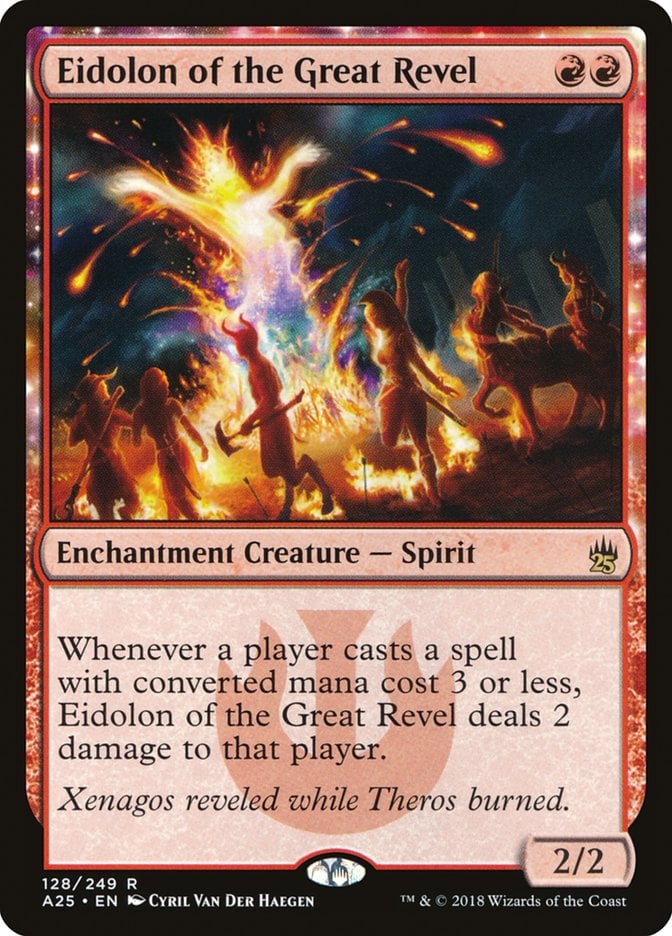
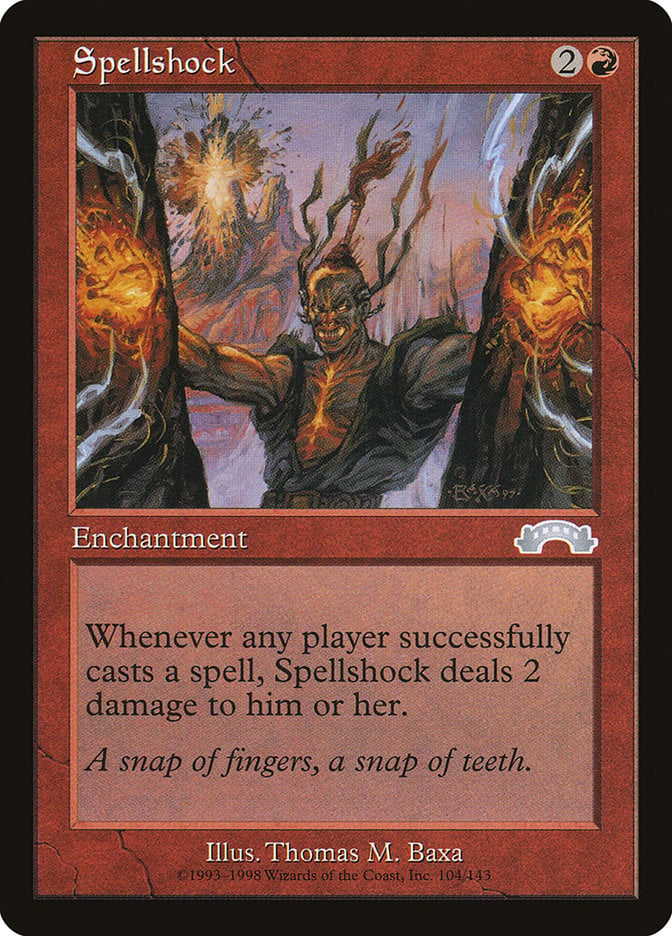
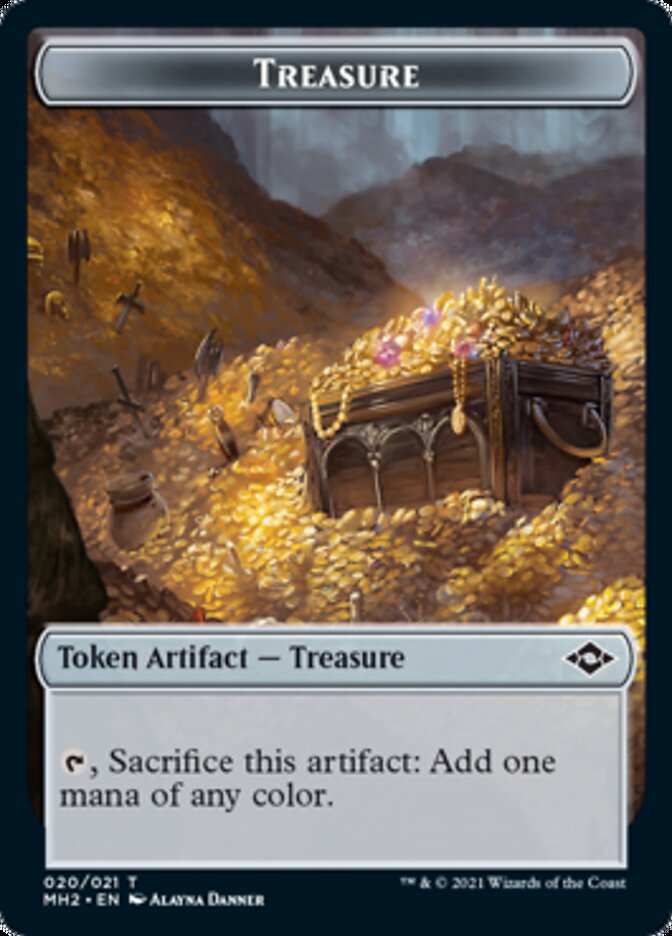
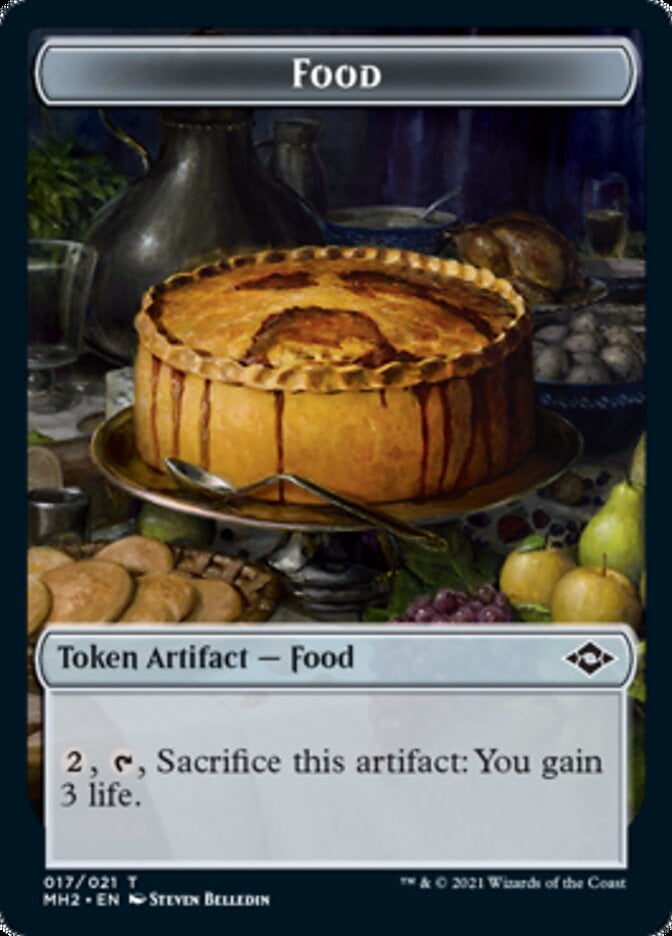
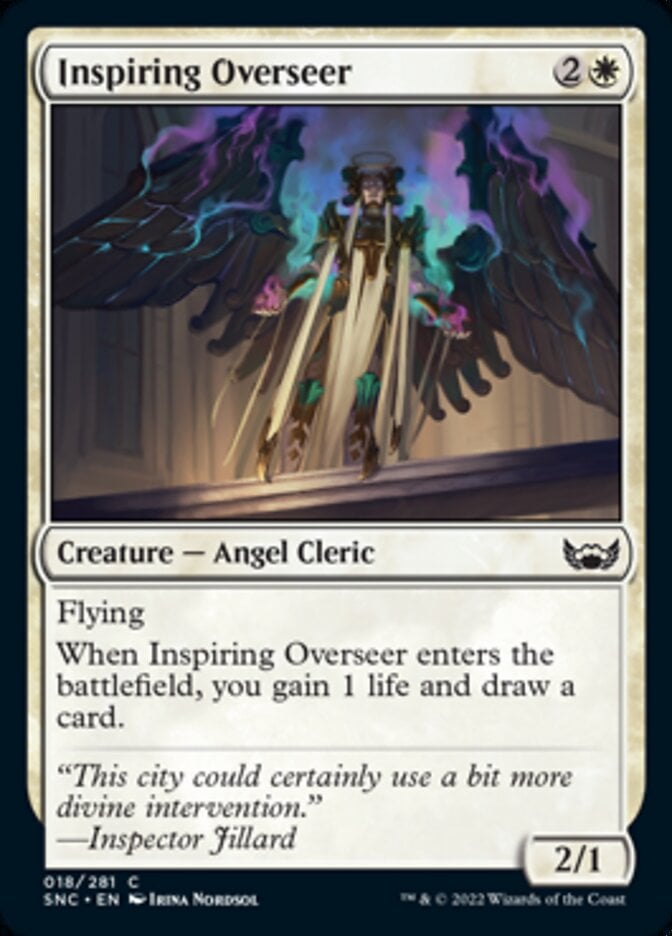
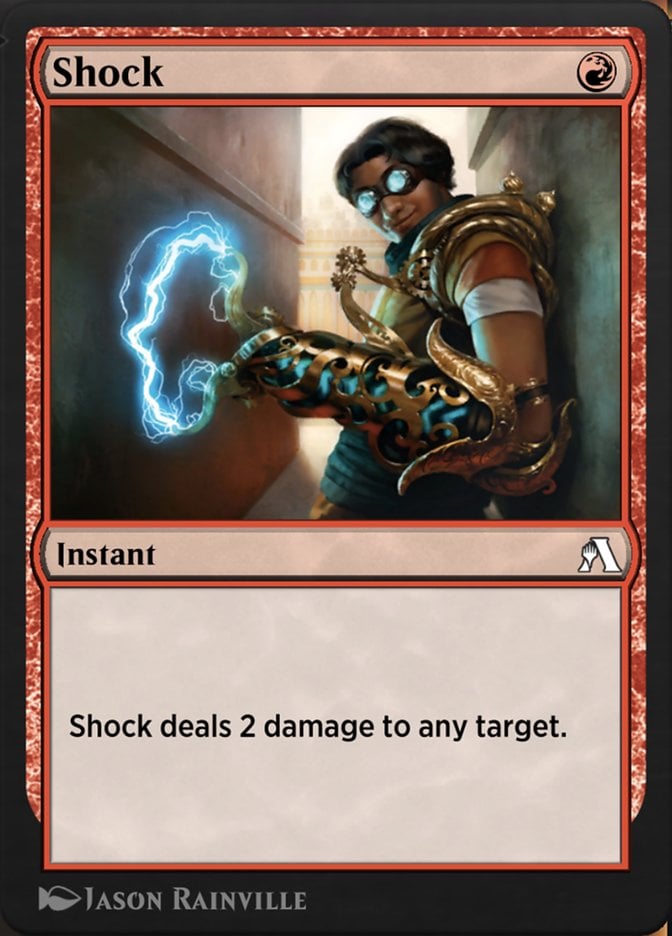
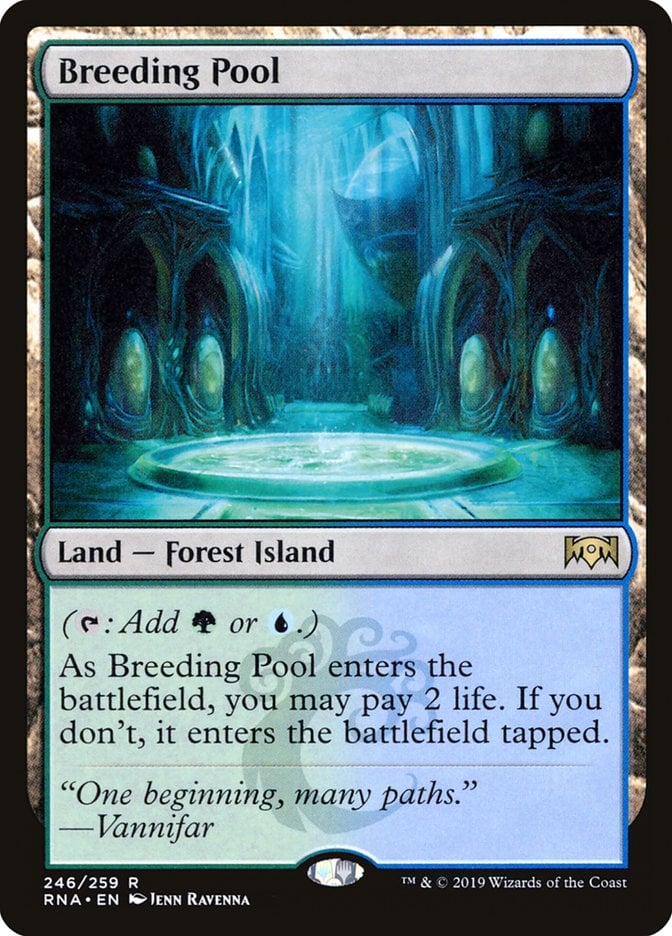
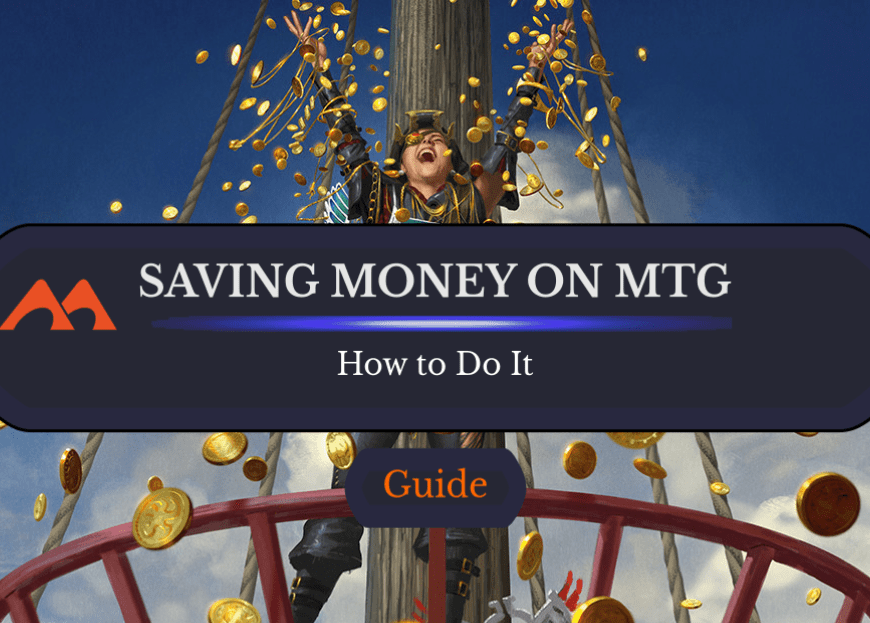
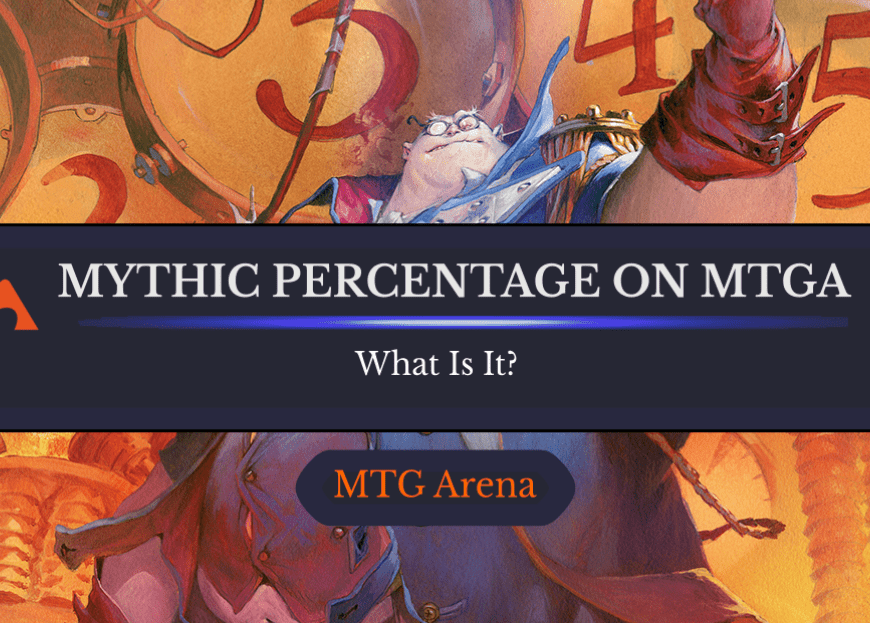
Add Comment